2022
President’s Annual Report
Creating a Culture of Caring

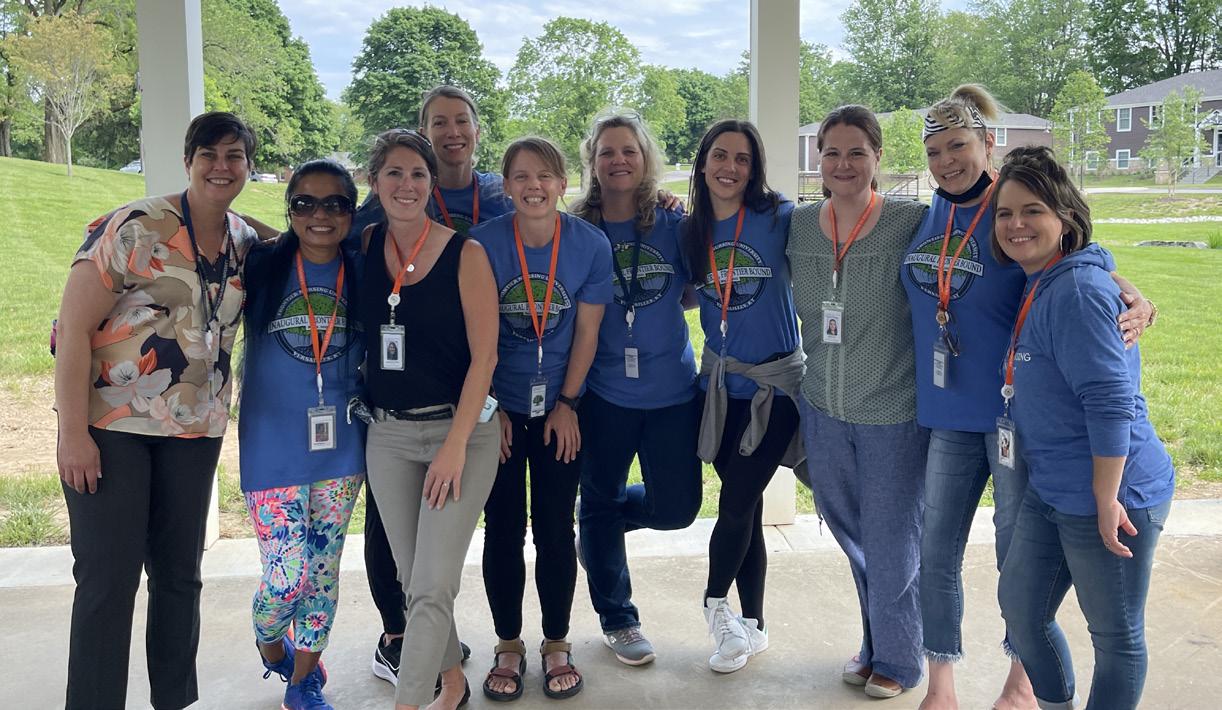


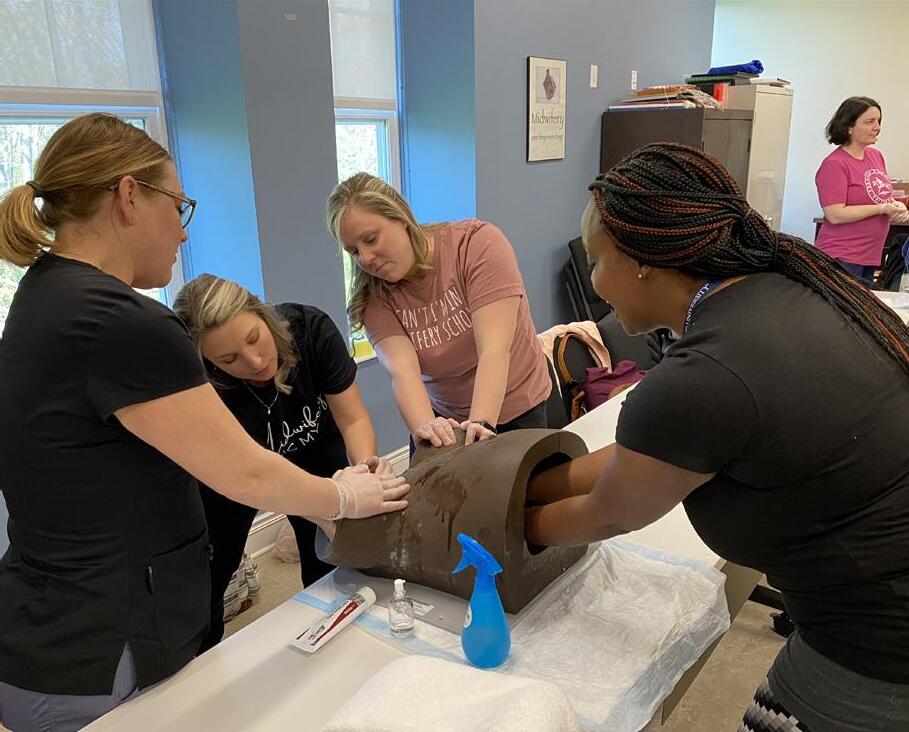
Founded in 1939, Frontier Nursing University seeks to meet the needs of prospective nursemidwives and nurse practitioners who want to remain in their home communities while studying to obtain a graduate education to fulfill their professional goals. Students start by completing web-based didactic coursework with the encouragement and support of academic advisers, classmates, a strong curriculum, and active and engaged faculty. Working with clinics, hospitals, and preceptors in their own communities, students gain the handson clinical experience required for these exciting healthcare professions. FNU’s more than 150 faculty members, who are located all over the country, are national leaders in advanced practice nursing and midwifery education. The ultimate goal is to improve healthcare outcomes through the care of a well–prepared, diverse healthcare workforce of nursemidwives and nurse practitioners especially for rural and underserved communities.
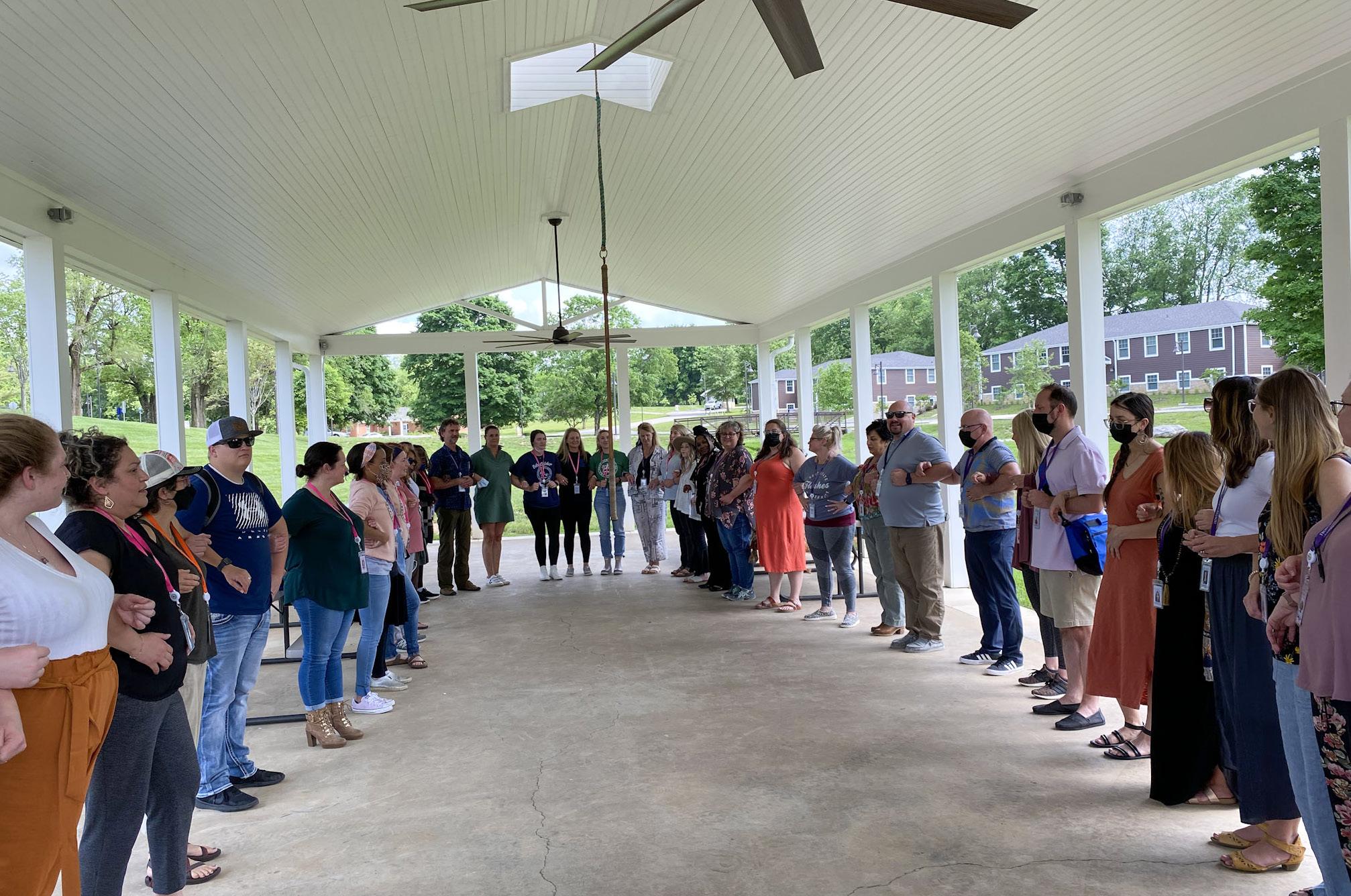
The Frontier Nursing University Vision:
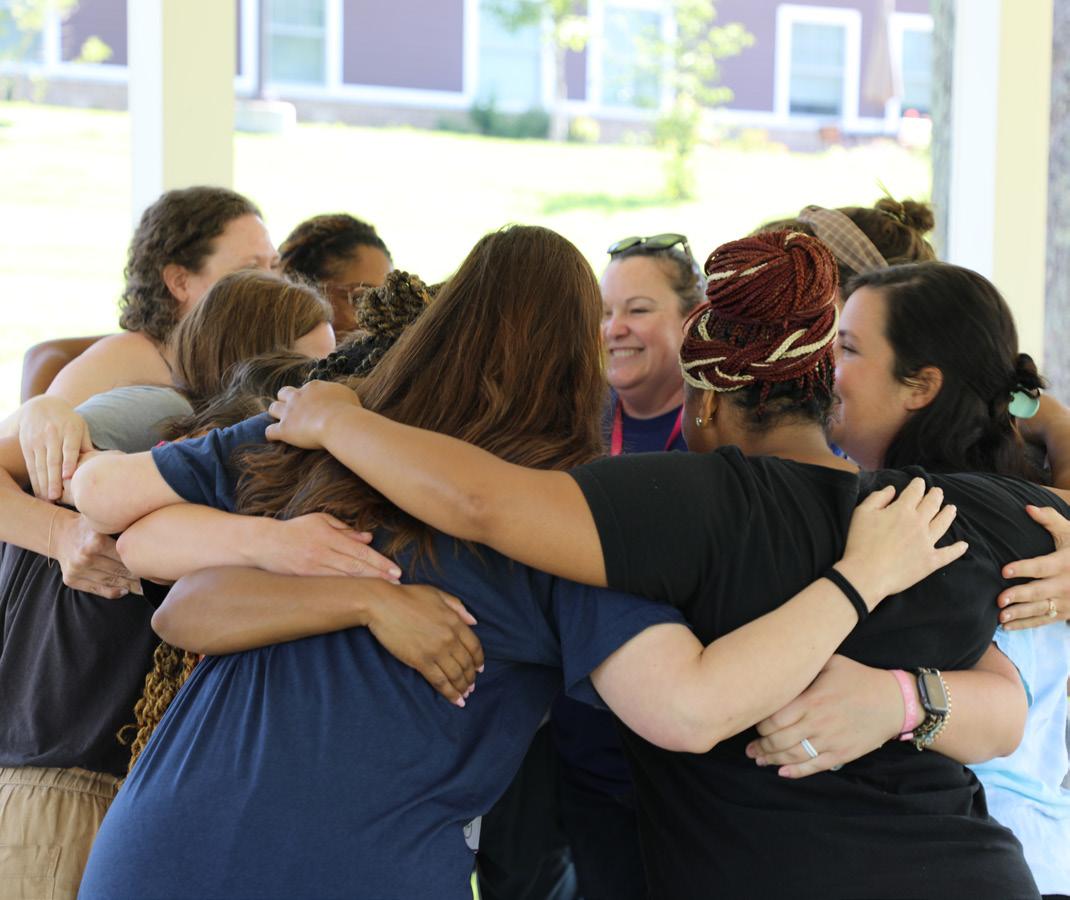
To continually improve our status as a center of excellence for midwifery and nurse practitioner education.
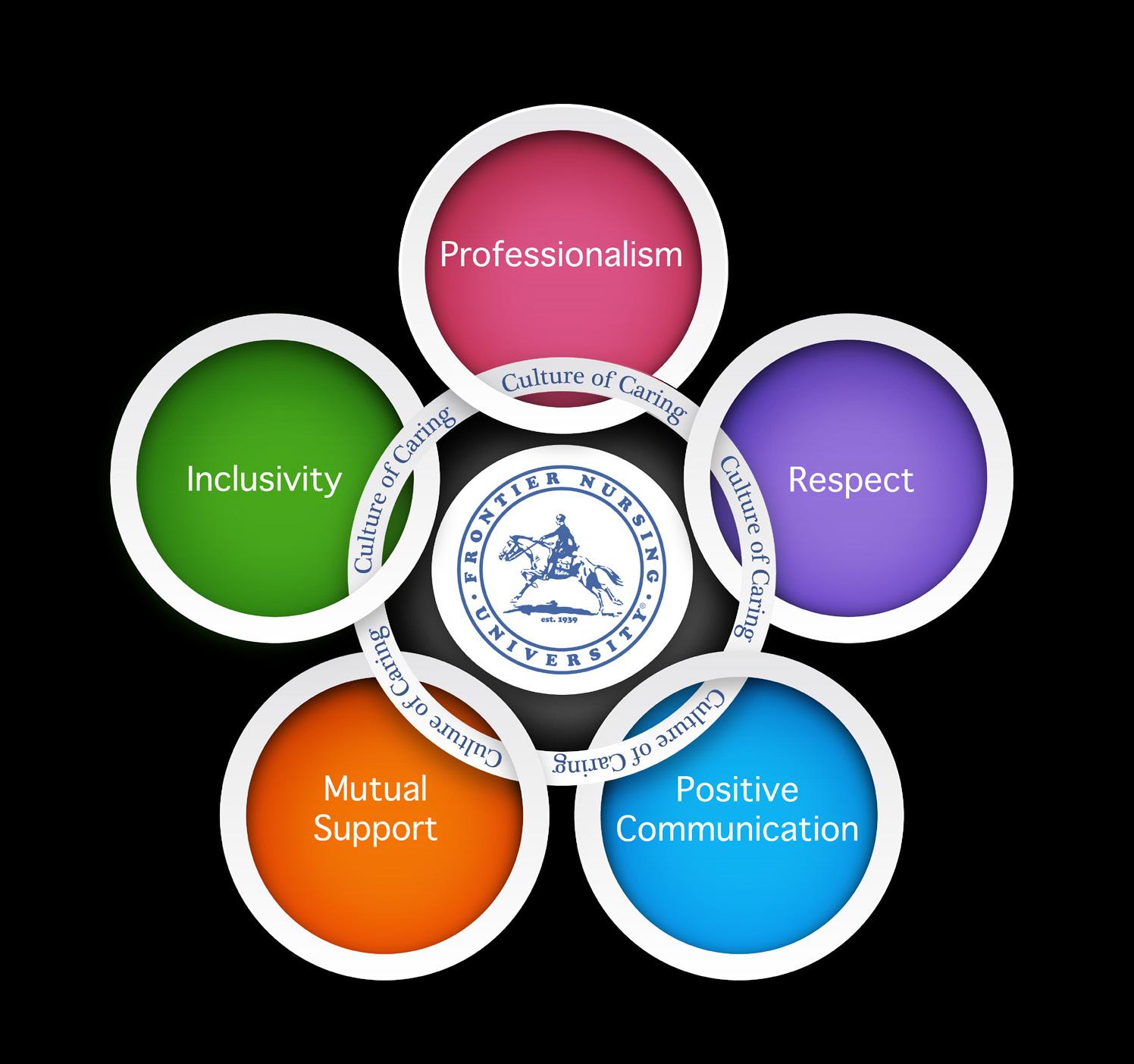
The Frontier Nursing University
Mission:
The mission of Frontier Nursing University is to provide accessible nurse-midwifery and nurse practitioner education that integrates the principles of diversity, equity, and inclusion. We transform healthcare by preparing innovative, ethical, compassionate, and entrepreneurial leaders to work with all people with an emphasis on rural and underserved communities.
The Frontier Nursing University
Culture of Caring:
• Professionalism
• Inclusivity
• Respect
• Positive Communications
• Mutual Support
FNU’s Culture of Caring initiative drives these values into our talented and diverse community of students, alumni, faculty, staff, couriers, and preceptors. We are inspired by a culture of caring among all members of our university community, and it strengthens our focus on our mission of educating nurse-midwives and nurse practitioners to deliver quality health care to underserved and rural populations.
2022 PRESIDENT’S REPORT | 1
FNU at a Glance
84 years of experience in graduate nursing and nurse-midwifery education
Students and alumni represent every U.S. state and several foreign countries
Offers the oldest and largest continually operating nurse-midwifery education program in the United States
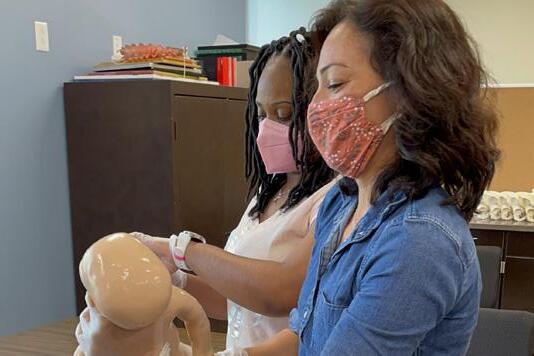
Current enrollment of more than
2,500 students
Number of new enrollees in each program in 2022: Family Nurse Practitioner
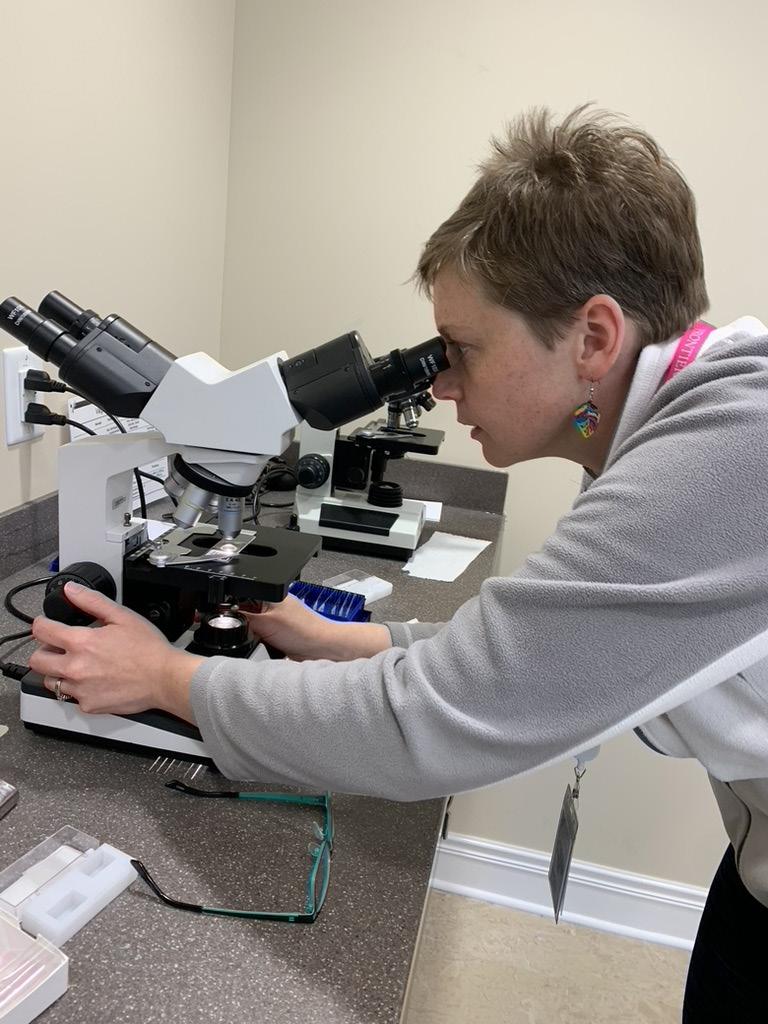

173 Nurse-Midwifery
395 Psychiatric Mental Health Nurse Practitioner
Offered the first family nurse practitioner program in the United States

Total degrees awarded in 2022:
1,040
85.74% Retention in 2022 (those who started in 2021 and completed their first full year in 2022)
321 Women’s Healthcare Nurse Practitioner
101 Doctor of Nursing Practice
202
2 | 2022 PRESIDENT’S REPORT
Five-time (20182022) winner of the Insight Into Diversity Higher Education Excellence in Diversity Award
Number of preceptor sites utilized in 2022: 2,476
49% of FNU’s students live in health professional shortage areas (HPSA) as defined by Health Resources and Services Administration (HRSA)

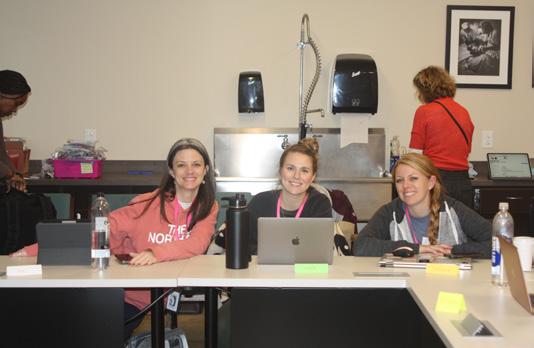
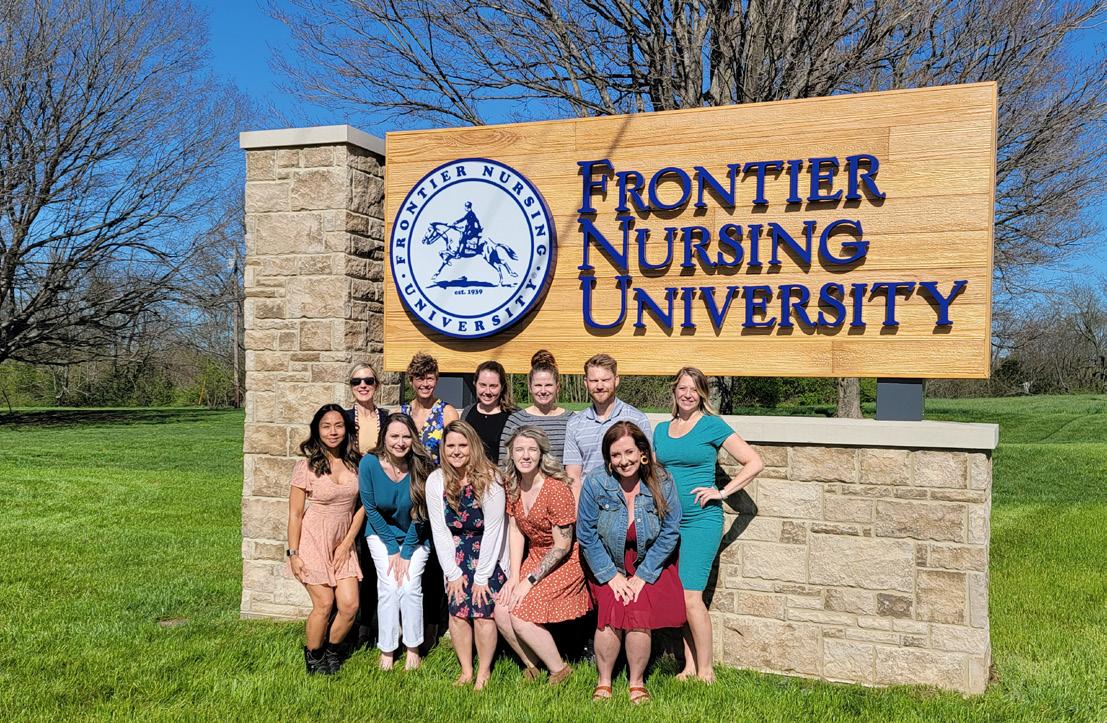
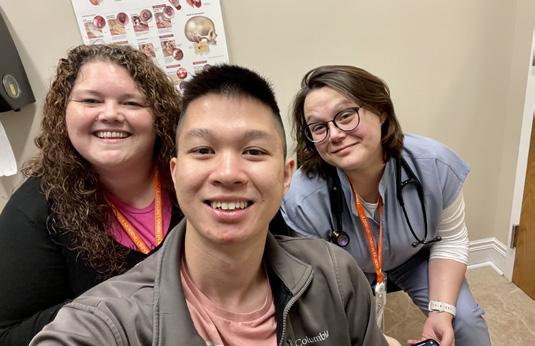
Number of students by race/ethnicity enrolled in 2022: Black or African American 346 Hispanic 116 Asian 69 Two or more races 91 Native Hawaiian or Other Pacific Islander 7 American Indian or Alaska Native 16 White 1,619 Not Disclosed 71
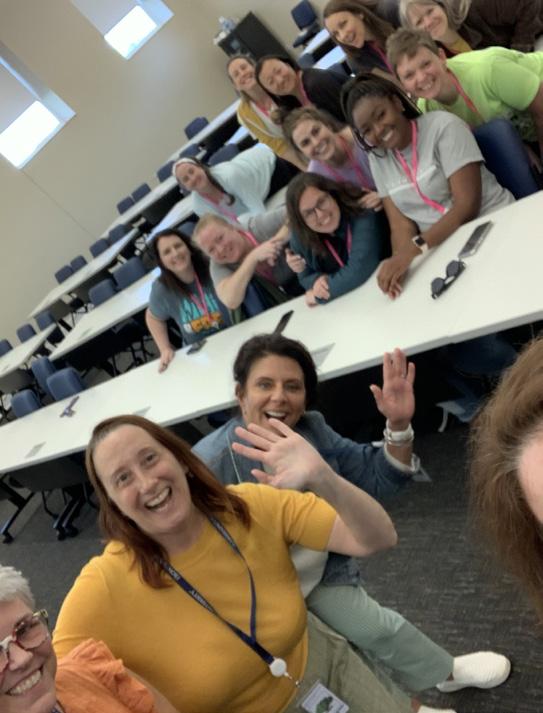
2022 PRESIDENT’S REPORT | 3 Number of graduates from each program in 2022: Family Nurse Practitioner 213 Nurse-Midwifery 327 Psychiatric Mental Health Nurse Practitioner 241 Women’s Healthcare Nurse Practitioner 45 Doctor of Nursing Practice 190 WH Completion for Midwifery Grads 23
and oldest
midwifery program in the
States
a Great College to Work For in
and
Largest
nurse-
United
Named
2021
2022

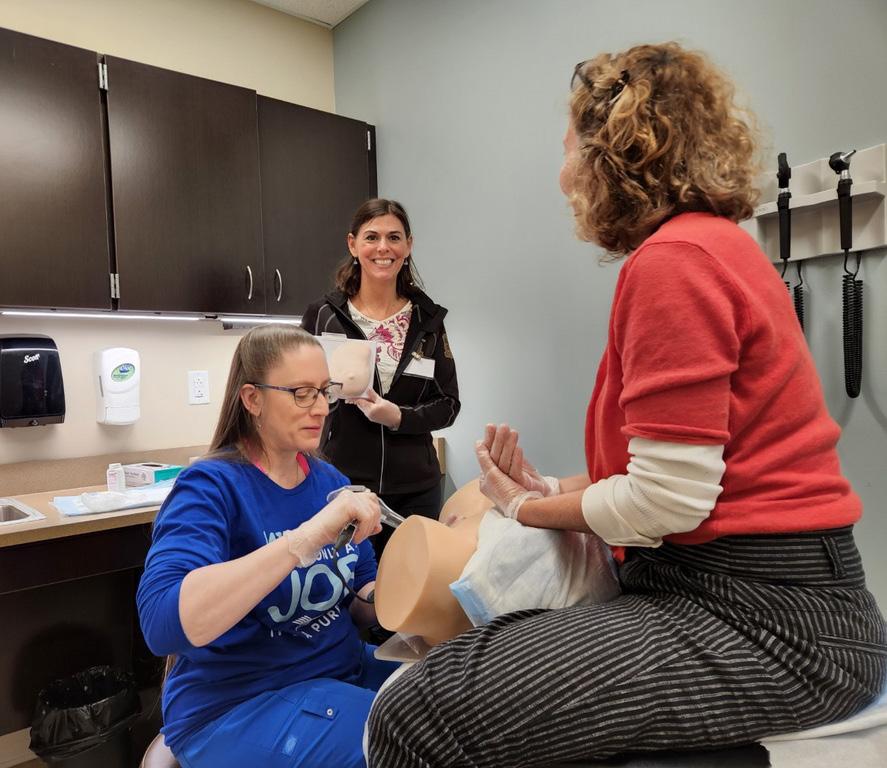
4 | 2022 PRESIDENT’S REPORT Contents FNU at a Glance 2-3 Letter from FNU President Dr. Susan Stone 5 Letter from FNU Board of Directors Chair Dr. Michael Carter 6 2022 Strategic Plan 7 2022 Strategic Plan Goal 1 Outcomes 8-13 2022 Strategic Plan Goal 2 Outcomes 14-19 2022 Strategic Plan Goal 3 Outcomes 20-23 2022 Strategic Plan Goal 4 Outcomes 24-29 2022 Strategic Plan Goal 5 Outcomes 30-32 2022 Strategic Plan Goal 6 Outcomes 33-39 2022 News, Events, and Awards 40-55 2023 Strategic Plan 56-57
Dear Friends,
Simply put, 2022 was, in many ways, the year we had been waiting for at Frontier Nursing University. While we remained vigilant, we emerged from many of the restrictions and uncertainties of the pandemic and began to fully utilize our campus in Versailles, Kentucky. It was rewarding to see the campus full of students, faculty, and staff, just as we had envisioned since purchasing the property in 2017. It is a beautiful, vibrant campus that is brought to life week after week by the energy of a new group of students.
In addition to our regular Frontier and Clinical Bounds, we hosted several other events this year. In September, we held our official ribbon-cutting ceremony. Kentucky Governor Andy Beshear spoke at the event, which included several other state and local leaders. Along with the ribboncutting ceremony that same day, we held a land acknowledgment ceremony with Native American elders Helen Danser and Venus Evans as special guests. A sign acknowledging the land as the original home of the Shawnee and Cherokee people now stands at the head of our campus’ 5K walking path.
Just a few weeks after that momentous day, we held our first in-person commencement ceremony since 2019. We were thrilled to welcome our graduates, their friends, and families for campus tours before and after the ceremony, which was held at historic Rupp Arena just 15 minutes away in downtown Lexington. Rupp Arena provides ample room for all our guests as well as concessions, plentiful
parking, and nearby lodging and dining options. Commencement is our biggest day of the year, and it is always special when we can celebrate it in person with our students and all of their supporters.
Major events understandably stand out as highlights every year, but I am equally proud of how Frontier Nursing University continues to stand out as a leader in our field. We not only navigated moving to a new campus during a pandemic, but we adapted to every challenge, barely missing a beat. It is not always easy, but our mission and commitment to our students serve as our compass, guiding our decisions and actions through times, both good and bad.
As you will see in the following pages, we have much work to do, but we have much to celebrate as well. Our work is never-ending but always fulfilling. It is my honor to share this Annual Report, and I hope you enjoy reading about 2022 at Frontier.
Thank you for your interest in Frontier and for taking the time to read this report. We are so grateful for your meaningful and impactful support of our mission and students.
Sincerely,
Susan E. Stone, DNSc, CNM, FAAN, FACNM President
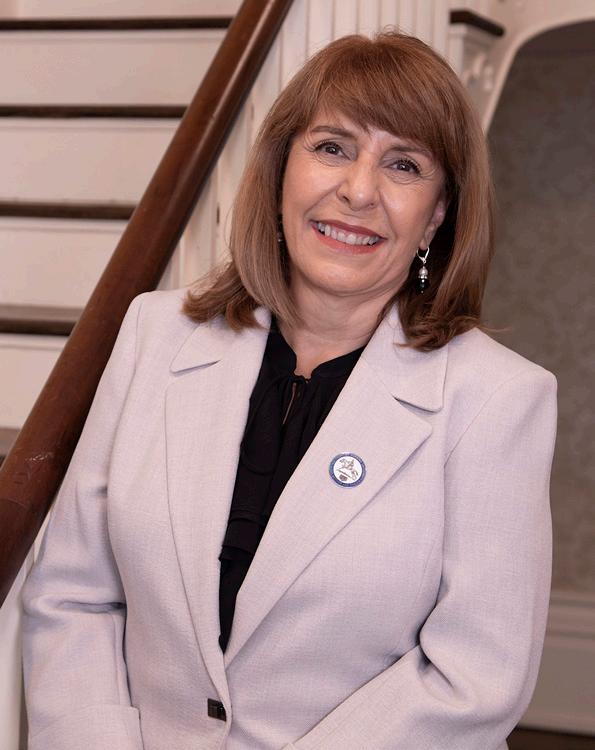
2022 PRESIDENT’S REPORT | 5
Dear Friends,
The Board of Directors of Frontier Nursing University is happy to present the 2022 President’s Annual Report. We are always proud to share this report with you because it presents an opportunity to share the many amazing accomplishments of the university, its students, faculty, and staff. We report on these items through the lens of our strategic plan, which was once again quite ambitious and true to the Frontier mission in 2022. The strategic plan is a collaborative effort involving all members of the Frontier community, including the Board of Directors, who are ultimately responsible for approving the strategic plan. Each year, I am impressed by the ambitious nature of the goals, the data-driven decision-making that went into the development of the plan, and the evidencebased recommendations toward achieving it. With high expectations and strong standards, we approach each year anxiously to see what the university accomplishes next.
In the following pages, we examine the six major goals that formed the 2022 strategic plan. We share important data but better illustrate the university’s progress toward these goals via pertinent stories about the people directly involved in them. This is an appropriate way to review the annual strategic plan because people, after all, are at the heart of our mission. Their experiences demonstrate our successes and present opportunities for further progress.
This Annual Report also provides a great opportunity for us to celebrate the many highlights of the past
year. It was a fantastic year at Frontier in so many ways, including amazing personal achievements by faculty, staff, students, alumni, and, yes, even members of the Board of Directors. The official opening of the campus fulfilled our vision and perhaps even exceeded our expectations of the community atmosphere it would create and the learning environment it would provide our students. The campus also served as a centerpiece for several events and is proving to be a centerpiece for the local community.
Thank you for allowing us to share this report with you. As you read these pages, know that we are fully engaged in the 2023 strategic plan, which we hope builds upon the successes of 2022. There is a great need for the education we provide and the students we graduate. They play essential roles in communities, large and small, all across the country. That’s why the roles all of the rest of us – including you – play in supporting these students are so important. We thank you for your continued efforts and support of Frontier Nursing University.
Sincerely,
Michael Carter, DNSc, DNP, FAAN, FNP/GNP-BC Chair, Board of Directors

6 | 2022 PRESIDENT’S REPORT
2022 Strategic Plan Goals
Goal 1
Continue to develop, evaluate, and improve programs and services that further our mission.

Goal 2
Create an environment that promotes diversity, equity, and inclusion and promotes the success of all community members.
Goal 3
Goal 4
At the end of each year, the progress toward FNU’s strategic plan goals is measured, and the outcomes are analyzed. The process of developing the strategic plan, implementing the plan, and measuring the results is integral to FNU’s strategic adherence to its mission and growth.
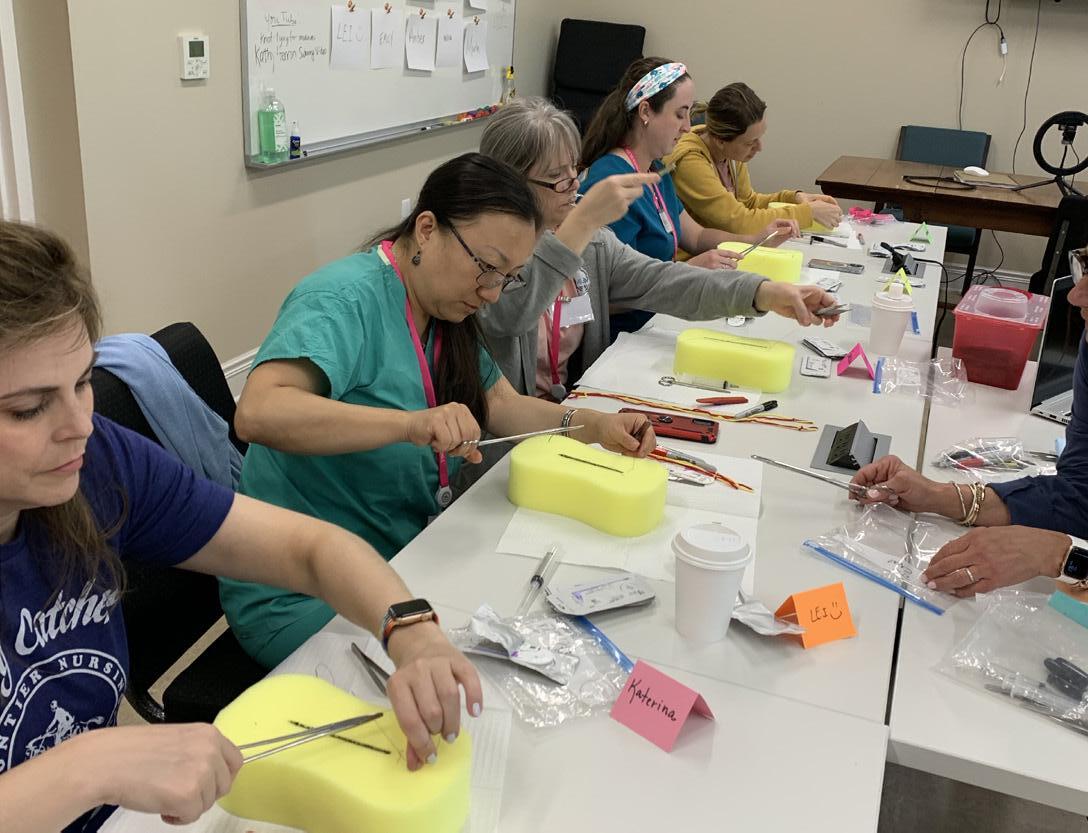
Within the following pages is a detailed look at the six goals included in the 2022 strategic plan, including the data and stories that demonstrate the results from the last calendar year.
Build strategic relationships with clinical sites and preceptors, focusing on rural areas.
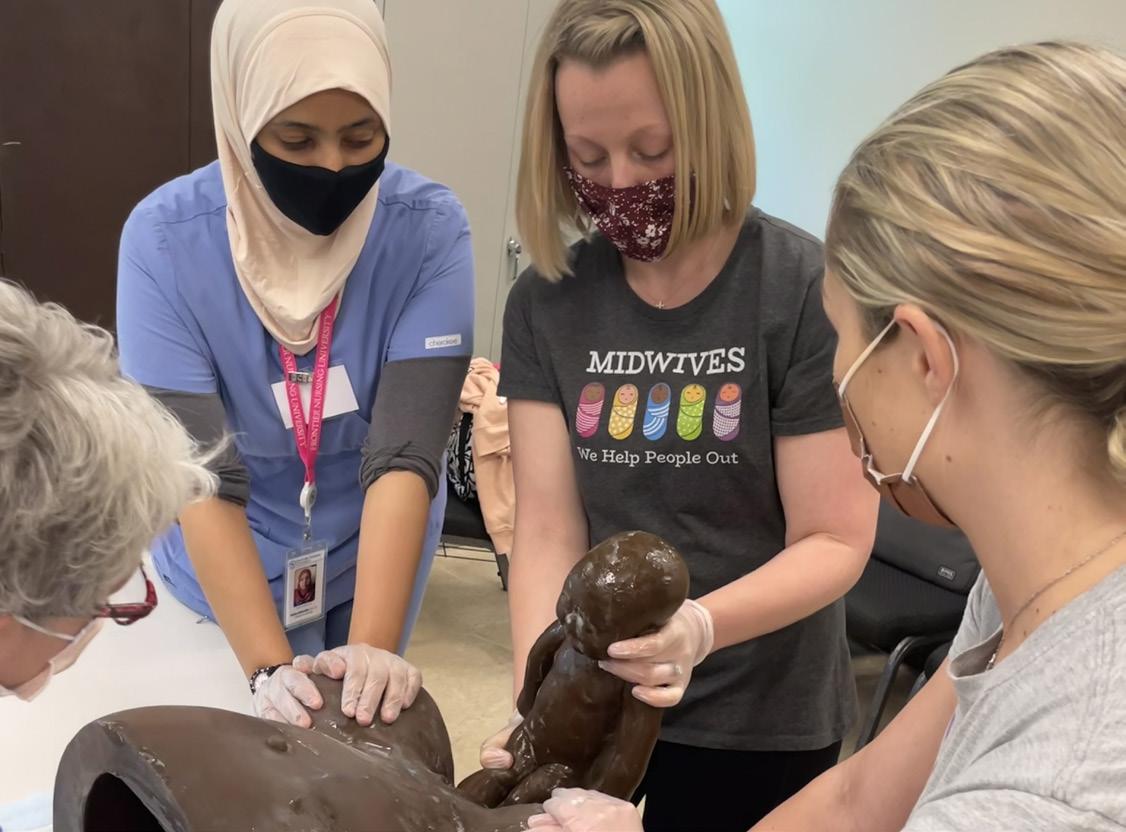
Goal 5
Use technology to ensure improvement and attainment of service excellence to the community.
Continuously improve and maintain facilities to meet the needs of students, faculty, and staff.
Goal 6
Ensure the financial strength and growth is sufficient to meet the needs of the university.
2022 PRESIDENT’S REPORT | 7
Grant Funding Helps Develop Strategic Partnerships for PsychiatricMental Health Care
In 2021, the Health Resources and Services Administration (HRSA) awarded Frontier Nursing University (FNU) the HRSA Behavioral Health Workforce Education and Training (BHWET) grant totaling $1,920,000. HRSA, which is an agency of the U.S. Department of Health and Human Services, awards the funding in annual installments over a four-year period, from July 2021 through June 30, 2025.
The BHWET grant project is led by Dr. Jess Calohan, DNP, PMHNP-BC, Chair of FNU’s Psychiatric-Mental Health Nurse Practitioner Department. The goal of the project is to increase the number of psychiatric-mental health nurse practitioners who are diverse in race, ethnicity, and other underrepresented populations serving in rural and medically underserved communities through collaboration with clinical Experiential Training Site partners. The grant project supports curriculum development related to child/adolescent care, interprofessional team-based trauma-informed care, and additional telehealth simulations. The grant also provides $10,000 stipends which are strictly used for the students’ living expenses. In the first year of the BHWET grant, 30 FNU students received grant stipends.
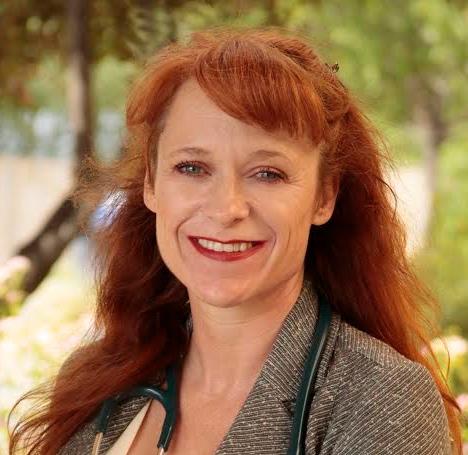
Central to the grant project has been the development of strategic relationships with clinical sites in rural and underserved communities. Matching Frontier students with these sites is proving to be a success for the students, the clinical sites, and the patients. In the first year of the BHWET grant, 30 FNU students logged clinical hours at 90 clinical sites. Of those 90 clinical sites, 50 were in medically underserved areas, and 14 were in rural areas. A recent survey of those stipend recipients resulted in 21 responses. Of those 21 respondents, 15 are now employed in HRSAdesignated Medically Underserved Communities, 11 provide treatment and services to individuals with Substance Abuse Disorder and/or Opioid Use Disorder, and nine are employed in a rural setting.
“We’re looking not only at how many students are placed in the site through the scholarship funding but also at how many partnerships are formed across the country,” said Dr. April Phillips, DNP, FNP-C, PMHNP-BC, Clinical Director of FNU’s PMHNP program. “The goal of this project really ties very closely to the mission of Frontier. You think about the roots of the Banyan tree reaching out to those rural underserved communities.”
Frontier continues to search for and identify partner sites, including exploring clinical partnerships in Oregon, Florida, Colorado, Arizona, and New Mexico. Dr. Phillips said that a priority has been placed on finding sites such as federally qualified health centers (FQHC) that target underserved areas.
“Psychiatric mental health providers are so few and far between in rural, underserved areas,” Dr. Phillips said. “Our program prepares students to feel very comfortable working with patients of all ages, and we know that pediatric and adolescent psychiatric providers are extremely rare. To be able to provide those key workers in those areas is crucial. It really provides them with a potential partner pipeline of future providers. What better way to really know if someone is really going to be a good fit within an organization than a three or four-month-long interview?”
Mountain Comprehensive Care Center
“Through this partnership, I would love to have new people come here and fall in love with the Mountains and the families that live here and make it home,” said Amanda Haney, Ph.D., who specializes in Psychology and Behavioral Health & Social Services at Mountain Comprehensive Care Center (MCCC) in Prestonsburg, Kentucky. “We need people that care and want to help us with our vision of providing quality services.”
Through the BHWET grant program, MCCC has been paired with eight Frontier students in the past year, with plans to place from six to eight more students at MCCC in
8 | 2022 PRESIDENT’S REPORT Goal 1
Dr. April Phillips, DNP, FNP-C, PMHNP-BC
2023-24. In addition to the headquarters in Prestonsburg, MCCC has now expanded to include more than 40 locations across Kentucky.
“Mountain Comprehensive Care Center has been working for more than 50 years to bring quality mental health assessment, treatment, prevention, advocacy, and other related services to Eastern Kentucky and now our entire state,” Dr. Haney said. “With additional staff and funding, we could reach many more people with our already established programs. We are starting to gain an understanding of how many we were missing by putting staff into the community by offering services at locations outside our normal practice, including local churches. This project has led to expansions in our housing, peer support, and case management offerings already.”
Haney said that, following the pandemic, there was a significant increase in clients, including children. She hopes to be able to expand services to children and is also trying to secure funding to expand MCCC’s Autism Spectrum Disorder treatment resources. MCCC currently offers outpatient and school-based services and a children’s crisis unit.
“We need more options for inpatient care and more educated professionals, including nurse practitioners, doctors, and therapists,” Haney said. “We could also benefit from having more staff trained to provide trauma therapy, Substance Abuse Disorder (SUD) treatment, and related services to combat issues brought on by the COVID-19 pandemic, the opioid epidemic, flooding, and other natural disasters.”
Working with Frontier students provides not only a shortterm answer to some of the staffing issues but also has the potential to become a pipeline to a more permanent solution. Being fully staffed won’t solve all the problems facing the people whom MCCC serves, however. Access to care is limited not only by provider shortages.
“Our Eastern Kentucky staff, in particular, face some difficulties when providing care in the mountains due to clients not always having access to transportation to come in for services,” Dr. Haney said. “Some services, such as pediatric care, are a two-hour drive or more. Some people lack reliable internet needed for telemedical services. Others lack housing stability due to increased natural disasters, such as flooding.”
Cansler Health
Located in Hopkinsville, Kentucky, in rural western Kentucky, Cansler Health provides trauma-informed, equitable care to people of all ages. Patients are treated for various disorders such as post-traumatic stress (PTSD), depression, attentiondeficit disorder (ADD), and alcohol and substance abuse disorders. A staff of seven is led by owner and Frontier alumnus JJ (Johnni Jo) Cansler, DNP, APRN, PMHNP-BC. To date, four FNU BHWET grant stipend recipients have worked there.
“Exposure to rural mental health care through our clinic is so valuable for students,” said Dr. Cansler, who also instructs students as Regional Clinical Faculty at Frontier. “We have specific antiracist, queeraffirming, anti-bias standards of care that we strictly adhere to. We truly utilize shared decision-making with our clients and encourage them to actively participate in their care which helps to address ambivalence to change. We focus not only on the reduction of symptoms but the return to full function. Most of my students comment that they have never experienced clients being as open and honest about their issues.”
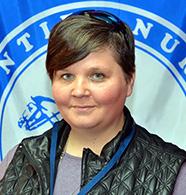
Ambivalence to change is just one of the many hurdles that hinder potential patients’ path to treatment. The lack of mental health providers in their communities leads many of Cansler Health’s patients to come to them seeking telehealth services. Some have limited access to travel, and others are simply afraid or unaware of how to get help.
“The obstacles I see most often include a poor understanding of how to access care, the stigma associated with mental health, which is complicated by perceived –and often realized –lack of anonymity in small communities, affordability, and inability to take time from work or school, or lack of transportation to attend appointments,” Dr. Cansler said. “Our clinic specifically addresses many of these obstacles by eliminating the need for referrals, offering evening and weekend hours, offering telehealth appointments using audio/video platforms or telephone for those without access, and by offering generous sliding scale
2022 PRESIDENT’S REPORT | 9
JJ (Johnni Jo) Cansler, DNP, APRN, PMHNPBC
cash rates, charity applications, payment plans, and freeclinic participation to broaden access.”
Cansler Health’s model works well, but more clinics and providers are needed in rural underserved communities nationwide.
“The mental health care needs and challenges of individuals in rural Kentucky are similar to those in other areas of our country,” Dr. Cansler said. “Lack of availability of and accessibility to high-quality mental healthcare, including medication management and psychotherapy services, is a complex and longstanding problem. Unbridled mental health disparities complicate every aspect of the delivery of healthcare. There is a critical shortage of trauma-informed and culturally competent care across the board. Most notable is a lack of racially and culturally diverse providers, dualdiagnosis providers, and LGBTQIA+ affirming providers.”
Frontier students working with sites like Cansler Health are not only learning how to utilize their clinical skills but also gaining valuable insight into the realities of healthcare shortages. It is an often eye-opening validation of the importance of their presence in their communities.
“Having students participate in clinical benefits the clients in many ways,” Dr. Cansler said. “They get to share their experiences with a big-picture perspective since the students do not know their history. It is encouraging for them to be able to see the progress they have made over time. I also explain to my clients that it is my responsibility to make sure there are well-trained providers to take care of my people after I’m gone, and I add that I appreciate their help in preparing the students. Very few clients refuse student participation when they learn that they play such an important role.”
Dr. Phillips, who also has her own practice and sometimes precepts students, pointed out that the student-preceptor relationship is mutually beneficial. “These students come out with the freshest, up-to-date information for you,” she said. “So it really helps to stimulate your practice. It makes you take a step back and do some critical thinking.”
“My practice has benefited greatly from having students, partly because four of my graduated students have joined my team,” Dr. Cansler added. “However, my favorite part about
having students is knowing that the level of care I provide improves every single day because I have to actively consider every decision to ensure that I can rationalize it to my students. This unanticipated accountability demands that my care is evidence-based and client-centered. That benefits my clients, my students, my practice, my community, and me.”
After A Successful First Five Years, the PMHNP Program Continues to Grow
Five years ago, Frontier Nursing University began offering a psychiatric-mental health nurse practitioner (PMHNP) degree/ certificate option. As has been the case throughout FNU’s history, this decision was made in response to the healthcare needs of the country. The need for more mental health providers is significant and ever-increasing.
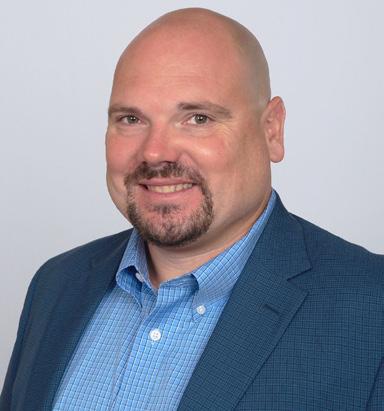
According to the Health Resources and Services Administration (HRSA), 160 million Americans live in one of the nation’s 6,063 mental health professional shortage areas. HRSA estimates that the U.S. needs an additional 8,024 mental health providers to fill these shortage gaps.* Approximately two-thirds of the shortage areas are in rural or partially rural parts of the country.
Severe mental illness, defined by the National Institute of Mental Health (NIMH), is a mental illness that interferes with a person’s life and ability to function. According to NIMH^, in 2021, 14.1 million American adults (5.5%) had SMI. Of those adults with SMI, 9.1 million (65.4%) received mental health treatment in 2021.
The COVID-19 pandemic brought to light and exacerbated mental health issues for many. A 2022 study by the World Health Organization (WHO) found that there was a significant increase in mental health** problems in the general population in the first year of the pandemic and that the risk of severe illness and death from COVID-19 was higher among people living with mental disorders.
10 | 2022 PRESIDENT’S REPORT Goal 1
Dr. Jess Calohan, DNP, PMHNP-BC, FAAN
“According to multiple national surveys and national data on the availability of mental health services, we remain a country experiencing a mental health crisis,” said Dr. Jess Calohan, DNP, PMHNP-BC, FAAN, FNU Department Chair for the Department of Psychiatric-Mental Health Nursing. “There are multiple barriers to care that prevent access to mental health services. These barriers include provider shortages, national and state regulations/policies that place limitations on the delivery of mental health care, insurance companies that place limitations on reimbursement for mental health care, lack of synchronous leadership amongst professional organizations in advocating for improving the availability and delivery of mental health care and finally, the continued limitations on Psychiatric-Mental Health Nurse Practitioner scope of practice in 23 states.”
In many states, PMHNPs are not allowed to practice independently and must be supervised by a physician. This creates an additional hurdle to access to mental health care.
“The issue is accessibility to mental health services,” Dr. Calohan said. “Very few healthcare organizations are structured in a way to ensure access to behavioral health care. Integration of behavioral health services into the primary care setting is limited, which has been shown to improve access to care and improve health outcomes. Care coordination is another major issue. When patients are referred by primary care providers for behavioral health services, they often have little support in finding care, which means many referrals go unanswered.”
The increased use of telehealth has provided greater access to care for some, but many still struggle to find accessible and culturally concordant care. These are the types of gaps that FNU’s curriculum, combined with its commitments to rural and underserved populations and diversity, equity, and inclusion, are designed to address.
“The biggest gaps in mental health care remain in rural and underserved populations,” Dr. Calohan said. “LGBTQIA+ people and people of color have significant issues accessing competent mental healthcare. There is also a lack of social support service infrastructure to assist underserved populations, which creates burdens on the existing healthcare systems and, unfortunately, justice systems in these communities.”
FNU’s PMHNP graduates represent a growing part of the solution to this national problem. As of January 2023, just five years after the launch of the PMHNP program, FNU has graduated 733 PMHNPs from 49 states. Additional data demonstrate the geographic and ethnic diversity of these graduates:
PMHNP Alumni Data (733 Graduates from 49 States)
• Graduates of Color: 190 (26%)
• Graduates Living in Rural Areas: 161 (22%)
• Graduates from Western States: 220 (30%)
• Graduates from Kentucky: 73 (10%)
“We have seen tremendous growth in the PMHNP program in the last five years, nearly quadrupling our enrollment from 2018 to 2022,” Dr. Calohan said. “In early 2019, we began revising the curriculum in response to current trends in mental health care and evaluation of our board certification pass rates. With the curriculum revision, we increased our overall board pass rates from 81% to 93%, which is currently 7% above the national average, and our students score on average about 10% points above the national average on each of the three domains on the exam. Our MSN graduates achieved a first-time pass rate of 96% in 2022, which ranks FNU in the top 3% of schools nationwide.”
The overwhelming response to the program and the success of its students, coupled with the growing national need for mental health providers, has led FNU to begin developing a program of study that will allow a post-graduate certificate student to earn a DNP while also in the PMHNP curriculum. “We are in the early stages of beginning to explore a postmaster’s DNP with a psychiatric focus for current NPs who want to earn a DNP and get additional training and clinical expertise,” Dr. Calohan said. Dr. Calohan hopes to submit the accreditation application by the end of 2023 in order to start the new offering in 2024.
Frontier’s PMHNP program is preparing its students to address urgent mental health care needs in their communities. The impact of the PMHNP program promises to grow exponentially over the next five years and beyond.
* https://data.hrsa.gov/topics/health-workforce/shortage-areas
^ https://www.nimh.nih.gov/health/statistics/mental-illness
** https://www.who.int/publications/i/item/WHO-2019-nCoV-Sci_BriefMental_health-2022.1
2022 PRESIDENT’S REPORT | 11
FNU’s DNP Program Earns Reaccreditation
Celebrating the 14-year anniversary of Frontier Nursing University’s Doctor of Nursing Practice (DNP) program in 2022 also meant it was time for the reaccreditation process through the Accreditation Commission for Education in Nursing (ACEN). At the end of September 2022 – almost exactly 14 years since FNU welcomed its first DNP students in October 2008 – the ACEN site visitors issued their recommendation for the reaccreditation of the DNP program. Included in ACEN’s recommendation was a special recognition of the strengths of the program, including the Frontier mission, faculty, and organizational capacity.
“ACEN’s thorough re-accreditation process is a great opportunity for us to measure the successes of the program while also gaining valuable expert external recommendations for areas of improvement,” FNU Dean of Nursing Dr. Joan Slager, CNM, DNP, FACNM, FAAN. “We are very proud to have earned re-accreditation with high praise from ACEN and are excited to see the continued growth and success of the DNP program at Frontier.”
The decision to add the DNP to FNU’s program offerings in 2008 came in response to the American Association of Colleges of Nursing’s endorsement of the Position Statement on the Practice Doctorate in Nursing, which called for

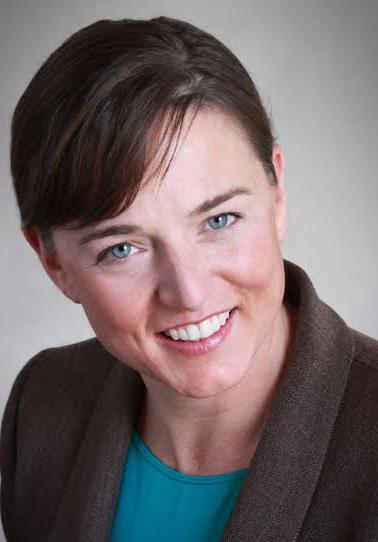
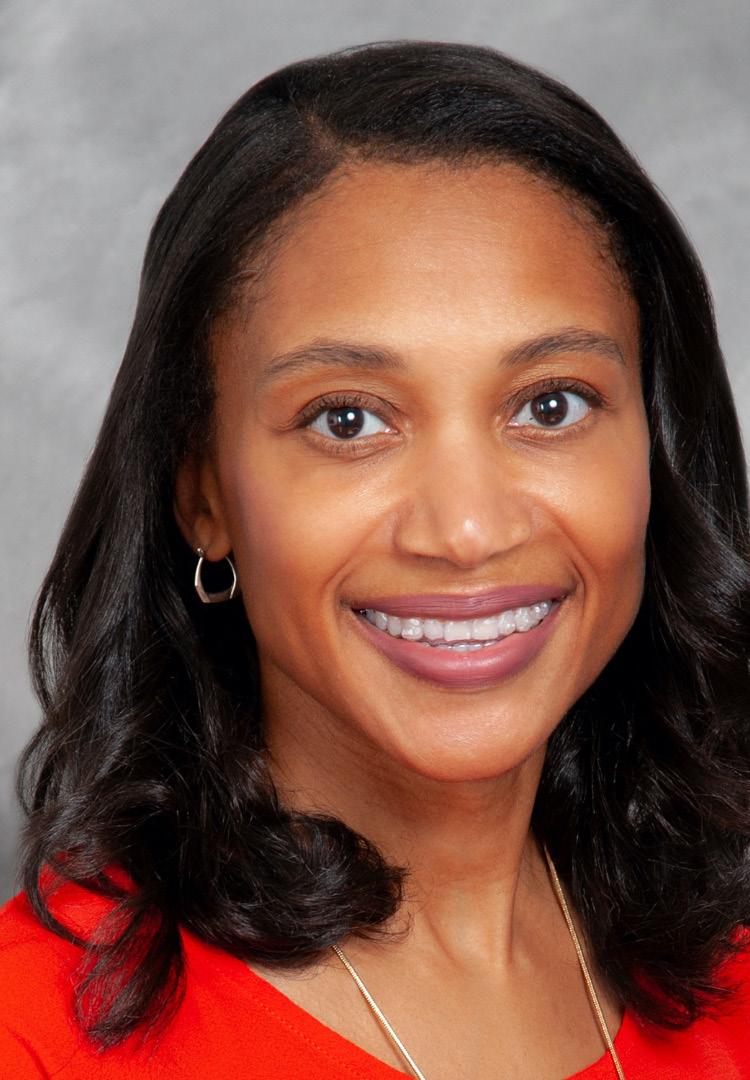
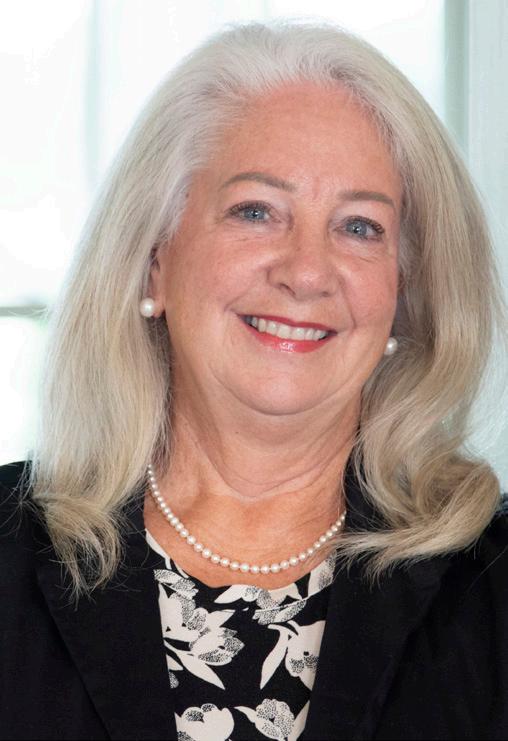
advancing the level of preparation for advanced nursing practice roles from the master’s degree to the doctorate level by 2015.
In the nearly 15 years since the first DNP class enrolled at FNU, the program has continued to grow and excel. In 2022, 190 students graduated from the DNP program, while 202 more students enrolled in the DNP. The DNP is the
highest degree for clinical nursing practice and is designed for clinicians who want to expand upon their leadership skills and clinical expertise.FNU’s DNP curriculum provides education in evidence-based practice, quality improvement, and systems leadership.
12 | 2022 PRESIDENT’S REPORT
Goal 1
“Our expectation is to teach you leadership and quality improvement skills that you can apply to any other problem you see in your environment, I think that’s what makes us really special.”
-- DNP Program Director Dr. Khara’ Jefferson, DNP, APRN, FNP-C, CHC.
Dr. Joan Slager, CNM, DNP, FACNM, FAAN
Dr. Khara’ Jefferson, DNP, APRN, FNP-C, CHC
Dr. Diana Jolles, Ph.D., CNM, FACNM
Dr. Elizabeth Akinyemi, DNP, FNP
“One of the advantages to a DNP is that it specifically sets you up to be a change agent and a leader,” said clinical faculty Dr. Diana Jolles, Ph.D., CNM, FACNM. “This degree specializes in preparing people to make a change in their community and to serve the needs of the people, which is very, very complicated. Our program is designed to help mentor, support, nurture, and really build resilience and grit so that people have the skills and the tools to make the changes that need to happen in this healthcare environment that we know is so broken.”
“Our expectation is to teach you leadership and quality improvement skills that you can apply to any other problem you see in your environment,” said DNP Program Director Dr. Khara’ Jefferson, DNP, APRN, FNP-C, CHC. “I think that’s what makes us really special.”
Dr. Jefferson’s passion for the FNU’s DNP program comes naturally, as she herself completed the program in 2017. “I enjoyed my entire experience so much that I’ve never left,” she said.
As part of the curriculum, DNP students complete an eightweek Quality Improvement Project, generally in the hospital or clinic where they are currently working. This allows the
student to tailor their project to their practice and the patient population which it serves.
“Students implement their Quality Improvement Project for the larger community that they live in, but the unique thing for our students is that probably 98% of them are actually doing their project at the place where they work,” Dr. Jefferson said. “They know the inherent problems that they see every day. By collaborating with the quality department and other key stakeholders, they are able to really narrow in on what is needed, not just something that they’re passionate about, but something that can truly drive change and impact care.”
FNU alumnus Dr. Elizabeth Akinyemi, DNP (Class 39), FNP, said that the DNP program opened her mind to a different way of thinking. Her DNP quality improvement project focused on improving hypertension in patients at the family medical clinic in which she worked.
“The way I think about healthcare has definitely been transformed, and this is a result of going through Frontier’s very objective DNP program,” Dr. Akinyemi said. “I came out of the program feeling more confident about my ability to contribute positively to any clinical quality improvement initiative. The DNP helps you become more analytical and a problem solver who tries to figure out root causes and solutions.”
Dr. Akinyemi’s analytical mindset directly aligns with FNU’s data-driven, evidence-based approach to program and curriculum development. The success of the DNP program is an important part of FNU’s mission “to provide accessible nurse-midwifery and nurse practitioner education that integrates the principles of diversity, equity, and inclusion. We transform healthcare by preparing ethical, compassionate, innovative, and entrepreneurial leaders to work with all people with an emphasis on rural and underserved communities.”
“As a DNP student, you don’t just leave Frontier Nursing University with a DNP degree,” said Dr. Jefferson “You leave it with your DNP degree, quality improvement and leadership skills, new friends, and a whole community of support.”
2022 PRESIDENT’S REPORT | 13
“The way I think about healthcare has definitely been transformed, and this is a result of going through Frontier’s very objective DNP program. I came out of the program feeling more confident about my ability to contribute positively to any clinical quality improvement initiative. The DNP helps you become more analytical and a problem solver who tries to figure out root causes and solutions.”
-- Dr. Elizabeth Akinyemi, DNP, FNP
Goal 2
FNU Launches Community-Building Student Interest Groups
In June 2022, FNU launched five Student Interest Groups (SIGs) in response to students’ expressed desire to have a formalized way to connect with other students.
“I had meetings with students, and I was hearing from them the need to have groups of likeness – affinity groups,” said FNU Chief Diversity and Inclusion Officer Dr. Paula Alexander-Delpech, Ph.D., PMHNPBC, APRN. “I attended all the first sessions of these groups, and I came away so satisfied and so proud. The students who participated were very vocal as to what it is that is needed. For instance, the LGBTQIA+ students want to advocate for curriculum change.”
While more groups may be formed in the future, the five initial SIGs are:
• International Students in Nursing
• LGBTQIA+ Students in Nursing
• Men in Nursing
• Military/Veterans in Nursing

• Students of Color in Nursing
The meetings are held monthly and are facilitated by faculty, but students drive the goals and purposes of each SIG. The meetings are held online but are not recorded, and minutes are not taken, allowing for free, open, and brave conversations.
“The students drive all initiatives,” Dr. Alexander-Delpech said. “The SIGs all have different goals they want to achieve. For instance, one of the goals of the Men in Nursing SIG is to eventually have an FNU chapter in the
American Association of Men in Nursing. The International Student in Nursing group wants to have an international trip eventually.”
Dr. Joshua Faucett, DNP, MBA, FNP-BC, CNE, and Dr. Sybilla Myers, FNP, serve as the faculty advisors for the Veterans in Nursing SIG. An average of 15-25 students attend the Veteran SIG monthly meetings.
“The Veteran SIG provides an online home for our Veteran students and an opportunity to meet and discuss issues specific to Veterans and Veteran families,” Dr. Faucett said. “They are nearing completion of establishing an FNU Chapter of the Student Veterans of America, which is the premier organization leading service, research, programs, and advocacy for Veterans in higher education.”
Jason Bennett, ADN, RN, and current psychiatric-mental health nurse practitioner (PMHNP) student, is the student president of the Veteran SIG. He served as a U.S. Army Paratrooper from 1996-2001.
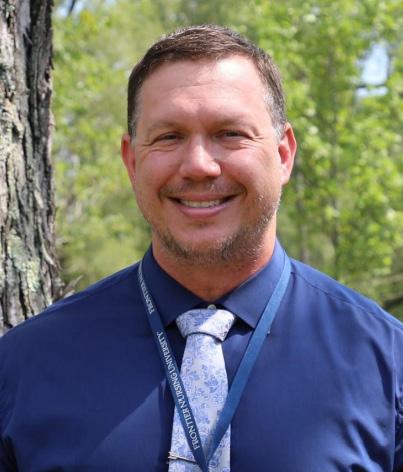
“As the Chapter President, I have the opportunity to work with our great advocates from the FNU Office of DEI and our passionately dedicated Faculty Advisors to help create an even better experience for my peers,” Bennett said. “In service to our great country, we all have unique experiences
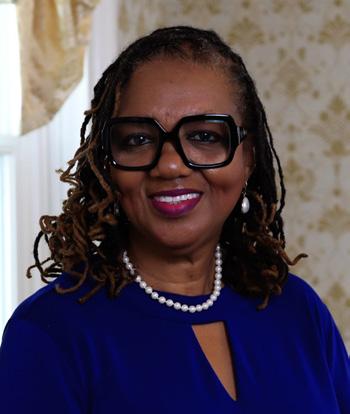

14 | 2022 PRESIDENT’S REPORT
Dorsena Gayle, DNP, CNM
Joshua Faucett, DNP, MBA, FNPBC, CNE
FNU Chief Diversity and Inclusion Officer, Dr. Paula Alexander-Delpech, Ph.D., PMHNP-BC, APRN
Sybilla Myers, FNP
that have helped shape us into the people we are today. Having a space to share with fellow Veterans who are also confronting the challenges here at FNU is special, to be sure. The bonds that come from military service and the challenges that we face when this service ends are difficult to convey; the Veteran SIG provides an opportunity for fellowship each month. In addition to Veterans and family members of Veterans – the true unsung heroes and heroines – we welcome any member of the FNU community who wants to learn more about our culture.”
Each of the SIGs mirrors this structure of inclusivity, acceptance, and a safe space to connect with fellow students with similar backgrounds and interests. It is also a space for students to share ideas to improve everyone’s experience at FNU.
“The Students of Color interest group is more than just a group; it’s who we are,” said PMHNP student Jazmene Landing, BSN-RN, who serves as one of the group’s leaders. “We are nurses of color who embrace our differences and similarities. We are individuals who share our struggles and empower each other to be better. Often students of color feel as though it is our burden to explain ourselves, our culture, or our way of life to others, and that can take a toll both physically and mentally. However, to have a safe space and a group of like-minded beautiful people that can vent and be real and honest and sometimes share the ugly truths without fear of judgment, shame, or ridicule. It is a place to have those difficult conversations and to learn and grow.”
“I love being able to get encouragement and wisdom and have a good time with other students of color,” said fellow SOC SIG student leader and nurse-midwifery student Ebonique Shanks, RN, SNM. “I love being able to have real honest conversations without fear or worry of offending someone. I love being able to reach out to our professors and ask for professional help during clinical and getting guidance on how to professionally confront someone about racism.”
Sometimes those difficult conversations reveal pressing issues that require further action outside of the group. That is part of the role of the SIG faculty advisors.

“One of the most important initiatives we have been working on is creating a process for students of color who experience racism within their clinical settings or during their didactic courses at Frontier,” said faculty advisor Dr. Dorsena Gayle, DNP, CNM. “We discuss coping methods and professional communication in the clinical setting when dealing with racism, prejudice, and bias. As one of the advisors, I am ‘on call’ for emergency debriefs and de-escalations for those students who experience those traumatic encounters.”
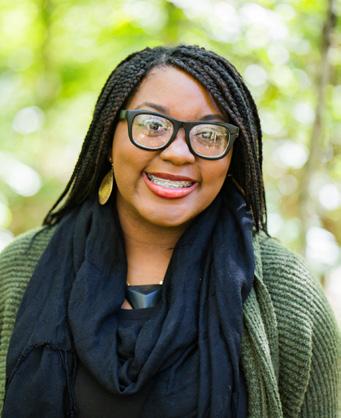

While the SIGs are still in their infancy, the impact that they are having on FNU’s students, both individually and collectively, has already been significant. The future plans are to see the growth of the current SIGs and the establishment of even more interest groups.
“My experience as a member and student leader in the Student of Color interest group has been amazing,” Landing said. “The lessons we learn and teach each other are invaluable. The mentorship from our faculty members and the diversity amongst our group is unmatched. We are not just a group of African American students, but we come from various parts of the world, and that’s what makes us so unique. Our commonality is being nurses of color, but what each individual member brings to the group is far more valuable. The life lessons, the experiences, and the conversations are what make us so unique and important to FNU.”
2022 PRESIDENT’S REPORT | 15
Jazmene Landing, BSN, RN
Jason Bennett, ADN, RN
Ebonique Shanks, RN, SNM
FNU Introduces Nurse Educator Diversity, Equity, and Inclusion Faculty Fellowship Program
In the summer of 2022, FNU announced plans to develop a Nurse Educator Diversity, Equity, and Inclusion (DEI) Fellowship program. In January 2023, ten FNU faculty members were selected as the program’s inaugural class. Through this initiative, which is fully funded by FNU, the faculty members attend a 12-week DEI training. This program rejects the traditional DEI approach and uses an individualized peer education model to facilitate faculty development of knowledge and skills to engage in anti-racism education. Upon completion of the program, each fellow will then be assigned to coach other members of the FNU faculty for 12 weeks. This was a competitive process, and
the application was open to all faculty at FNU. The 10 Nurse Educator Faculty Fellows are Drs. Tia Andrighetti, Joshua Barnes, Joanne Keefe, Heidi Loomis, Rebecca Lopez, Doreen Thomas-Payne, Audrey Perry, April Phillips, Kevin Scalf, and Erin Tenney.

“This initiative came out of the President’s DEI Task Force,” said FNU Chief Diversity and Inclusion Officer Dr. Paula Alexander-Delpech, Ph.D., PMHNP-BC, APRN. “I am so proud that the university has invested in this important development and training for our faculty, who can then lead and learn from one another.”
One of the aims of the program is to develop an innovative approach to increase health equity through faculty development strategies. As a university, FNU strives to create an anti-racist culture and environment. FNU will replicate the DEI Faculty Fellow program for a Staff DEI Ambassador Program, which will be open to all staff, including supervisors.
As part of the application process, each faculty member was required to submit a letter of support from their respective department chair. Additionally, each applicant had to develop an essay that illustrated why they wanted to become part of this DEI initiative.
16 | 2022 PRESIDENT’S REPORT
2
Goal
“It’s so important to know our ‘why.’ The ‘why’ drives our actions and governs our ambitions. Our ‘why’ reflects our personal mission,” said DEI Faculty Fellow Dr. Kevin Scalf, DNP, PMHNP-BC, CNEcl. “I want to be a better ally. I acknowledge that I have a lot to learn in this process, but I want to play an active part in creating and fostering our mission of becoming an anti-racist university. I want to help promote equity for all.”
“Everyone has different lived experiences and offers valuable perspective and insight,” Scalf said. “When we value, appreciate, and celebrate our unique experiences and perspectives, our lives are enriched. There is no limit to what we can do if we work to value, understand, and respect each other. We want to create a culture of respect and belonging here at FNU while preparing the APRN student to go forth and effectively deliver culturally appropriate healthcare.”
The fellows will also have the opportunity to plan and implement a capstone project related to the DEI initiative. This capstone project will allow them to integrate the DEI initiative into regular activity at FNU.
“My experience as a DEI Faculty Fellow has been wonderful! I have not only gained essential knowledge of DEI concepts but have also been able to more effectively evaluate my own personal biases and consider the impact of implicit bias on individuals, families, and community. I feel so privileged to belong to a group that values diversity, equity, and inclusion. I always look forward to our weekly meetings.”
In addition to meeting weekly as a group to learn more about essential DEI concepts, they also have had the opportunity to participate in weekly training sessions that increase their ability to hold brave conversations.
The group meets weekly with Dr. Alexander-Delpech. During these meetings, the faculty fellows learn about important and relevant DEI topics and concepts and host a discussion with each other. As a national and university leader, Dr. AlexanderDelpech presented “The Development of A Faculty DEI Fellows Program” at the American Association of Colleges of Nursing’s Diversity Leadership Institute in June 2022.
“Even though we sometimes engage in difficult conversations, the sense of support from my colleagues is very strong, one might even say tangible,” Scalf said. “We recognize our diversity, place value on our unique characteristics, and actively work to learn more about the lived experience of other members. This is such an important part of our mission. Having and encouraging brave conversations is a very empowering experience. In fact, that is an overarching mission of the group; to help empower individuals. Everyone benefits when a community places value on diversity, equity, and inclusion.”
2022 PRESIDENT’S REPORT | 17
“Everyone has different lived experiences and offers valuable perspective and insight,” Scalf said.
“When we value, appreciate, and celebrate our unique experiences and perspectives, our lives are enriched. There is no limit to what we can do if we work to value, understand, and respect each other. We want to create a culture of respect and belonging here at FNU while preparing the APRN student to go forth and effectively deliver culturally appropriate healthcare.”
FNU’s Professional Organizational Mentoring Program Creates Bond Between Faculty and Students
Frontier Nursing University introduced its Professional Organizational Mentoring Program (POMP) in 2018 for the purpose of creating stronger interaction and connection between students and faculty. POMP matches FNU faculty with nurse practitioner and nurse-midwifery students from underrepresented groups to provide support and mentorship. The program allows students to join a professional organization in their field, as well as gives them the opportunity to attend a professional conference with their mentors. Conference registration and professional membership fees are covered for all faculty mentors and student mentees selected.
In 2022, faculty mentors and their student mentees attended six professional conferences in person:

• American College of Nurse-Midwives conference attendees: 1 faculty and 1 student
• American Association of Nurse Practitioners conference attendees: 3 faculty and 3 students
• American Association of Birth Centers conference: 1 faculty and 2 students
• National Black Nurses Association conference: 2 faculty and 3 students
• American Psychiatric Nurses Association conference: 1 faculty and 2 students
• Gay & Lesbian Medical Association conference: 1 faculty and 1 student
“The opportunity to attend the (American Psychiatric Nurses Association) national conference with an FNU mentor was invaluable to me,” said an FNU student mentee. “During the conference, knowing that I was not attending alone provided me with a needed level of confidence to participate as a student. This was especially beneficial when it came to attending the state chapter session. Because of my mentor’s insight into the value of these meetings, I was able to connect with my state-level leadership and other student members seeking support as soon-to-be new providers. I thank the Office of DEI for selecting me for this opportunity and for
allowing me the chance to get to know my mentor and other psychiatric-mental health professionals better.”
Frontier faculty selected to serve as mentors attend a mentoring session facilitated by the Chief Diversity and Inclusion Officer Dr. Paula Alexander-Delpech, Ph.D., PMHNP-BC, APRN. After the session, faculty meet with their mentee(s) to develop goals and objectives for the mentoring relationship, arrange times to meet during the conference, review the conference program together, and arrange at least one mentor-mentee networking event. During the conference, the mentor meets with their mentee(s), and after the conference, there is at least one meeting where a summary of the activities is completed and submitted to the office of DEI.
“I had a great time connecting with my student and providing guidance with navigating the clinical setting as a student of color as well as being a sounding board to provide opportunities to uplift and empower the student,” said Dr. Dorsena Gayle, CNP, CNM, who attended the Black Nurses Association conference with her mentee. “I think the great thing about the POMP program is that it really allows the students to have unlimited one-on-one access to that particular faculty in an engaging environment.”
18 | 2022 PRESIDENT’S REPORT Goal 2
POMP mentees Claudia Ibilola Odubona (left) and Ebonique Shanks (right) with FNU faculty mentor Dr. Diana Jolles, Ph.D., CNM, FACNM
The Board of Directors Diversity, Equity, and Inclusion Committee
In January 2021, the Frontier Nursing University Board of Directors created the Diversity, Equity, and Inclusion (DEI) Committee. The DEI Committee is responsible for working with the Board of Directors and the administration in eradicating systemic racism, bias of any kind, and ensuring that Frontier strives to be an antiracist university. The Committee performs this task by overseeing the University’s policies, initiatives, and strategic goals related to DEI and guides the Board of Directors’ own DEI own work.
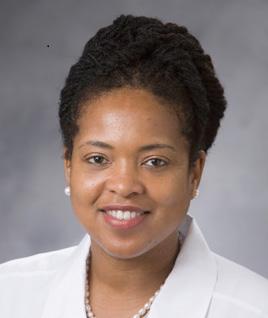
“The Board of Directors DEI Committee is committed to making Frontier Nursing University an antiracist institution and an example for others to follow,” said Committee Chair Dr. Jean Johnson. “We are proud of the work that Frontier has done and continues to do in order to emphasize diversity, equity, and inclusion among all components of the FNU community. We have made tremendous progress, but we recognize that there is more work to be done and that the Board of Directors must take an enhanced leadership role via the vital work of this committee.”


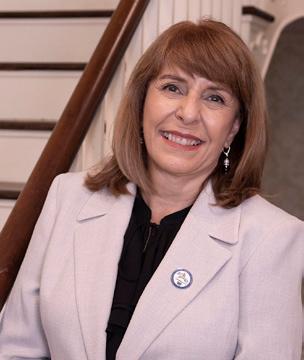
Board of Directors Diversity, Equity, and Inclusion Committee Purpose:
The charge of the Board DEI Committee is to collaborate with the Board of Trustees and University leadership so as:
• To build capacity for antiracism and DEI work at FNU to ultimately create a climate and culture of belonging free of racism and other forms of bias and discrimination.
• To propel all community members forward in achieving educational equity.
Board of Directors Diversity, Equity, and Inclusion Committee Responsibilities:
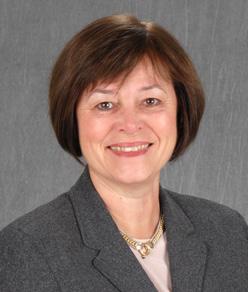
• Oversee educational initiatives that address various forms of bias, including racism.

• Prompt self-awareness, understand intersectionality, and effectively assess policy and practice decisions through the lens of DEI and antiracism.
• Collaborate with the board to continuously assess, advocate for, and support compositional diversity that reflects the diversity of the population served to the extent possible.
• Create a system of accountability using metrics deemed necessary by the committee or board to monitor the progress toward achieving the strategic University goals for DEI.
• Advocate for resources to adequately fund the goals of the current and future strategic plan to advance antiracism and DEI, including but not limited to faculty and staff positions, scholarships, and programs.
• Report to the board at least semi-annually on progress toward fulfilling the DEI strategic plan.

• Facilitate discussion of issues related to DEI on the Board and the University.
One of the first actions of this committee was to recommend the creation of a scholarship to support African American, Black, Native American, and Alaskan Native students. The scholarship, which supports 10 students per year, was approved by FNU’s Board of Directors in April 2021. To establish this scholarship, FNU designated $2.5 million to provide $100,000 in scholarships per year. This is used to deliver ten $10,000 scholarships annually.
2022 PRESIDENT’S REPORT | 19
Dr. Jean Johnson (committee chair), Ph.D., RN, FAAN
Dr. Paula AlexanderDelpech, Ph.D., PMHNP-BC, APRN
Dr. Peter Schwartz, MD
Dr. Maria Small, MD, MPH
FNU President Dr. Susan Stone, DNSc, CNM, FACNM, FAAN
Dr. Nancy Fugate Woods, Ph.D., RN, FAAN
Dr. May Wykle, Ph.D., RN, FAAN, FGSA
In Support of Students and Preceptors
Clinical Outreach and Placement Director
Stephanie Boyd
In 2019, Frontier Nursing University formed the Clinical Outreach and Placement unit to support students during the clinical portion of their program. Clinical Outreach and Placement Director Stephanie Boyd leads a team that includes three clinical advisors and a clinical services coordinator. The unit aids students by providing assistance and resources for locating clinical sites. It also provides support and customer service to preceptors, answering their questions and troubleshooting challenging situations.
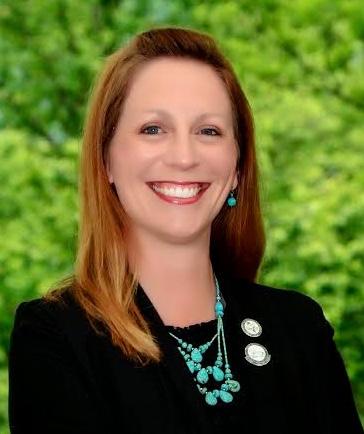
The Clinical Outreach and Placement unit encourages students to be proactive and creative in their search for clinical sites. Sharing tips and success stories, they hope to inspire students to take the initiative and get an early start on identifying a clinical site.
“Students have a dedicated team of staff and faculty who work with them every step of the way,” Boyd said. “The majority of our students will tell you that talking about the clinical site identification process earlier and more often is such a benefit to them.”
The success of early planning with students might also be part of the solution to identify and create an even larger network of preceptors. Boyd’s team, which monitors a nationwide preceptor database, is particularly focused on increasing the number of FNU alumni who share their knowledge by precepting Frontier students. The process to do so began by developing the infrastructure, which includes Clinical Services Coordinator Brittany Bachman, who provides one-on-one support to preceptors, helping them navigate the process of precepting.
FNU preceptors are surveyed annually to gain insight into their experience precepting a Frontier student. Cumulative data, along with individual narrative responses, help Boyd and her team identify areas of improvement. The survey results, which are overwhelmingly positive, also serve as an additional way to promote and encourage potential preceptors who might have reservations about the time, process, or overall experience of precepting. Every year, an issue of the FNU Quarterly Bulletin, which is mailed to over 10,000 recipients every quarter, as well as being available to read online, has a special section dedicated to precepting. This multipage section includes some of the survey data, answers to frequently asked questions about precepting, features on preceptors and their experiences, and basic information on how and why to precept.
In addition to recruiting FNU alumni to become preceptors, the university is also giving added attention to a grassroots effort to encourage students to think about giving back after they graduate. Giving back can take many forms, including gifts of money or, in the case of precepting, gifts of time and expertise.
FNU Assistant Professor for Midwifery and Women’s Health Dr. Kendra Faucett, DNP, CNM, CNE, FACNM, addressed the 2022 graduates during the commencement ceremony. She encouraged them to give back and reminded them that they are eligible to precept one year after their graduation date.
“You all know the importance of having great preceptors to help train and mentor Frontier students,” Dr. Faucett said. “Sharing your time and expertise through precepting is incredibly rewarding.”
The primary reward comes in the form of helping students learn and develop their skills, of course, but a fun secondary reward is the Featured Preceptor of the Term recognition. Each term, Boyd’s team selects a preceptor to recognize based on nominations from students and faculty.
20 | 2022 PRESIDENT’S REPORT
Goal 3
Whether assisting students or preceptors, the key element in the work of the Clinical Outreach and Placement unit is communication. Team members manage booths at national nurse practitioner and nurse-midwifery conferences where they engage and inform potential preceptors. The team also plans to start sending quarterly e-newsletters to active preceptors as a means to keep the lines of communication open and to share key information with those preceptors.
“The majority of our preceptors tell us they precept because they want to give back to their profession,” Boyd said. “The survey responses indicate preceptors feel very supported by FNU. As we increasingly share this information, I am confident that our alumni will want to pay it forward to the next generation of students by answering the call to precept as soon as they are eligible.”
Frontier Nursing University’s Department of Clinical Outreach and Placement strives to serve both students and their preceptors. All preceptors are surveyed by FNU to learn about their experience precepting a Frontier student and to learn how to create the best possible experience for all parties involved. In 2022, a total of 746 preceptors responded to this survey. This is what they had to say about their experience as preceptors for FNU students.
How satisfied were you with your experience serving as a Preceptor for an FNU student?
How well prepared did you feel the FNU student was when they began their clinical experience with you?
2022 PRESIDENT’S REPORT | 21
60 40 20 0
Satisfied:
Very
Neither Satisfied nor Dissatisfied Dissatisfied Very Dissatisfied
60 40 20 0 Exceeded Expectations Met Expectations Below Expectations
Do you feel supported by FNU if you have concerns or issues while precepting?
Did you find the process for setting up your Preceptor Profile information easy to understand?
How likely will you serve as a Preceptor for an FNU student again?
22 | 2022 PRESIDENT’S REPORT Goal 3 75 100 50 25 0 No Yes
60 80 40 20 0
Likely Not Sure Unlikely 75 100 50 25 0
No Yes
2022 Preceptor of the Term Honorees
Robin Argyle, FNP, Falls Community Hospital and Clinic in Marlin, Texas
“[Robin] is a firm yet loving guide who constantly pushes you to grow into what she knows you can be.” – Michelle Hoang, FNU student
“As a preceptor, you get to have a hand in shaping the future of healthcare,” Argyle said. “There are many voices out there trying to silence NPs. Teaching students to stand up for themselves and the profession is worth any bit of time precepting takes.”
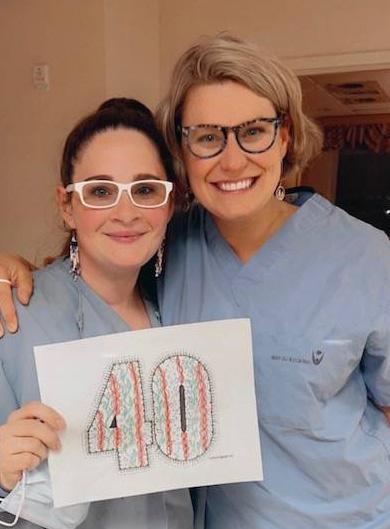 – Robin Argyle, FNP
– Robin Argyle, FNP
Shannon Conley, FNP, Big Sandy Health Care in Prestonsburg, Kentucky
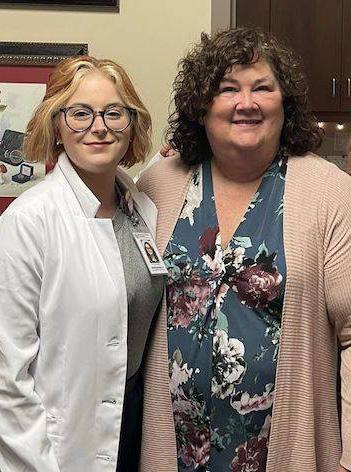
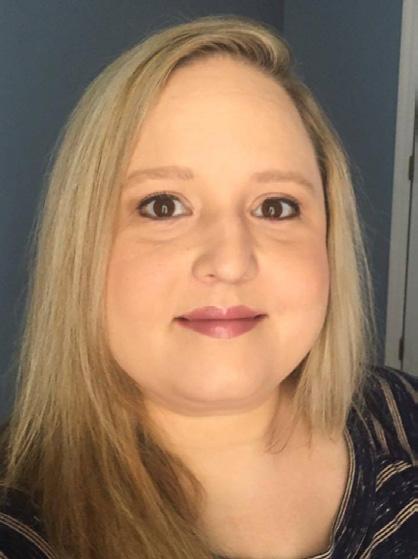
“She loves teaching and serves the community by sharing her knowledge with future providers so they may go on to serve their communities.” – FNU graduate Channa Arnett, FNP.
“I really enjoy watching students grow and gain confidence in their knowledge and skills. They begin as nervous students — unsure of where to start — then gradually grow into an independent provider. It makes me proud to know that I have taken a part in developing a competent, confident, and caring nurse practitioner.” – Shannon Conley, FNP
Megan Ferguson, CNM, Alpenglow Women’s Health in Wasilla, Alaska
“She has instilled confidence, encouraged education, and nurtured growth in me as I transition from nurse to nursemidwife.” – Megan Webb, FNU student
“We need to raise these next generations of practitioners to love and grow their practice so that we can continue to listen to women and provide the care all women deserve.”
–
Megan Ferguson, CNM
Freda Hubbard, APRN, Greenview Medical Group in Bowling Green, Kentucky
“I know that I will be a much better FNP due to her diligence and guidance throughout this learning process. I can only hope to one day be a preceptor like Freda. She is truly a blessing to future nurses and nurse practitioners alike.” – Amanda Moore, FNU student
“I wanted to give back to my profession. By working with students, I can be a part of their growth.” – Freda Hubbard, APRN
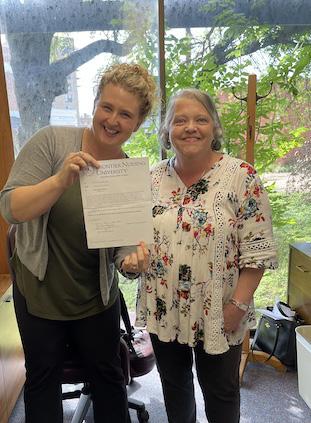 FNU student Michelle Hoang (left) with preceptor and FNU alumnus Robin Argyle, FNP
FNU student Michelle Hoang (left) with preceptor and FNU alumnus Robin Argyle, FNP
2022 PRESIDENT’S REPORT | 23
Preceptor and FNU alumnus Shannon Conley, FNP
FNU student Megan Webb (left) with preceptor and Frontier alumnus Megan Ferguson, CNM.
FNU student Amanda Moore (left) with preceptor Freda Hubbard, APRN
A Tour of the Campus of Frontier Nursing University
The official opening of Frontier Nursing University’s campus, located in Versailles, Kentucky, in 2022 marked not only the return of on-campus student activities but also the return of major campus events. The official ribbon-cutting ceremony, land acknowledgment ceremony, and commencement were all held in September. While the actual commencement ceremony was held at nearby Rupp Arena in Lexington, all three September events presented an opportunity for FNU to open its doors and introduce the beautiful campus to many first-time visitors.
During these events, guests were encouraged to tour the campus, enjoy the rural setting, and learn about the campus’ various buildings and features. Now, we invite you to take your own tour and learn a little bit more about our home in Versailles.
The Community Center and The Learning Center
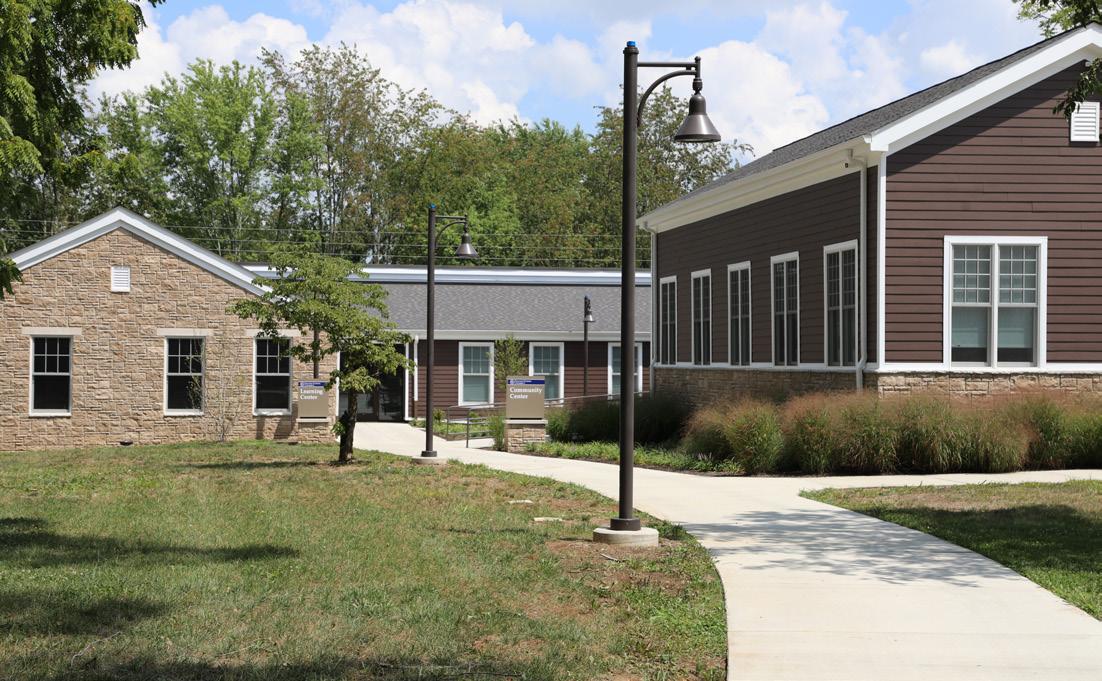
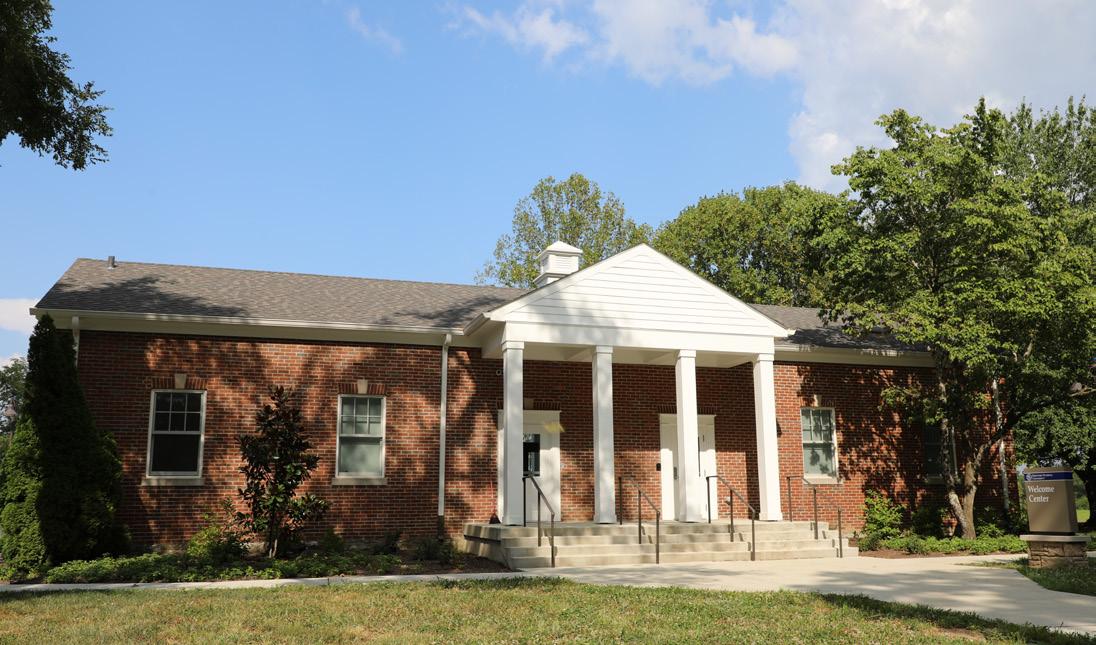
Next on the tour of campus is the Community Center. This Center contains a large auditorium for campus-wide events, accommodating up to 120 people. Smaller breakout rooms accommodate about 25 people per room. During the pandemic, this Center served as a COVID vaccination site for the community in cooperation with the Woodford County Health Department.
Welcome Center and 5K Trail
Where else to begin the tour but at the Welcome Center? This is where students check in as they arrive on campus for Frontier and Clinical Bounds. Just behind the Welcome Center is the trailhead for the 5K trail around campus. The trail features several connector trails and a scenic walk around the wooded campus. The trailhead is also the location of the Land Acknowledgment sign, which acknowledges this as the traditional territory of the Cherokee and Shawnee people.
The Learning Center is home to the university’s simulation labs. It is here that students who are ready to begin their clinical experience in community sites first spend a week on campus attending Clinical Bound where they practice their clinical skills. FNU employs standardized patients who follow a script written by faculty to create a realistic patient interaction for the student. Students also utilize mannequin-style models to practice hands-on skills, such as hand maneuvers for attending births and suturing techniques. These simulations allow students to experience patient interactions in a simulated environment and prepare them to see actual patients in real clinical settings. Simulations are conducted for students in nurse-midwifery, family nurse practitioner, women’s health nurse practitioner, and psychiatric mental health nurse practitioner students.
24 | 2022 PRESIDENT’S REPORT Goal 4
President’s House
The President’s House was built in 1854 and extensively renovated in 2021. Despite the name, the university president does not reside at the President’s House. Instead, the house offers ample indoor and exterior space to host various events, and four bedrooms to accommodate guests.

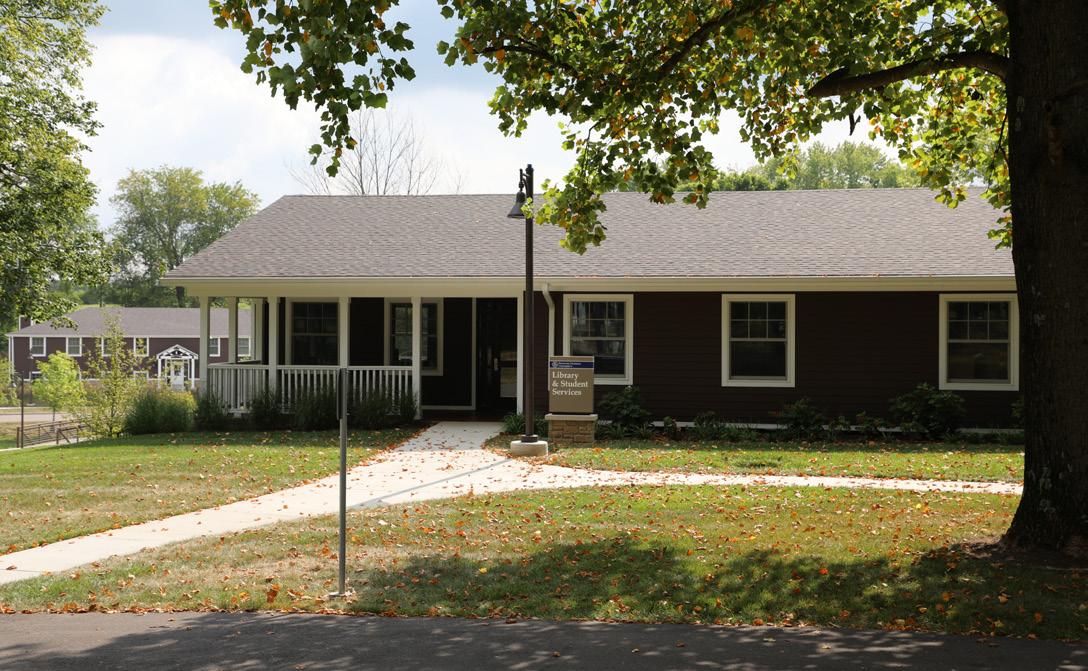
Student Services
The Student Services building houses the FNU Library, Academic Advising, and IT services.
Dining Hall and Gift Shop
While most of the campus buildings were renovated, the Dining Hall is newly constructed. Here, three meals a day are prepared by our chef and his staff when hosting oncampus student sessions and events. The dining hall offers seating for 120 people. The campus gift shop and gym is located downstairs from the dining room.
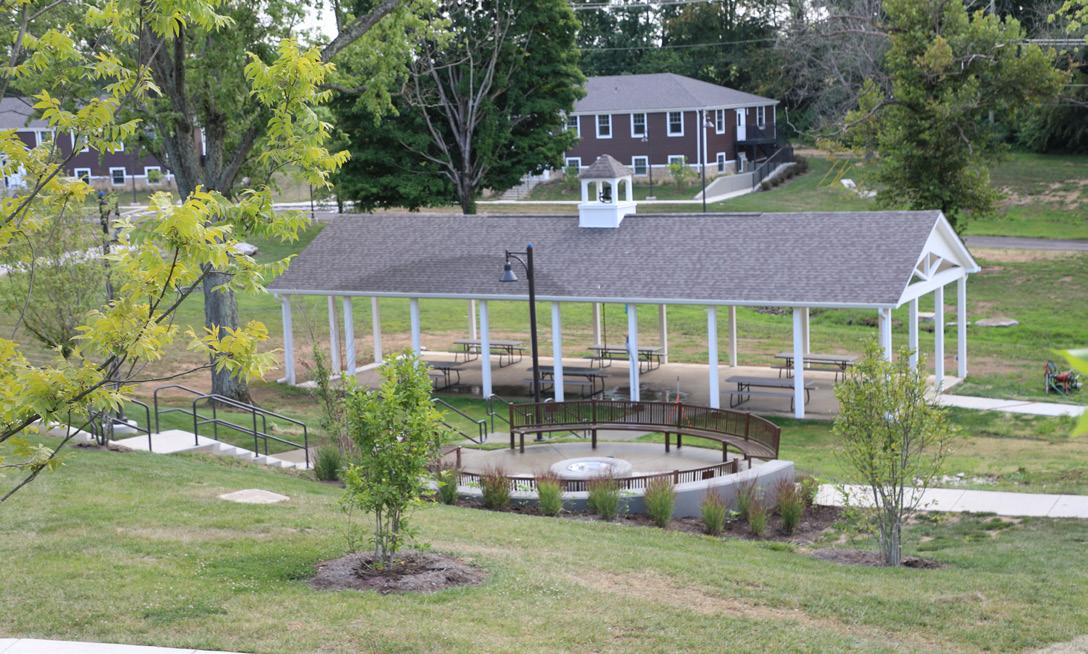

Bell Pavilion
A long-standing tradition at Frontier is the bell-ringing ceremony held at the end of each Bound week and after commencement. Before returning home from their visits to campus – Frontier Bound and Clinical Bound – students convene at the Bell Pavilion and take turns one-by-one ringing the bell to signify the beginning of a new chapter.
2022 PRESIDENT’S REPORT | 25
Student Lodges
Combined, the three student lodges have a total capacity of 100 students. Community bathrooms are located on each floor, and each lodge has a kitchenette with a microwave, a full-size refrigerator, dishes, etc. The exterior design of the lodges was “Frontierized” – which is to say that the lodges were intentionally made to look very much like the buildings on FNU’s previous campus in Hyden.
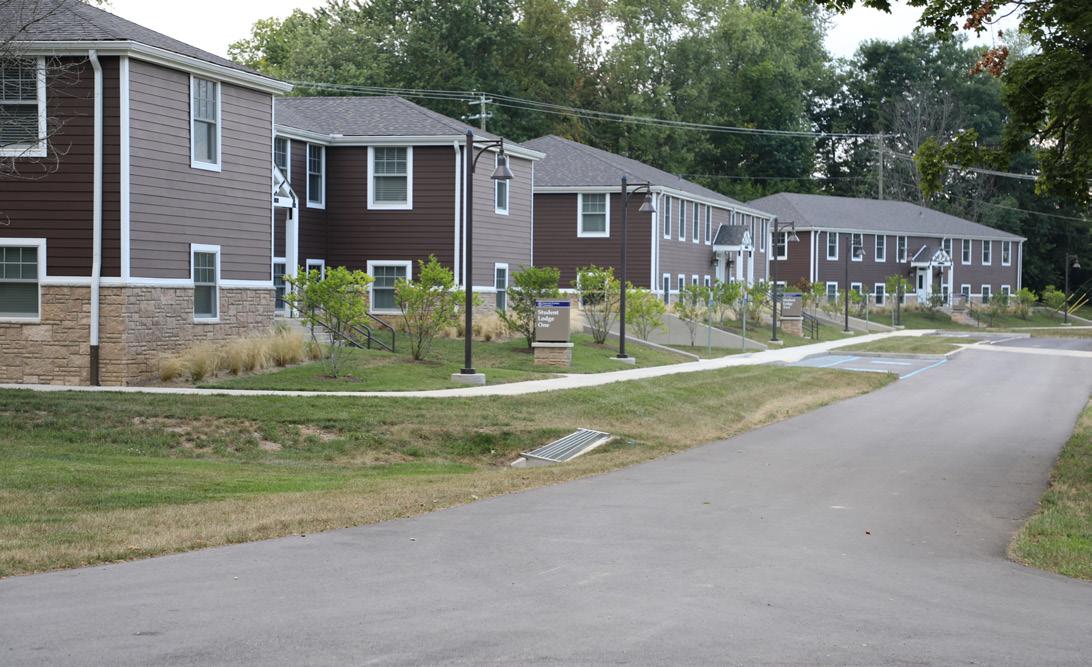
Administration Building
The Administration Building contains two conference rooms and several administrative and staff offices, including the President’s Office.
Reflection Center
The Reflection Center offers a place for anyone on campus to have quiet space to reflect, pray, meditate, or whatever form of solace they seek.

We hope you enjoyed this quick campus tour and that you can visit us soon to see it all in person!
Faculty / Staff House
The faculty and staff house serves as housing for visiting faculty and staff members. FNU has over 250 faculty and staff members located all over the country. Much like the students, faculty travel to campus for Frontier and Clinical Bounds.


26 | 2022 PRESIDENT’S REPORT
Goal 4
Students React to the Versailles Campus
FNU surveys all students who attend Frontier and Clinical Bounds to gain insight and perspective into the student experience and how it can be improved. Following are just some of the survey results from 2022.
Indicate your overall satisfaction with the Campus Facilities staff (food services, housekeeping, security, and facilities).
125 Skipped: 14
Students were also encouraged to share their comments and suggestions within the survey. While they noted some areas for improvement, overwhelmingly the comments mirrored the survey results in expressing a positive campus experience. Here are a few comments that our students shared after their first trip to campus:
“I felt like I belonged here and that I found my people here.”
“I enjoyed everything. It was so exhilarating.”
“The tour made me very excited to get started on this journey.”
“You all did an amazing job hosting us for the first time.”
“I got to really connect with others who are on the same journey I am, and it help motivate and energize me.”
“I was very impressed, and I was made to feel less stressed about my upcoming education.”
Overall how would you rate Frontier Bound experience
139 Skipped: 0
“All faculty and staff were extremely well-informed, helpful, and supportive.”
“The food was so delicious!! I was very impressed with the gluten-free options!”
“Gorgeous campus!! Love the fire pit!”
“Security was absolutely wonderful. They were so kind and helpful.”
“The faculty and staff were amazing and so friendly!”
100% 80% 60% 40% 20% 71.22% 24.46% 4.32% Answered:
Excelent Poor Very
Fair
Good
Answered:
100% 80% 60% 40% 20% Excelent Poor Very Good Fair 80% 20% 2022 PRESIDENT’S REPORT | 27
Campus Opens to Student Activities and Major Events
Frontier Nursing University (FNU) is well-known and highly regarded for its history of excellence in distance education. The university was selected as a recipient of an International Distance Learning Award, presented by the United States Distance Learning Association in 2021. This time-tested structure enables FNU students to work toward their advanced degrees while continuing to work and live in their own communities. They are able to stay home and take care of their families and patients.
In 2022, however, FNU introduced students to their home away from home – the campus in Versailles, Kentucky. The campus, which was scheduled to open
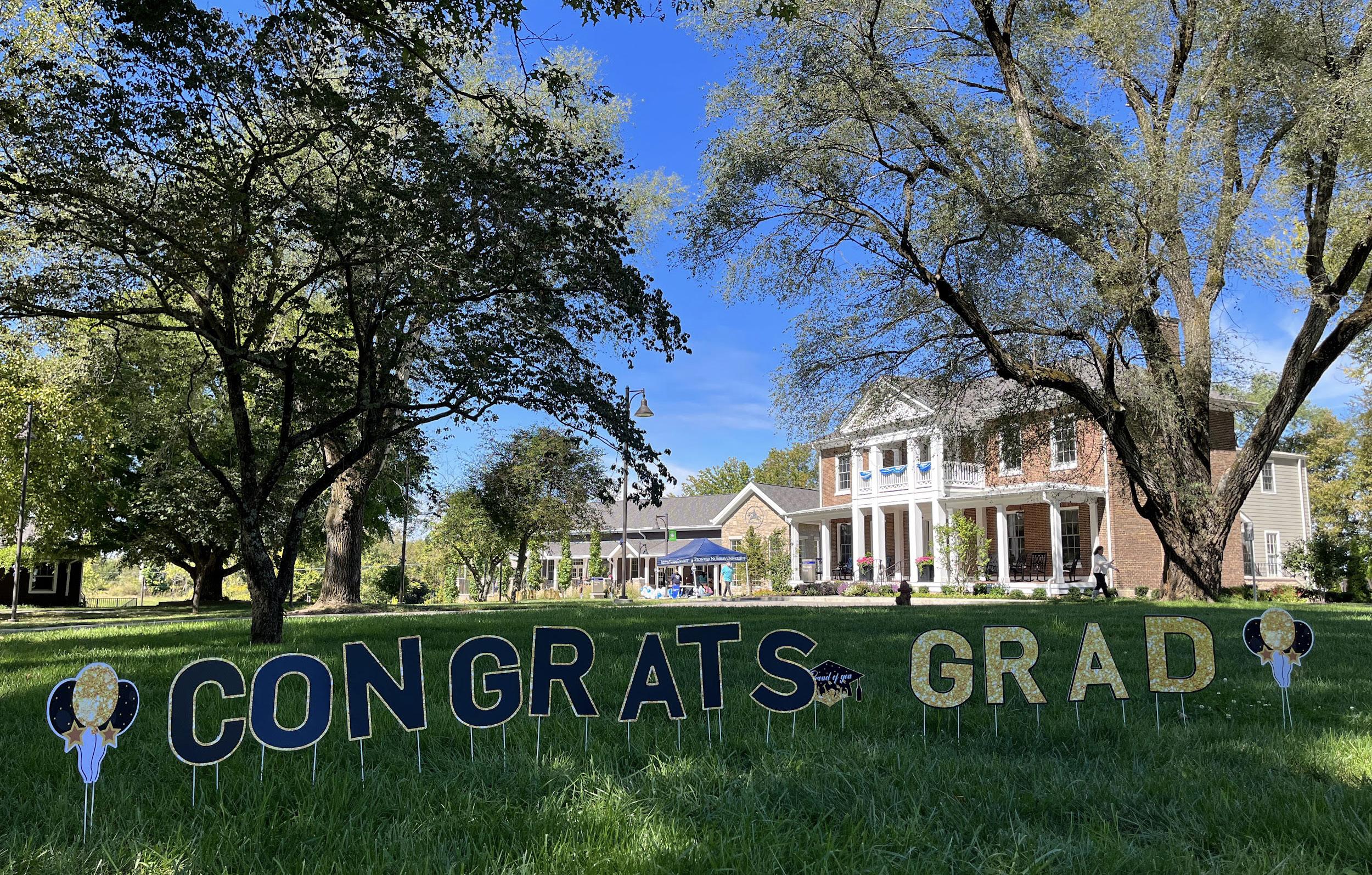
sooner but was delayed due to the pandemic, officially opened in 2022. Frontier wasted no time in putting the campus and its many features to good use. The university hosted several events throughout the year in addition to the regularly scheduled Frontier Bound and Clinical Bound sessions. Here is a look at some of the highlights of Year One on the Versailles campus:
Frontier and Clinical Bounds
All FNU students begin their educational journey on campus at Frontier Bound, an enriching four-day orientation to their educational program at Frontier Nursing University. Time is spent learning skills needed for distance education, making
28 | 2022 PRESIDENT’S REPORT
Goal 4
lifelong friends, reviewing courses, asking questions, and planning to be a successful student after returning home.
Clinical Bound is a week-long skills-intensive event that prepares students to begin clinical experiences with preceptors in their home communities. Students learn foundational skills, such as hand maneuvers for attending births, suturing techniques, and performing patient histories and physical exams that will prepare them to enter clinical sites. Students also practice conducting patient visits using clinical simulations that students perform under the observation of their instructors.
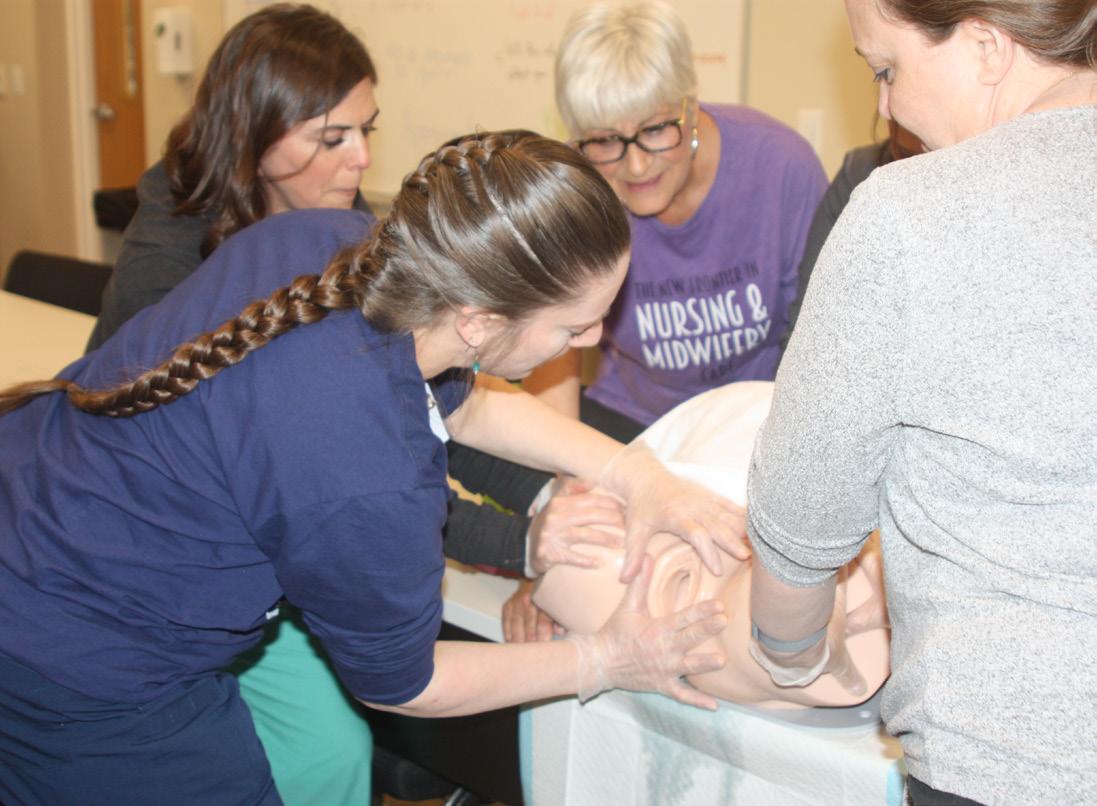
Bounds are held on campus weekly throughout each term. After attending Bound, students surveyed about their experience on campus gave the university high marks for their campus experience.
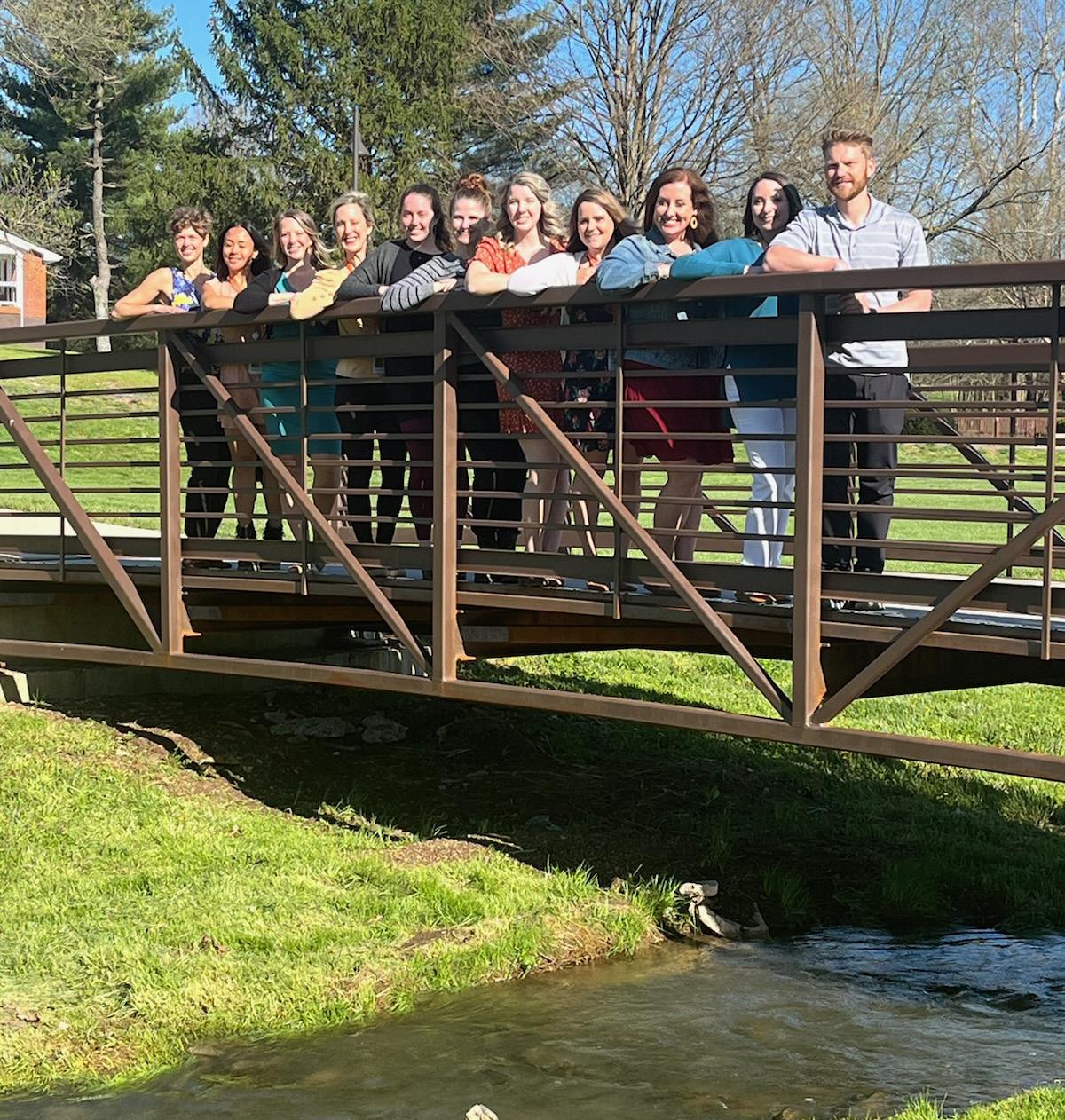
Ribbon-Cutting and Land Acknowledgment
Two of the university’s biggest events of the year were held on the same day, with the official ribbon-cutting ceremony being immediately followed by a land acknowledgment ceremony (see story on page 45).
Commencement Tours
While Commencement was held at Rupp Arena in nearby Lexington (see story on page 41), the campus was still abuzz throughout the celebratory weekend as many students and their families and friends toured the campus and visited the gift shop.
Day of Giving
In October, the university held its first annual Day of Giving. This largely online event was still a big part of the campus climate as several students attending Bound were given the opportunity to “take over” the university’s social media and provide live video and images from campus.
Fall Festival
In October, FNU hosted a fall festival for its employees and their families. The fun-filled day featured games, activities, and food for all attendees.
Health and Wellness Roundtable
FNU is a sponsor of and frequent presenter at the monthly Woodford County Chamber of Commerce Health & Wellness Round Table. The university also is an occasional host of the Round Table. Past presenters have included FNU President Dr. Susan Stone, CNM, DNSc, FAAN, FACNM; FNU Program Director for the Doctor of Nursing Practice Program Dr. Khara’ Jefferson, DNP, APRN, FNP-C, CHC; Assistant Professor Dr. Kendra Faucett, DNP, CNM, CNE, FACNM; and FNU Assistant Professor Dr. Joshua Faucett, DNP, MBA, FNP- BC, CNE.
2022 PRESIDENT’S REPORT | 29
Assuring Cyber Security in An Unsure World
Even though Frontier Nursing University has a beautiful campus that is busy with students, faculty, and staff on a daily basis, the university is well known for its excellence in distance education and maintains a significant online presence. Students are on campus for less than two weeks during their degree programs, with the bulk of their time taking place online and at their clinical sites. Faculty and staff also work from home or the office with equal efficiency.
It is of paramount importance that the university’s online systems be efficient, reliable, and secure. It is a tall task, but one that Information Technology Director Marc Blevins and his team of information technology professionals diligently manage every day.

Blevins joined Frontier in December 2022, bringing with him more than 15 years of experience in information technology and higher education administration. He holds a Bachelor of Arts in Journalism from the University of Kentucky and a Master of Science in Management Information Systems from Morehead State University. He is a Certified Information Systems Auditor and maintains professional memberships with Information Systems Audit and Control Association (ISACA) and the Association of Certified Fraud Examiners.
We asked him to answer a few questions about how the university works to ensure cyber security while maintaining a reliable, user-friendly system.
With employees working both remotely and on campus and students attending classes both virtually and on campus, what are the unique challenges that the IT department faces in providing service that is both reliable and safe?
Marc Blevins (MB): The role of every IT organization has evolved over the last decade. The 2010s saw a dramatic increase in the number of individuals and organizations who conduct business and have a significant online presence, including socially and financially. There was a parallel increase in the global number of higher-speed internet users during this same period. Most of these users do not have malicious intent, of course, but the widespread access to financial data and the rise of hard-to-trace cryptocurrencies spurred a rise in organized cyber criminal activities.
Prior to cybersecurity becoming a household word, IT personnel prized the availability and stability that come with a static, unchanging environment. However, devices that are online and available for everyone also mean that they are available to those with malicious intent. IT personnel now must balance the requirement for availability with the requirement to ensure cybersecurity and the integrity of our digital lives.
Frontier Nursing University has not been immune to the increase in cyber activity targeting our users and infrastructure. We have seen exponential increases in the number of phishing emails received while also seeing the developing sophistication of these attacks grow from obvious to elaborate. More and more, there is a social engineering component to these attempts, such as your boss emailing you with your salary or performance evaluation attached.
30 | 2022 PRESIDENT’S REPORT Goal 5
Information Technology Director Marc Blevins
IT is an ever-changing field. How do you and your staff stay up-to-date to ensure the university is current and adhering to best practices?
MB: Frontier Nursing University provides staff access to various resources that provide opportunities for our staff to learn. The IT team takes advantage of courses on LinkedIn Learning to explore new areas and broaden their exposure to different areas of IT. Another resource that we use is Microsoft Learning. Many businesses have core services that operate on the Microsoft Azure platform, and the complexity of these applications increases every year. Targeted learning opportunities like Microsoft Learning are really to deepen our subject matter expertise, while the LinkedIn Learning courses serve to open up different subject areas.
In 2023, we are planning to expand the targeted learning opportunities to ensure that our staff has the chance to really drill into their current SME areas. This helps our employees stay learning and engaged in bettering themselves while also contributing more to our Frontier community.
What are the most common online security risks for the university and its community members?
MB: The most common cybersecurity issue that affects our community is phishing email schemes. These emails are designed to be very convincing and create a sense of importance or urgency so that we take action quickly and without thinking. Oftentimes, the goal is to get you to open an attachment containing malware or, more directly, to fool you into entering your username and password.
What services, techniques, and strategies do you utilize to safeguard the university and its community members against cyber attacks?
MB: Frontier Nursing University takes cybersecurity and the digital well-belling of our community very seriously. We have invested resources into several areas that help safeguard our systems, data, and users.
We routinely conduct various levels of phishing simulations that range from obvious to sophisticated. These simulations test users and monitor any type of engagement with the phishing material. Users who engage with the simulation are rated and provided corresponding training relative to the rating. Users who engage with obvious phishing attempts are required to take more rigorous training, while the sophisticated attempts require shorter, more targeted training.
All of our users must enroll in two-factor authentication (2FA) to use their FNU account. 2FA ensures that when someone attempts to log in to a system using your username and password, there is still another verification method –generally, your phone – that is tied to you and your physical location. That means that if someone is able to obtain your FNU credentials, there is still a layer of security between them and your account, your emails, and your data.
Further, we have solutions that help us monitor user logins for high-risk activity. Sometimes, when someone is able to obtain your FNU credentials, they try to use them at different locations around the world in short order. If we detect that an account tries to log in from the United States, London, and Tokoyo all within a couple of hours, that is going to be flagged as a compromised account. We take quick and decisive action on compromised accounts while also reaching out to our affected community members to help them recover.
How do you test the university’s cyber security to ensure that the safeguards in place are working properly?
MB: In addition to the aforementioned services, we also employ a system and application vulnerability scanner that actively tests our systems and web applications for any existing or known vulnerabilities. These vulnerabilities range from routine updates to complex application issues that must be addressed with our vendors. Our good practices often lead us to be at the forefront of resolving vulnerabilities with our vendors and their other customers.
2022 PRESIDENT’S REPORT | 31
FNU Provides LinkedIn Learning to Further Staff Development
Professional development has long been a staple of employee development at Frontier Nursing University. Employees are encouraged to seek additional training and attend conferences to enhance their existing skills and develop new ones. These approved career development opportunities are paid for by the university.
In 2022, Frontier added LinkedIn Learning as another tool to help staff members continue to hone their talents and explore even broader areas of interest, such as diversity training, mental health topics, or developing leadership and public speaking skills.
“LinkedIn Learning provides a platform for continuing education and access to over 17,800 courses and learning paths, with more being added each week,” said Associate Dean of Academic Affairs Dr. Rachel Risner, Ph.D., DNP, APRN, C-FNP, CNE. “Staff have access to unlimited courses that are easy to search and navigate. The courses are also taught by expert instructors that are leaders in the industry. The courses are accessible on a computer or mobile device. There are courses to fit everyone’s needs based on their current position.”


Frontier paid for a LinkedIn Learning subscription for all staff members. Dr. Risner said she hopes to be able to extend the
subscription to faculty in 2023 as well. Less than a year into the use of LinkedIn Learning, staff members were already putting the tool to good use:
• Activated seats: 59%
• Users engaged in content: 50%
• Average number of hours per user: < 2 hours
• Number of courses viewed: 768
• Number of videos viewed: 2,454
• Full course completions: 101
Some departments are making LinkedIn Learning part of their way of work. For example, each member of the Advancement Department completes at least one course per month and reports on what they learned at the department’s monthly meeting. This also provides a good opportunity to share recommendations for or against certain courses.
“The benefits or strengths of LinkedIn Learning to staff is that it is a value-added service to our employees to promote professional development,” said FNU Human Resources Director LaToshia Daniel, MSHRML, SHRMCP. “All in all, LinkedIn Learning is a diverse and inclusive learning management system platform to promote not only professional development but also enhance individual skills.”
32 | 2022 PRESIDENT’S REPORT Goal 5
Dr. Rachel Risner, Ph.D., DNP, APRN, C-FNP, CNE
LaToshia Daniel, MSHRML, SHRM-CP
“LinkedIn Learning provides a platform for continuing education and access to over 17,800 courses and learning paths, with more being added each week.”
-- Dr. Rachel Risner
Frontier Holds First Annual Day of Giving Event
Frontier Nursing University held its first FNU Day of Giving on Wednesday, October 26. The day-long event was conducted both on campus and on social media, with events and reminders about students’ need for financial support as they pursue their advanced nurse-midwifery and nurse practitioner education.
“Our students are graduate students, meaning that most of them are already working as registered nurses while they work toward their advanced degrees,” said FNU Chief Advancement Officer Bobbi Silver. “It is a demanding pursuit in terms of both time and money. These donations provide critical support to our students and the university.”
Whether donating online or via mail, FNU donors can designate their gifts to support FNU and its students in several ways, including scholarships, clinical training supplies, diversity, equity, and inclusion (DEI) programs, and more.
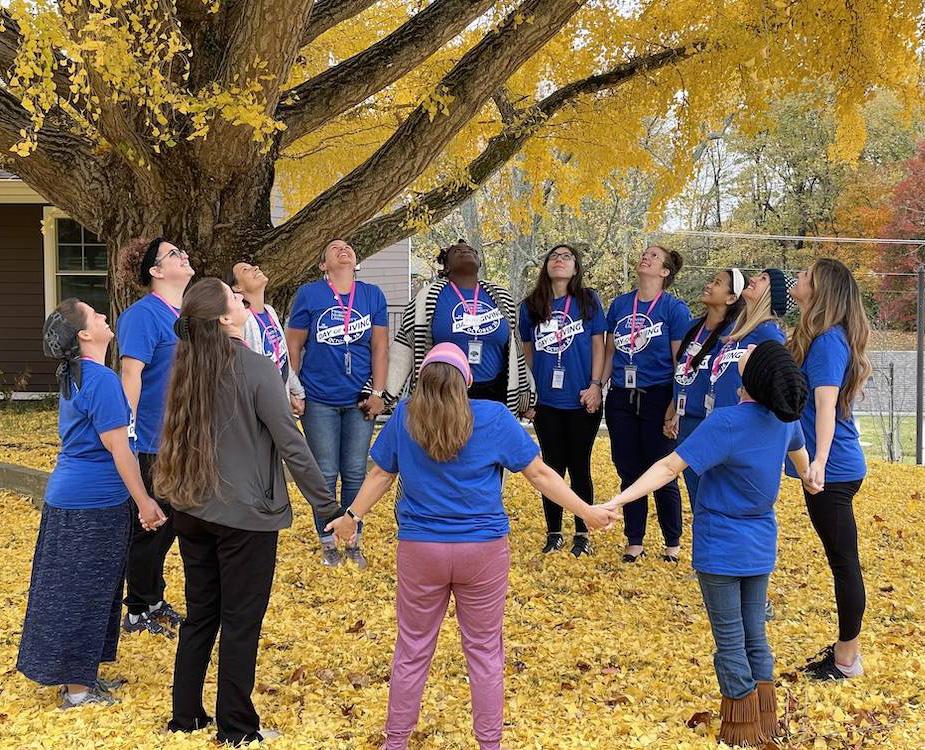
“Today, we have been learning the basics of suturing and advanced musculoskeletal assessments,” said Courtney Smith, an FNU Family Nursing student, via a video recorded as part of the student takeover of the FNU Instagram account during the Day of Giving. “Without your generous donations, scholarships would not be available to students, and many of us wouldn’t be able to continue with our education. We are so appreciative!”
Courtney and other students on campus for Clinical Bound delivered messages about the importance of giving and shared pictures and videos of their activities on campus. Clinical Bound is a week-long skills-intensive event that prepares students to begin clinical experiences with preceptors in their home communities. Students and faculty from the nurse-midwifery, family nurse practitioner (FNP), women’s health care nurse practitioner (WHCNP), and
psychiatric-mental health nurse practitioner (PMHNP) programs participate in Clinical Bounds. Students learn foundational skills, such as hand maneuvers for attending births, suturing techniques, and performing patient histories and physical exams that will prepare them to enter clinical sites. Students also practice conducting patient visits using clinical simulations performed under the observation of their instructors. These simulations allow students to experience patient interactions in a simulated environment.
“Without scholarships and donations, many of our students would not be able to finish their education,” said Chief Diversity and Inclusion Officer Dr. Paula Alexander-Delpech, Ph.D., PMHNP-BC, APRN. “Because of donors like you, the Office of DEI is able to offer scholarships,
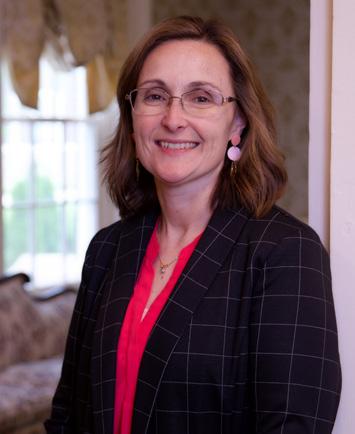
we are able to pair students with faculty mentors so they are able to attend national conferences, and we are able to offer tutoring services to our students.”
The importance of the Day of Giving is magnified by FNU’s role in addressing the nationwide shortage of nurses and
2022 PRESIDENT’S REPORT | 33 Goal 6
Students enjoyed the beautiful Fall weather during FNU’s Day of Giving.
Chief Advancement Officer Bobbi Silver
the health disparities in diverse, rural, and underserved communities. FNU educates 40 percent of the nation’s nurse-midwives, and 49 percent of FNU students come from underserved communities. By completing most of the coursework online, they are able to continue to live and work in these underserved communities while they work toward their advanced degrees.
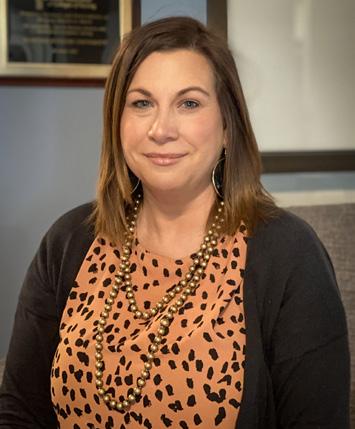
“I want to thank everyone for their generous support,” said Silver after the Day of Giving raised $21,275 from 51 donors. “The money raised during the Day of Giving impacts our students in many ways, including scholarship support, DEI programs, and overall support of our campus. These areas, and more, are critical to providing the best graduate nursing and midwifery education programs and support that Frontier Nursing University is known for. Because of you, this single Day of Giving will make a lifetime of difference.”
FNU to Re-Launch Courier Program in 2023
While Frontier Nursing’s University campus had been utilized by students, faculty, and staff in the months prior to the official grand opening in September 2022, that ceremony signaled the opportunity to fully resume and implement all campus activities. Among those, FNU’s longstanding Courier program is set to relaunch in 2023.
The Courier Program is an eight-week rural and public health summer service-learning program for college students with an interest in public health, healthcare, or a related field. The program will run from May 31 to July 28. This marks a resumption of the Courier Program, which was last held in 2019. The program has been suspended since then due to the pandemic and the university’s move to its Versailles campus in Woodford County, Kentucky. FNU’s Courier Program was launched in 1928 in Frontier’s original home in Hyden, Kentucky. Since then, more than 1,600
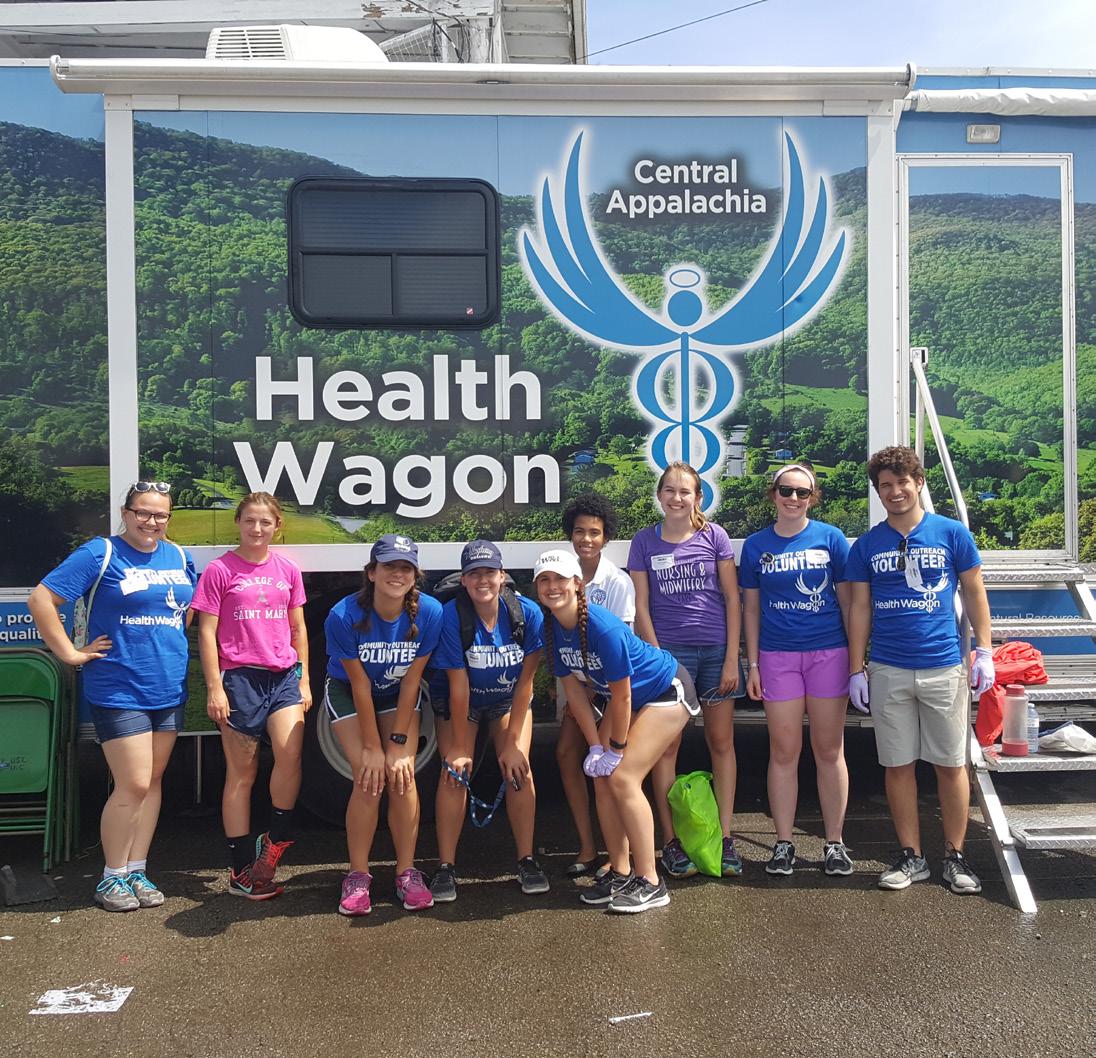
students have participated in this unique service-learning program.
“We are proud and excited to relaunch the Courier Program,” said FNU Director of Annual Giving and Courier Programs Lisa Colletti-Jones. “We look forward to working with students from across the country and hope they gain insight into the challenges facing our rural and underserved communities. The Courier Program is one of Frontier Nursing University’s finest traditions, and I’m so glad we can share it with Woodford County and the surrounding areas.”
The Couriers will live in the newly renovated Courier House located on the FNU campus. Couriers will be immersed in service learning throughout Woodford County and surrounding communities. They will begin with a two-day orientation which will introduce them to the university and to the role they will play as Couriers in the community. The students will participate in online modules guided by a faculty advisor to learn about the importance of rural and public healthcare. They will also observe at local clinic host sites where they will apply what they have learned in real-life situations in the community.
34 | 2022 PRESIDENT’S REPORT Goal 6
Director of Annual Giving and Courier Programs Lisa Colletti-Jones
The 2017 FNU Couriers volunteering with the Health Wagon.
As they gain experience, the students will proceed to participate with a host site in creating a project designed to help the underserved community in which they are working. The Couriers’ service-learning experience will include a presentation on a health assessment they have conducted through their observations in the clinical sites, and they will work with their host organization to create a service project for that site and the people it serves.
For more information about FNU’s Courier summer servicelearning program, please contact Lisa Colletti-Jones, Director of Annual Giving and Courier Programs, at lisa.collettijones@ frontier.edu or 859.251.4728.
The Role of Nurse-Midwives and Why It Matters
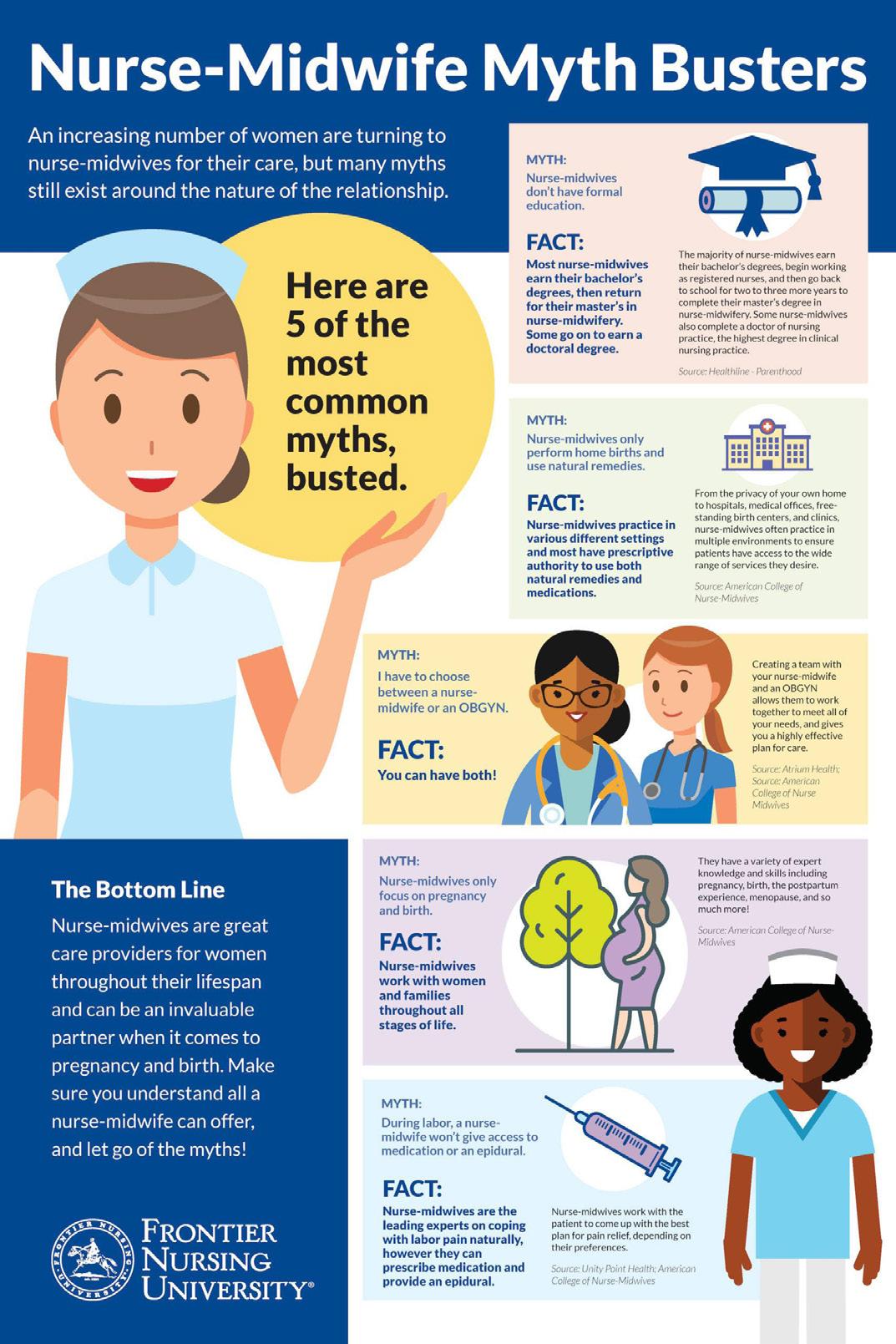
For decades, Frontier Nursing University has excelled at preparing nurse-midwifery and nurse practitioner students to become ethical, compassionate, innovative, and entrepreneurial leaders. FNU has long understood the vital roles that nurse-midwives and nurse practitioners play in the nation’s healthcare system. To the general public, however, the different terms and titles can be confusing, yet understanding them grows more important as the U.S. combats significant healthcare shortages and crises across the country.
Even before the start of the COVID-19 Pandemic, it was well-known that the U.S. was facing a healthcare provider shortage. This trend was verified in a June 2021 report by the Association of American Medical Colleges*, which estimated the U.S. faces a shortage of primary care physicians of between 17,800 and 48,000 and a shortage across the nonprimary care specialties of between 21,000 and 77,100 physicians.
Perhaps even more disconcerting is the maternal mortality crisis. A maternal death is defined by the World Health Organization as “the death of a woman while pregnant or within 42 days of termination of pregnancy, irrespective of the duration and the site of the pregnancy, from any cause related to or aggravated by the pregnancy or its management, but
not from accidental or incidental causes.” According to the Centers for Disease Control (CDC), in 2021, the maternal mortality rate in the United States was 32.9 deaths per 100,000 live births, a dramatic increase from rates of 23.8 in 2020 and 20.1 in 2019^. The rate for non-Hispanic Black women is even more alarming, at 69.9 deaths per 100,000 births in 2021.
Answers to systemic problems are complex and involve multiple components, but data suggests that nurse-midwives could help dramatically to improve the nation’s maternal mortality crisis. The Lancet Series on Midwifery** found that midwives are linked to higher rates of physiologic birth and fewer adverse neonatal outcomes. The report noted that approximately 10 percent of U.S. births are attended by
2022 PRESIDENT’S REPORT | 35
nurse-midwives, compared to 50-75 percent in other highresource countries.
In addition to educating and preparing more nurse-midwives, part of the solution is also an increased awareness of exactly what nurse-midwives do. Taking note of the many myths about nurse-midwives, FNU has made it a strategic priority to be a source of information and education about the vital role of nurse-midwives.
“Nurse-midwives contribute significantly to better care for women and families,” said FNU President Dr. Susan Stone, DNSc, CNM, FACNM, FAAN. “This is why a number of healthcare organizations across the country are embracing collaborative models and adding nurse-midwives to healthcare teams. With their unique skill sets, nurse-midwives help improve quality and decrease costs. They also serve as excellent advocates for patients, which is particularly important as more and more women are seeking out-ofhospital care.”
Certified nurse-midwives (CNMs) are educated in two disciplines: midwifery and nursing. They earn graduate degrees, complete a midwifery education program accredited by the Accreditation Commission for Midwifery Education (ACME), and pass a national certification examination administered by the American Midwifery Certification Board (AMCB).
“An important objective for Frontier Nursing University is to define the role of the certified nurse-midwife so the public understands the broad scope of services these professionals provide,” Dr. Stone said.
FNU’s strategy to educate the public about the difference between nurse-midwives has included sharing informational messages across multiple platforms, including FNU’s
publications and communications, including the FNU website, blog, Quarterly Bulletin, e-newsletters, press releases, and myth-busting fact sheets.
Nurse-midwives have a core focus on promoting optimal health, not only caring for the sick but also providing guidance to assist in long-term health. This model of care forms a partnership between nurse and patient with a focus on promoting ongoing health in addition to treating illness. The focus on health maintenance is a core characteristic of the practice of nurse-midwives and nurse practitioners. Midwifery care, as defined by the American College of Nurse-Midwives, includes health promotion, disease prevention, wellness education and counseling, and full-scope primary care services, including maternity care. According to a 2018 study, midwifery care has been shown to decrease cesarean section rates, decrease interventions and decrease preterm birth^^.
“Nurse-midwives serve as excellent advocates for patients, which is particularly important as more women seek out-ofhospital care,” Dr. Stone said. “Frontier Nursing University’s goal is to educate more certified nurse-midwives so that midwifery care is available to all women who seek it, and to educate the public about the care that these nurse-midwives can provide.”
* IHS Markit Ltd. The Complexities of Physician Supply and Demand: Projections From 2019 to 2034. Washington, DC: AAMC; 2021.
^ Hoyert DL. Maternal mortality rates in the United States, 2021. NCHS Health E-Stats. 2023.
DOI: https://dx.doi.org/10.15620/cdc:124678
**https://www.thelancet.com/series/midwifery
^^Loewenberg Weisband Y, Klebanoff M, Gallo MF, Shoben A, Norris AH. Birth Outcomes of Women Using a Midwife versus Women Using a Physician for Prenatal Care. J Midwifery Womens Health. 2018 Jul;63(4):399-409. doi: 10.1111/jmwh.12750. Epub 2018 Jun 26. PMID: 29944777.
36 | 2022 PRESIDENT’S REPORT Goal 6
Ensuring the Financial Health and Stability of Frontier Nursing University
Being responsible for the finances of a university is a major responsibility, particularly one that just purchased, renovated, and built a new campus. It is a multifaceted task that requires a team dedicated to the financial health and stability of the university. Leading those efforts for Frontier Nursing University is Chief Financial Officer Emily Fangue, CPA, MBA.
Fangue joined FNU in the fall of 2022, replacing former CFO Michael Steinmetz, who retired in August 2022 after nearly 13 years with the university. Fangue is a certified public accountant with a degree in accounting from the University of Kentucky and a master’s in business administration from Morehead State University.
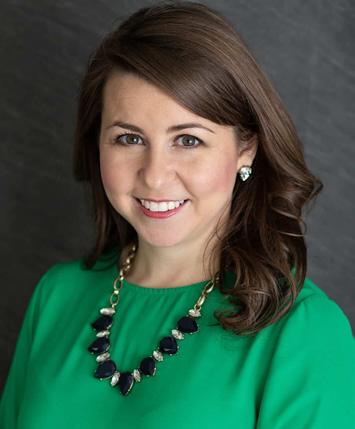
With support from FNU Controller Joseph Duruttya, the Board of Directors FNU Finance and Audit Committee, and the Foundation Board of Directors, Fangue hit the ground running, quickly picking up where Steinmetz left off.
“FNU has a sound financial base and prepares its annual budgets and administers its financial operations to be self-sustaining and ensure achievement of student learning outcomes and program outcomes,” Fangue said. “As the demand for its programs has increased over the past several years, FNU has been able to fund an increasing percentage of its operating expenses from sources such as tuition and fees. The sustainability of operations is also supported by strong operating margins and financial reserves. Sources of financial support include tuition, fees, grants, donations, bequests, gift shop sales, and earnings on investments.”
Fangue meets quarterly with the Board of Directors Finance and Audit Committee and the Foundation Board of Directors. The Finance and Audit Committee reviews and recommends to the board the proposed budget for the University, quarterly performance, long-range financial planning documents, and proposed tuition/fee changes.
The Foundation Board of Directors manages the affairs of Frontier Nursing Service, Incorporated, and oversees the investments and related policies of the University Endowment.
“The support, insight, and expertise of our volunteers and advisors are essential to ensure that we are making the right decisions for the present and future of Frontier,” Fangue said.
That decision-making process comes with an awareness that what might be the right course of action today may need to change tomorrow. Unforeseen events, such as the pandemic, have major implications on national and global markets.
“The university experienced some temporary decline in enrollment as a result of the pandemic,” Fangue said. “The pay rates for travel nurses increased significantly during the pandemic due to the great need for providers. This negatively impacted the number of students enrolling. As the rates for travel nurses began to decline, our enrollment returned to normal levels.”
With the campus now open and the impact of the pandemic beginning to lessen, FNU has returned to a state of relative normalcy regarding its financial structure, goals, and planning.
“The university ensures that each budget cycle sets targets for 4-6% of net income to revenue, which is a best practice established by the Department of Education,” Fangue said. “The excess funds provide support for unexpected expenses that may arise and any temporary shortfalls in enrollment. Any excess funds are invested in a well-balanced portfolio. The investments not only provide support for long-term strategies but they also act as a safety net for the university. We are sometimes asked why, as a non-profit, we do not spend all of the revenue we make. It is the aforementioned reasons that safeguard us for the future and the unknown.”
2022 PRESIDENT’S REPORT | 37
Chief Financial Officer Emily Fangue, CPA, MBA
Donor Wall
Graduates of Frontier Nursing University are making incredible strides to address healthcare disparities throughout the United States, particularly in rural and underserved areas. Your donations provide critical support to facilitate the exemplary student learning environment that FNU is known for.
Your donations to FNU open doors of opportunity for our students. Thank you!
Donations shown here are a sampling of gifts provided to FNU during the last fiscal year. While we are unable to list all donations to the University, we remain incredibly grateful to all our donors for your generous and kind support.
If you are interested in making a donation to FNU or providing for the University through your estate, please contact Chief Development Officer Bobbi Silver at bobbi.silver@ frontier.edu.
Breckinridge Capital Advisors generously donated $25,000 for the Breckinridge Capital Advisors Scholarship. Peter Coffin, President of Breckinridge Capital Advisors, Board member, and longtime friend to FNU matched the gift with a $25,000 donation of his own.
The CVS Health Foundation provided $4,000 for student scholarships.
Susan Graham & Jon Kucera donated $250,000, and Elaine Bolle & Lester Levine donated $50,000 to provide seed funding to create a $1 Million endowment to fund Diversity, Equity, and Inclusion programs.
Siblings Preston Farmer, Martha Copeland, and Patricia Huff donated $29,000 to create the Virgie and Rex Farmer Scholarship Endowment in honor of their parents. They also honored their parents with a plaque on a campus bench.
The Virginia Clark Hagan Charitable Foundation, Inc. donated $50,000 for Dropout Detective and LexiComp clinical drug reference software.
The Berea College Appalachia Fund provided $10,000 for scholarship support of nurses who express a commitment to serve the populations of the Appalachian region upon graduation.
38 | 2022 PRESIDENT’S REPORT Goal 6
The E.O. Robinson Mountain Fund provided $12,000 for scholarships for students residing in Eastern Kentucky.
Mr. Neil Van Sloun and The Van Sloun Foundation each donated $10,000 to the Van Sloun Scholarship Fund.
Jenny & John Pilarowski gave $3,700 for supplies to establish the Labor Management Skills and Intensive course.
FNU Board Chair Dr. Michael Carter and his wife, Dr. Sarah Carter, donated $9,000 to purchase a baby grand piano that is housed in the President’s House and used for special events.
Allan Apter created a $25,000 endowed scholarship in honor of his friend, Regina “Sis” Cohen, a nurse who saved his life.
Dr. Kendra Faucett generously provided on loan to FNU a variety of birth statues from countries across the world. The statues are on display in FNU’s Reflection Center for all to enjoy.
The Harriet H. Nicol Charitable Foundation donated $10,000 for unrestricted program support.
FNU Board Member
William Corley pledged $50,000 for a full tuition and fees scholarship for a student over two years.
Graduates of Frontier Nursing University are making incredible strides to address healthcare disparities throughout the United States, particularly in rural and underserved areas. Your donations provide critical support to facilitate the exemplary student learning environment that FNU is known for.
182 donors generously gave $75,157 to the Kitty Ernst Scholarship Fund in honor of our beloved FNU leader and friend. FNU’s President, Dr. Susan Stone, provided a generous lead gift of $25,000.
Former Courier Patricia Lawrence generously donated $5,000, as well as hosted FNU in her home in the Boston, MA area to share an update and a showing of the film “Angels on Horseback.”
The Margaret Voorhies Haggin Trust donated $30,000 for the purchase of an abdominal simulator, a “Sophie and Her Mum” obstetric trainer, a fetal monitor, and a “MamaNatali” birthing simulator to be sued during Frontier’s Clinical Bounds.
FNU hosted its first-ever Day of Giving on October 26, 2022, and raised $21,275 from 51 donors. Thank you!
The Charles M. and Joan R. Taylor Foundation provided $25,000 for FNU’s faculty and staff fellowship program in honor of Edward Settle Dabney, former Treasurer and Governor of FNS.
2022 PRESIDENT’S REPORT | 39
News, Events and Awards
FNU President Dr. Susan Stone to Transition to Distinguished Chair of Midwifery and Nursing

In February 2023, Frontier Nursing University (FNU) announced that university President Dr. Susan Stone, DNSc, CNM, FACNM, FAAN, will transition into a new role as the university’s appointed Distinguished Chair of Midwifery and Nursing. Dr. Stone’s transition into this role will tentatively occur at the end of 2023, pending the identification of her successor. Dr. Stone has served as the president of FNU since 2001. Whether as a practitioner, instructor, university president, presenter, or organizational leader, Dr. Stone’s professional career has been consistently directed toward supporting advanced practice nurses and nurse-midwives through advocacy, education, and innovation. As a nurse-midwife herself, she has had a special focus on advancing the midwifery profession.
“FNU has been profoundly fortunate to have had the expert leadership and progressive vision of Dr. Stone during her long tenure,” said FNU Board Chairperson Michael Carter. “Her wise counsel and steady leadership of FNU has resulted in our many outstanding achievements and positions us well for the future. The Board of Directors is very pleased to have her continued
service to the university as she assumes the Distinguished Chair of Midwifery and Nursing.”
Dr. Stone succeeds past Distinguished Chair of Midwifery Dr. Eunice (Kitty) Ernst, who passed away in December 2021. Appointed by the FNU Board of Directors, the purpose of this Chair is to promote midwifery both nationally and internationally. FNU is conducting a national search to identify Dr. Stone’s successor as the university President. The search is being led by Dr. Kerri Schuiling, Ph.D., CNM, FACNM, FAAN, in collaboration with a recruiting firm.
“Since assuming the presidency in 2001, Susan Stone has worked tirelessly to achieve the vision of Frontier Nursing University as the premier online educational institution for advanced practice nursing,” said Dr. Schuiling, who is a member of the FNU Board of Directors. “Dr. Stone is a dedicated advocate for access; access to education for nurses who want to become advanced practice nurses and nurse-midwives and access to quality healthcare for all. Over her tenure these last two decades, she has been nationally recognized for exponentially increasing the number of nursemidwives and other advanced practice professionals practicing in areas of highest need. FNU is fortunate that Dr. Stone has created a firm foundation upon which her successor can continue to build upon her legacy.”
Dr. Stone was inducted into the National Academy of Medicine Class
of 2018 and is past president of the American College of Nurse-Midwives (ACNM) from 2019-2020. She is a Fellow at both ACNM and the American Academy of Nursing. She was the recipient of ACNM’s Kitty Ernst Award in 1999, which recognizes “innovative, creative endeavors in midwifery practice and women’s health care.” Other honors include the 2011 American Public Health Association’s prestigious Felicia Stewart Advocacy Award, which recognizes individuals who have demonstrated a strong commitment to advocacy on behalf of reproductive health and rights.
“Susan Stone has left a legacy of growth and transformation at Frontier,” said FNU Dean of Nursing Dr. Joan Slager, CNM, DNP, FACNM, FAAN. “She has demonstrated vision and leadership that have resulted in the exponential expansion of our programs while remaining staunchly true to our mission. I’m very pleased she will continue to serve FNU as the Distinguished Chair of Midwifery, where her primary focus will be to facilitate endeavors that support the education of midwives and the practice of midwifery.”
Throughout FNU’s growth and innovation, Dr. Stone has kept the university focused on its mission of educating advanced practice nurses and midwives to serve in rural and underserved areas. Today, more than 8,700 FNU graduates practice in every state in the U.S. as well as several foreign countries.
40 | 2022 PRESIDENT’S REPORT
FNU President Dr. Susan Stone, DNSc, CNM, FACNM, FAAN
Frontier Nursing University Holds Commencement In-Person For the First Time Since 2019
Frontier Nursing University (FNU) celebrated the 1,064 students who graduated in 2022 at the university’s first in-person commencement ceremony since 2019. The 2020 and 2021 ceremonies were held virtually due to the pandemic. All graduates from 2020 and 2021 were also invited to attend the 2022 ceremony, which was held at Rupp Arena in Lexington, Kentucky, on Saturday, September 24. Approximately 1,500 people were in attendance, including 264 graduates, over 1,000 family members and friends, and FNU faculty and staff.
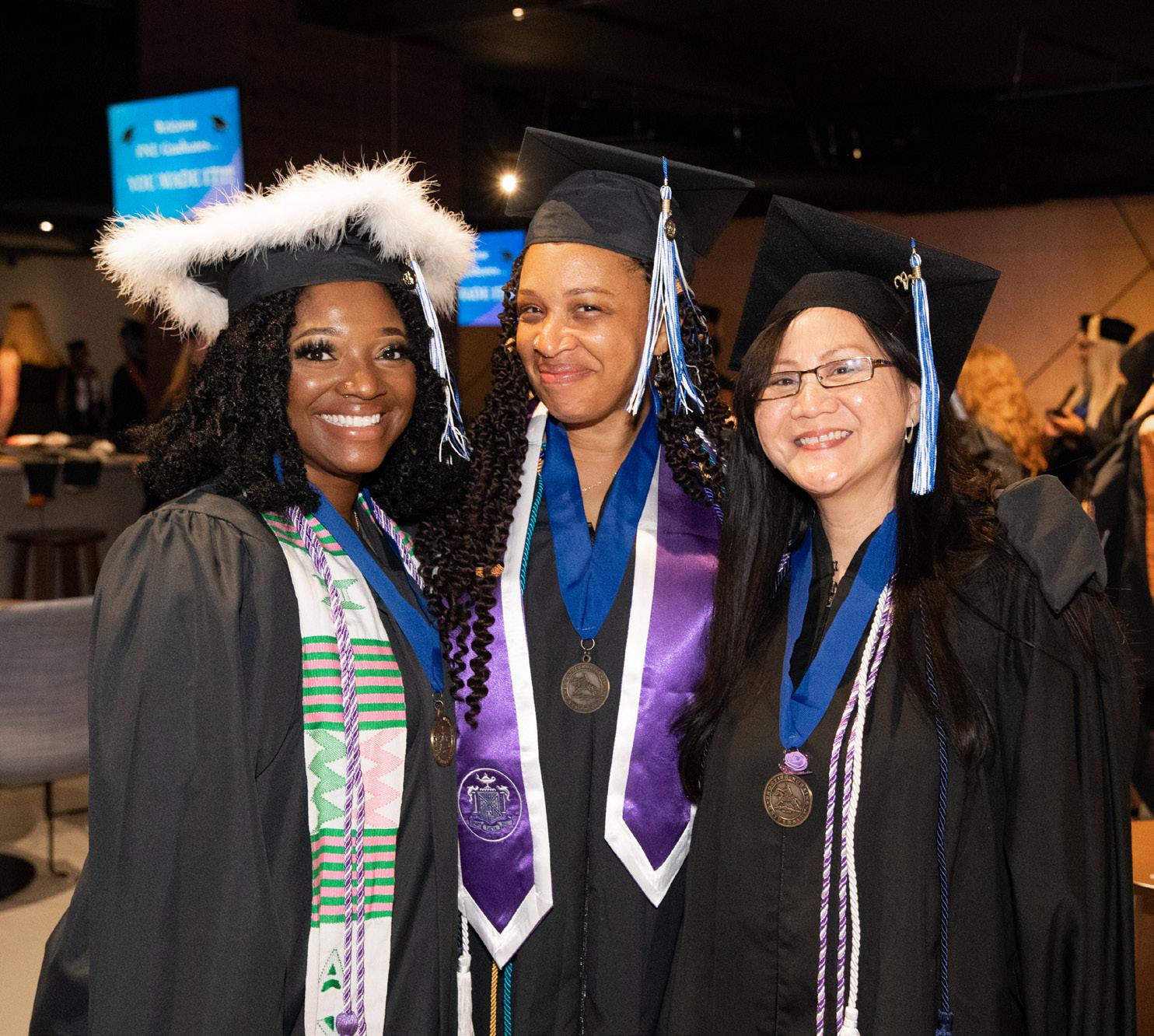
“The past two years have been incredibly difficult for so many people, and we are very proud of the determination and desire you have displayed in earning your degree,” said FNU Dean of Nursing Dr. Joan Slager, CNM, DNP, FACNM, FAAN. “We can all agree that the COVID-19 pandemic has demonstrated the invaluable roles that nurses and midwives play in providing healthcare around the globe. After today, each of you will be able to say you graduated during an unforgettable time in our history. You are ready to make a significant difference and contribution
to your community, and that is what Frontier Nursing University expects from all members of our community. We make a difference by answering the call to serve.”
Dr. Slager went on to introduce the keynote speaker, Dr. Tim Raderstorf, DNP, RN. Dr. Raderstorf is the Talent Partner for AndHealth, a digital health company focused on helping people reclaim their lives from chronic illness. He also holds volunteer positions as the Head of Academic Entrepreneurship at the Erdo¨s Institute and the Chief Operating Officer of the non-profit NursesEverywhere. He is a member of the American Nurses Association’s Innovation Advisory Board. In his previous role, Tim was the Chief Innovation Officer at The Ohio State University College of Nursing. Dr. Raderstorf is also the founder of the Innovation Studio, a maker space that democratizes innovation, providing every interprofessional team that pitches their innovation with the funding, tools, and mentorship needed to turn ideas into actions.
His new textbook, co-authored with Bern Melnyk, Evidence-Based Leadership, Innovation and Entrepreneurship in Nursing and Healthcare: A Practical Guide for Success, was a #1 new release on Amazon and the American Journal of Nursing’s Management & Leadership Book of the Year. Dr. Raderstorf was recently inducted into the 2020 Class of 40 under 40 by Columbus Business
2022 PRESIDENT’S REPORT | 41
Events and Awards
The 2022 FNU Student Leadership Awards winners are:
First and was inducted as a 2021 Fellow at the American Academy of Nursing.
“Your voice matters. If nursing collectively as the largest healthcare profession can unify our voice, then we have the capacity to change the country,” Dr. Raderstorf said in his keynote address. “I hope to see you impact the lives of many throughout the communities that you serve.”
The commencement ceremony also included the presentation of the university’s annual leadership awards, honoring the students who provided exceptional leadership to their peers.
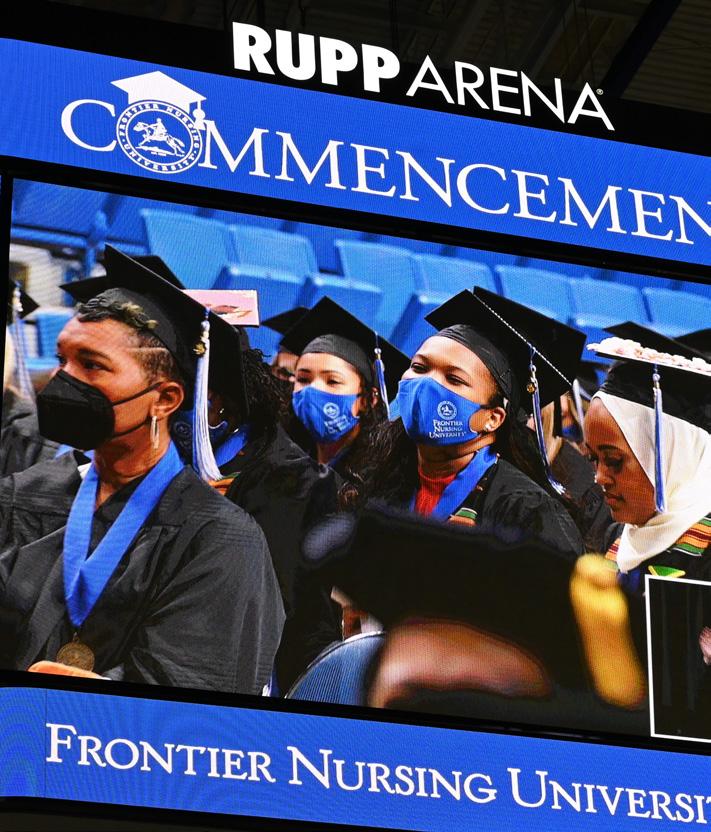
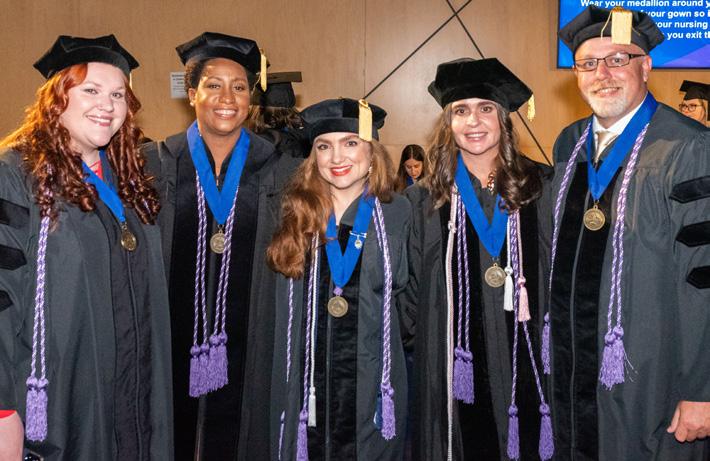
Kitty Ernst Nurse-Midwifery Student Leadership Award:
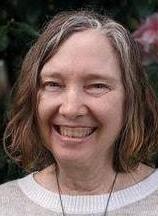
Joanna Wilder, CNEP, Class 189, Tigard, Oregon
Joanna Wilder closed her homebirth practice in Arizona after eight years in order to focus on her studies to become a certified nurse-midwife.
Her family moved to Oregon, and she joined the Oregon affiliate of the American College of Nurse-Midwives, serving on the Board as the student representative for Frontier Nursing University.
“My clinical experiences in rural Oregon serving immigrant and Old Order families fostered a commitment to provide healthcare to underserved areas of Oregon after graduation,” she said. “I pursued multiple scholarships and am graduating with no debt so that I can move seamlessly into serving the immigrant community.”
Women’s Health Care Nurse Practitioner Student Leadership Award:
Shauntey Singletary, WHCNP, Class 196, Seaford, Delaware

Shauntey Singletary’s leadership extends beyond FNU to a number of nursing organizations. She is a member of the American Nurses Association (ANA), the Delaware Nurses Association (DNA), Nurse Practitioners in Women’s Health (NPWH), Delaware Coalition of Nurse Practitioners (DCNP), the American Association of Nurse Practitioners (AANP), Association of periOperative Registered Nurses (AORN), and the Association of Women’s Health, Obstetric, and Neonatal Nurses (AWHONN). She served as a Frontier Nursing University student council representative for the CWHCNP class 196 since 2020.
“As an African-American person who proudly identifies as a woman of color, I desire to open an APRNled independent practice targeting underserved minority members of my community.,” she said.
42 | 2022 PRESIDENT’S REPORT News,
Family Nurse Practitioner Student Leadership Award:
Catherine Underwood, FNP, Class 189, Wahiawa, Hawaii

After completing her graduate coursework at Frontier in January 2022, Catherine Underwood began working as a nurse practitioner at a community site aimed at providing free COVID testing to residents and visitors of Oahu. The goal of the clinic is to provide free, accessible testing and education about symptoms, disease management, vaccination, and treatment options for COVID. She resides on the island of Oahu and hopes to focus on serving the local Hawaiian and Pacific Islander populations.
“Many of the Hawaiian and Pacific Islander families live in rural areas of the island where access to health care services is limited,” she said. “The members of this community are commonly affected with chronic diseases such as diabetes, hypertension, and obesity. A community health program aimed at providing free or low-cost early intervention through screening and education could help decrease the burden of healthcare on these families and promote lifestyle changes to decrease the risk of chronic disease.”
Psychiatric-Mental Health Nurse Practitioner Student Leadership Award:
Kaitlyn Rychlowski, PMHNP, Class 191, Fond Du Lac, Wisconsin
In April 2022, Kaitlyn Rychlowski joined Marshfield Medical Center in Beaver Dam, Wisconsin, as a Behavioral Health Nurse Practitioner. The community did not have mental health services prior to her arrival.
“Throughout Marshfield Clinic Health System, my mentors have commended my advanced knowledge and skill, noting that my success reflects the rigorous education provided, with a desire to hire additional Frontier Nursing University graduates,” she said.
Doctor of Nursing Practice Student Leadership Award
Dr. Estella Wetzel, DNP, APRN, FNP-C DNP, Class 39, Beavercreek, Ohio
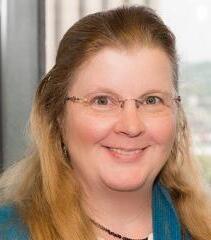
Since 2016, Estella Wetzel has been a nurse practitioner at Beavercreek Family Physicians in Beavercreek, Ohio. She is also regional clinical faculty at FNU. For three years, she was the lead provider in a clinic
that provided free health care for students and staff in a rural community college. Under her guidance, the scope of the clinic expanded from handling only acute issues to including care for some chronic conditions, including hypertension and diabetes, keeping students in the classroom more consistently. She has also been active in researching prescriptions and their impact on patients.
“My experience working with a large number of overprescribed patients drove me to begin researching how drug test interpretation is taught,” she said. “With all the interventions that health care providers are asked to do to monitor patients prescribed controlled substances, I hope to make this easier for anyone who wishes to listen.”
Doctor of Nursing Practice Exemplary Project Award
Dr. Melissa Morris, DNP, Class 42, Silver Plume, CO
Melissa Morris is a family nurse practitioner/ adult gerontology acute care nurse practitioner

in the urgent care and emergency departments at Denver Health Medical Center. She began her healthcare career in 2012 as a bedside nurse on a telemetry medical-surgical unit at the University of Colorado Hospital

2022 PRESIDENT’S REPORT | 43
Events and Awards
and then worked as an emergency department nurse.
She earned her MSN from Colorado State University and began her career as a nurse practitioner in 2017 as an advanced practice fellow in hospital medicine at the University of Colorado Hospital. Since completing her postgraduate fellowship, she has worked at Denver Health Medical Center as a nurse practitioner in the emergency department and urgent care.
Her project, “Increasing Effective Care for Emergency Department Patients with Opioid-Related Diagnoses Using World Health Organization Guidelines”, focused on improving Naloxone prescribing and dispensing in an area that has one of the highest opioid abuse rates in the country.
“She was successful in improving care for patients, ultimately bringing medical scribes into the educator role
to assist teams already experiencing significant COVID-related burnout,” said Dr. Slager.
Commencement also always features the presentation of the Excellence in Teaching Awards. Each year, the Student Council leads the student body in selecting faculty members to receive Excellence in Teaching awards. These awards are given annually to faculty members who inspire and impact their students. The students select both an Academic Faculty Award and Regional Clinical Faculty Award. Here are the 2022 FNU Excellence in Teaching Award winners:
Academic Faculty Excellence In Teaching Award
Dr. Joshua Faucett, DNP, MBA, FNPBC, CNE
Assistant professor Dr. Joshua Faucett is a family nurse practitioner with a decade of experience in oncology.

Dr. Faucett enlisted in the Army in 2005 after having spent the previous five years as a firefighter/paramedic Following two tours totaling 27 months in and around Baghdad, Iraq, he returned home after five years of service to begin the next stage of his life. He enrolled at New York University as an undergraduate nursing student and was selected as a Pat Tillman Military Scholar in 2011. Following graduation, he began his career with
Memorial Sloan Kettering Cancer Center and continued his education at Pace University, completing training as a Family Nurse Practitioner in 2014. He then began working at the Weill Cornell Brain Tumor Center, providing care to patients with malignant brain tumors. His research focus is Veteran mental health and suicide prevention.
Dr. Faucett’s wife, Kendra, DNP, CNM, CNE, FACNM, is an FNU alumnus and also an assistant professor at Frontier.
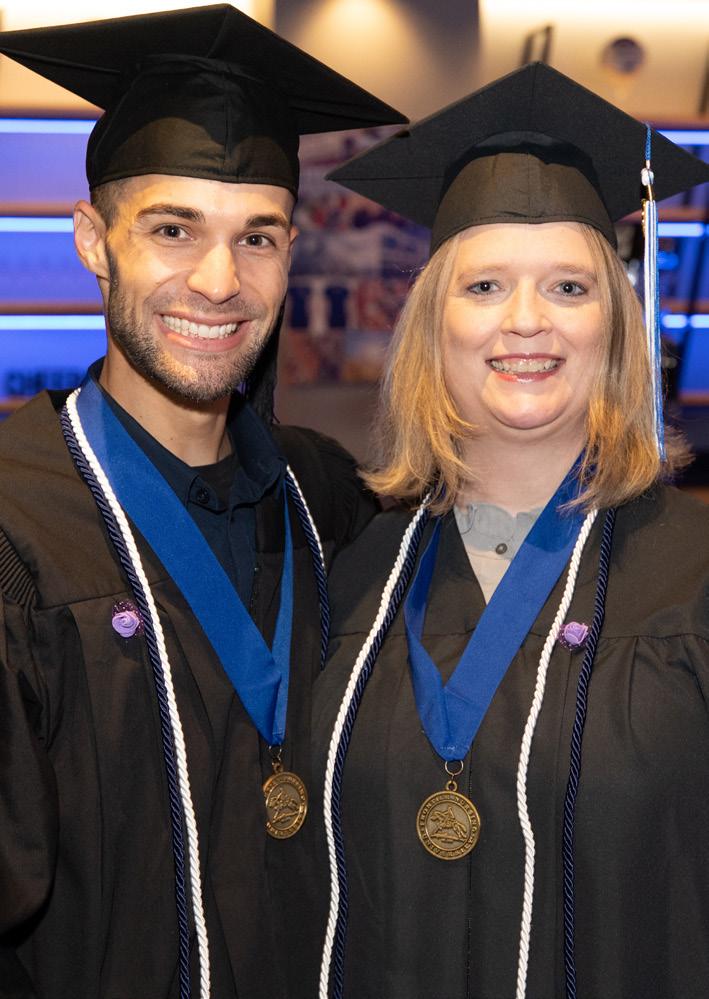
Regional Clinical Faculty Excellence In Teaching Award:
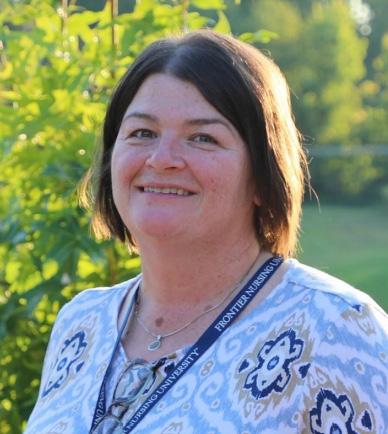
Dr. Tammy Whitehead, DNP (Class 11), FNP-C, PMHNP-BC, CNE
FNU alumnus and regional clinical faculty
Dr. Tammy Whitehead is a psychiatricmental health and family nurse practitioner. Her background includes psychiatric care, emergency care, cardiology, family practice, and urgent care. Dr. Whitehead received her post-graduate certificate from Brandman University. She received both her MSN and DNP from Frontier Nursing University. Dr. Whitehead is a board member of the Kentucky Coalition of Nurse Practitioners and Nurse-Midwives and was also the Chair of the Editorial Committee for the group. Dr. Whitehead lives in Berea, Kentucky.
44 | 2022 PRESIDENT’S REPORT News,
FNU Holds Ribbon-Cutting and Land Acknowledgment Ceremony
Frontier Nursing University (FNU) celebrated the official opening of its new location on the beautiful, newly renovated Versailles Campus with a ribbon-cutting and land acknowledgment ceremony on Friday, September 9, at 10:00 a.m. Approximately 100 people attended the ceremony, including Kentucky Governor Andy Beshear, who praised the impact of FNU in preparing more nurses to address the nursing shortage in the state and country.
“Congratulations to Frontier Nursing University on this incredible new campus that will serve their students, who in turn will serve our people throughout their careers,” Governor Beshear said. “With help from schools
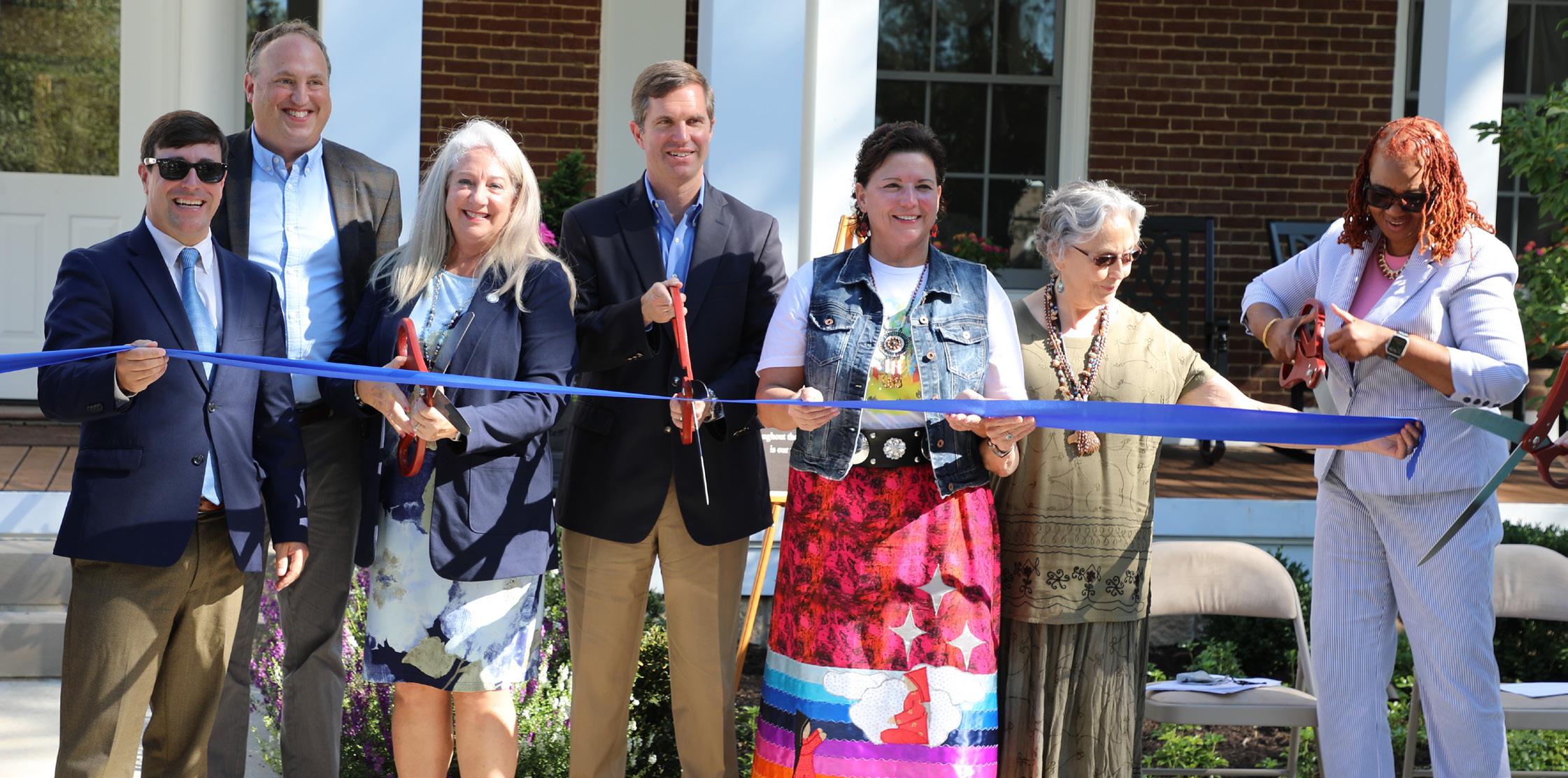
like Frontier Nursing University, I know we can help train the next generation of healthcare heroes, building a better Kentucky for all of our families.”
In October 2017, FNU finalized the purchase of the 217-acre Versailles property, previously occupied by The United Methodist Children’s Home, to serve its students better and to continue its longstanding commitment to its mission. Renovation and construction for FNU’s new campus and the move from Hyden began in 2018. The opening of the Versailles campus to students was delayed by the pandemic until the Fall of 2021.
“This is the type of advancement we need across Kentucky,” Governor Beshear said. “What this university is doing is going to be a part of a transformational moment here in Kentucky, and I can’t wait to see the special ways that it helps all of
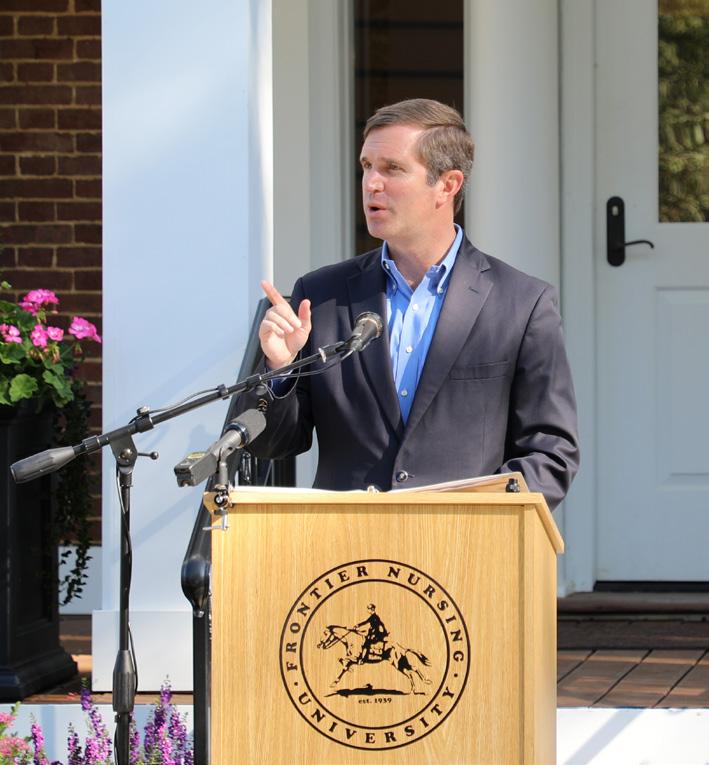
2022 PRESIDENT’S REPORT | 45
Kentucky Governor Andy Beshear spoke at the ribbon-cutting ceremony.
us move forward and become the leaders and not the followers in this country that we’ve always known Kentucky should be.”
“We have had a number of landmark days since we were founded in 1939, and we are so happy to be able to share this momentous occasion with all of you,” said FNU Dean of Nursing Dr. Joan Slager, CNM, DNP, FACNM,
Awards
Immediately following the ribbon-cutting ceremony, a land acknowledgment ceremony was held, acknowledging the land as the original home of the Shawnee and Cherokee people. FNU Chief Diversity and Inclusion Officer Dr. Paula AlexanderDelpech, Ph.D., PMNHP-BC, APRN, introduced Native American elders Helen Danser and Venus Evans, who read the land acknowledgment statement: “Frontier Nursing University wants to acknowledge that Versailles,
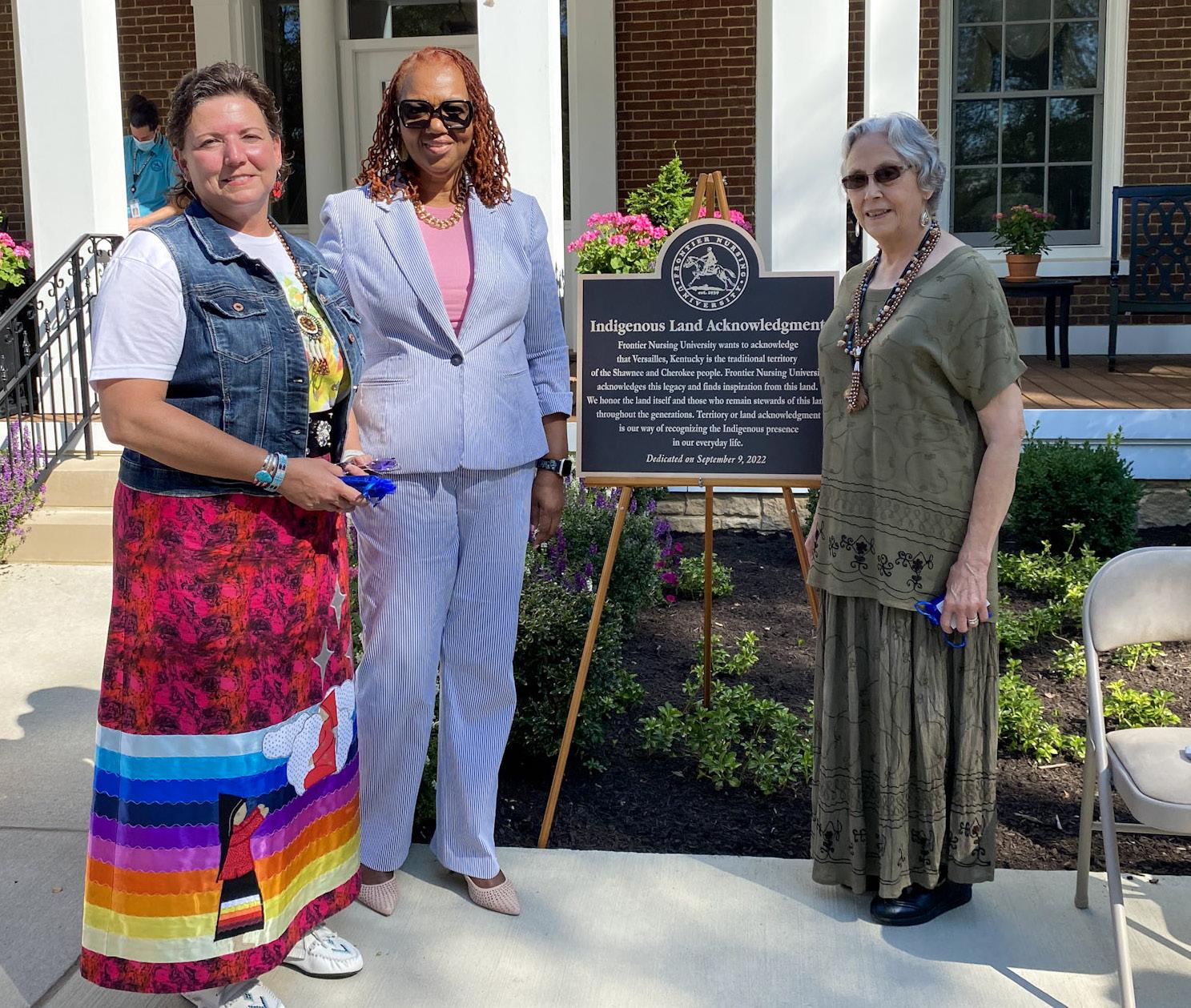
Kentucky is the traditional territory of the Shawnee and Cherokee people. Frontier Nursing University acknowledges this legacy and finds inspiration from this land. We honor the land itself and those who remain stewards of this land throughout the generations. Territory or land acknowledgment is our way of recognizing the Indigenous presence in our everyday life.” This statement engraved on the sign placed at the trailhead of FNU’s 5K walking path informs visitors of the land’s history.
FAAN. “Beginning with our founding by Mary Breckinridge in Leslie County, Frontier has always been striving to meet the health care needs of rural and underserved communities.”
The ceremony also included remarks from Woodford County Judge Executive James Kay and Midway Mayor Grayson Vandegrift. Versailles City Clerk and Treasurer Elizabeth Reynolds delivered a proclamation from Versailles Mayor Brian Traugott, declaring September 9, 2022, as Frontier Nursing University Day.
46 | 2022 PRESIDENT’S REPORT News,
Events and
Native American elders Venus Evans (left) and Helen Dansler (right), and FNU Chief Diversity Equity and Inclusion Officer Dr. Paula Alexander-Delpech (center) led the Land Acknowledgement ceremony.
“We have had a number of landmark days since we were founded in 1939, and we are so happy to be able to share this momentous occasion with all of you.”
-- FNU Dean of Nursing Dr. Joan Slager
All-Star Presenter Lineup Highlights Diversity Impact Conference 2022

FNU held its 12th annual Diversity Impact Conference on June 28-29. The event, which was free for all attendees, was held virtually for the third consecutive year. The conference’s theme was “Engaging Diverse Voices in Sustained Dialogue to Build Community Trust.” The conference featured an impressive group of speakers and presenters from across the country.
The opening day keynote address, “Social Justice in Nursing Education,” was given by Boston University Associate Professor of General Internal Medicine and Director of Faculty Development Angelique Harris, Ph.D., MA. The day two keynote address, “Community Historical Trauma,” was delivered by University of Texas School of Nursing Professor John Lowe, Ph.D., FAAN. Among the many other presentations were two by Clinical Professor at Duke University’s School of Nursing, Brigit Carter, Ph.D., MSN, RN, CCRN, FAAN, and Assistant Clinical Professor at Duke University’s School of Nursing Jacqui McMillianBohler, Ph.D., CNM. Together, they presented “Personal Triggers” and “Microaggressions.” FNU alumni Caitlin Hainley, DNP, ARNP-CNM, IBCLC, and Emily Zambrano-Andrews, DNP,
ARNP- CNM, presented “Building Community: Advancing Accessibility and Affordability in the Midwifery Model,” based on their experience as co-founders of the Des Moines Midwife Collective. FNU President Susan Stone, CNM, DNSc, FAAN, FACNM, gave a presentation and led a discussion about gun violence in the United States.
One of the conference’s many highlights was a screening of the acclaimed documentary “Apart.” The film features formerly incarcerated mothers jailed for drug-related charges who overcome
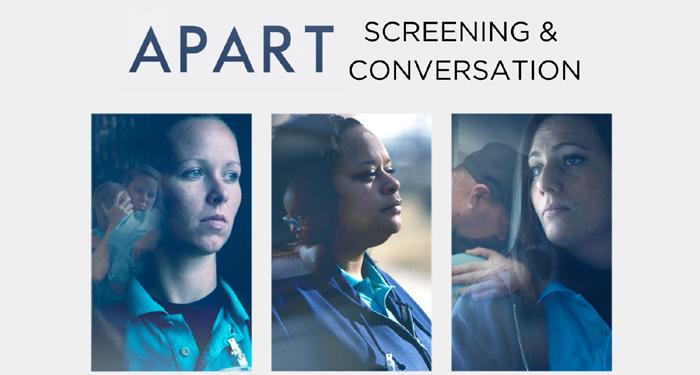
this so seriously that this is the type of event they would sponsor. I know I’m being prejudiced – nevertheless, we had a lineup of speakers that speaks volumes of how important diversity is to us. It tells us that we put value into diversity, equity, and inclusion. It’s not just lip service. It is what we live, it is part of our fabric. I’m so proud to be interwoven into that fabric.”
alienation and a society that labels them as “felons” to readjust to life with their families. The screening was followed by a panel discussion with three of the women featured in the documentary.
“What conference has a screening of a documentary and then has a session with the stars of the documentary?”
Dr. Alexander-Delpech said. “I was floored by those women, allowing us to take what they were telling us into our classrooms and our professions.”
“I am proud that FNU makes this a signature event,” Dr. Alexander-Delpech continued. “I am so proud that I am a member of a community that takes
“I always learn something at the Diversity Impact Conference,” said FNU Associate Dean of Academic Affairs Rachel Risner, Ph.D., DNP, APRN, C-FNP, CNE. “I learned something from every one of our speakers. It was just such an important time for me to disconnect from all my other meetings and chats and work and just be in the moment and to listen to what everybody had to say and to have takeaways and to be able to be reflective. All the speakers were really great. I can’t wait to see how much it changes and grows every year.”
Dr. Alexander-Delpech believes that the Diversity Impact Conference has the potential to become even more prominent in the years ahead.
“I want to see this as the signature online conference,” she said. “I want to take it beyond the university. I want to go beyond our walls because we can. We just need to push the envelope further. That’s my goal for next year, to bring outside people into the conference.”
2022 PRESIDENT’S REPORT | 47
Awards
Frontier Nursing University Receives INSIGHT Into Diversity 2022 Health Professions Higher Education Excellence in Diversity (HEED) Award for Fifth Consecutive Year

Frontier Nursing University (FNU) received the 2022 Health Professions Higher Education Excellence in Diversity (HEED) Award from INSIGHT Into Diversity magazine, the oldest and largest diversity-focused publication in higher education. As a recipient of the annual Health Professions HEED Award — a national honor recognizing U.S. health colleges and universities that demonstrate an outstanding commitment to diversity and inclusion — FNU was featured, along with 64 other recipients, in the December 2022 issue of INSIGHT Into Diversity magazine. This is the fifth consecutive year FNU has been named as a Health Professions HEED Award recipient.
“It is an incredible honor to receive the INSIGHT Into Diversity 2022 Health Professions Higher Education Excellence in Diversity Award for each of the last five years,” said FNU President Dr. Susan Stone, CNM, DNSc, FAAN, FACNM. “We are proud of the progress we have made through our focus on diversity, equity, and inclusion (DEI), but much work is still to be done. To that end, we continue to set new goals and make data-driven, evidencebased decisions on how best to achieve those goals. We value DEI not only because it is the right thing to do but also because, as educators of nurse practitioners and nurse-midwives, we
understand the importance of culturally concordant healthcare in creating better health outcomes and reducing health disparities.”
Over the last 12 years, FNU has raised its enrollment of students of color from 9 percent to over 27 percent and continues its efforts to increase the recruitment and retention of students of color. In July 2022, FNU held its 12th annual Diversity Impact Conference, which is a free two-day event featuring presenters who are renowned leaders in DEI from across the country. In September, FNU held a land acknowledgment ceremony as part of the ribbon-cutting event officially opening the university’s campus in Versailles, Kentucky. The land acknowledgment, which will be permanently displayed on a sign located on the campus’ 5K walking trail, states that FNU acknowledges that Versailles is the traditional territory of the Shawnee and Cherokee people.
FNU created the Bias Incident Report Advisory Council in 2021 to bring together processes to develop a coordinated approach to responding to implicit and biased incidents at FNU. The aim is to bring together different perspectives and processes from across the University to develop a coordinated approach to responding to biased incidents at the University. An even newer DEI-related initiative at FNU is the recent launch of five student interest groups (SIGs). The SIGs, which are student-led and meet monthly, include International Students in Nursing; LGBTQIA+ Students in Nursing; Men in Nursing; Military/ Veterans in Nursing; and Students of Color in Nursing.
“Frontier Nursing University is committed to a safe, open, and respectful university where every member is valued and welcomed,” said FNU Chief Diversity and Inclusion Officer Dr. Paula Alexander-Delpech, Ph.D., PMHNP-BC, APRN. “At FNU, diversity, equity, and inclusion are core principles that are integrated into the mission of our university as we continuously strive for inclusive excellence.”
48 | 2022 PRESIDENT’S REPORT News, Events and
Frontier Nursing University Named A “Great College to Work For” for the Second Consecutive Year
For the second consecutive year, Frontier Nursing University (FNU) was named one of the best colleges in the nation to work for, according to the Great Colleges to Work For® program.
The results are based on a survey of 212 colleges and universities. In all, 68 of those institutions achieved “Great College to Work For” recognition for specific best practices and policies. Results are reported for small, medium, and large institutions, with FNU included among the small universities with 500 to 2,999 students.
As was the case in 2021, Frontier was identified as a workplace that excels in all ten categories:
• Job Satisfaction & Support
• Compensation & Benefits
• Professional Development
• Mission & Pride
• Supervisor/Department Chair Effectiveness
• Confidence in Senior Leadership
• Faculty & Staff Well-being
• Shared Governance
• Faculty Experience
• Diversity, Inclusion & Belonging
By excelling in all 10 categories, FNU, which has over 250 employees, was also named to the Great Colleges Honor Roll. The Honor Roll status is granted to the 42 colleges each year that are highlighted most across the recognition categories.
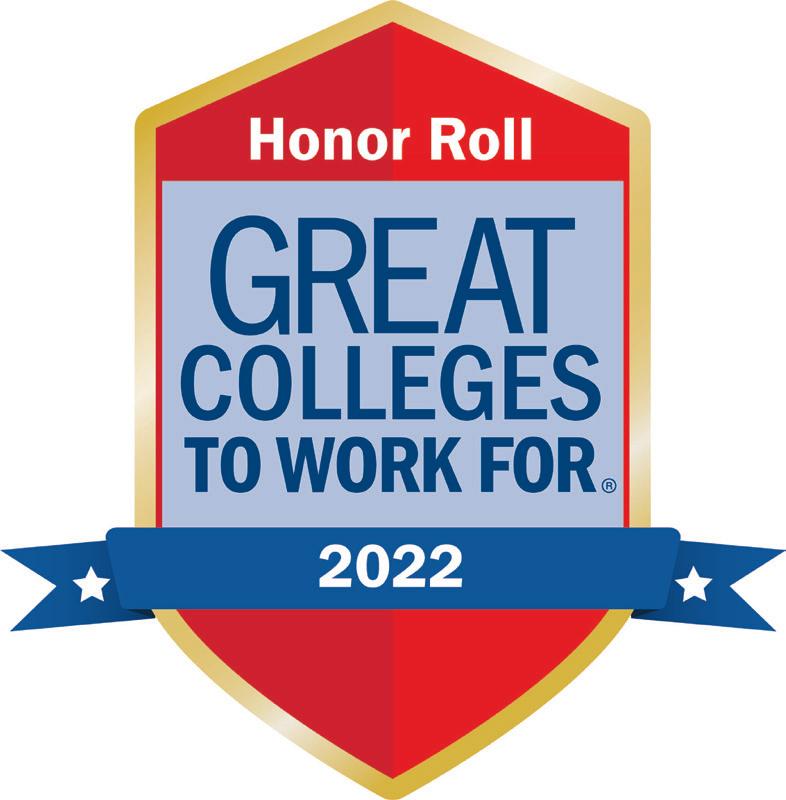
“It is a tremendous honor to be named a Great College to Work For again this year,” said FNU President Dr. Susan Stone. “This matters to us not because of the award itself but because of what it says about our university. We pride ourselves on creating and maintaining a culture of caring in which all employees are valued and respected. We want our employees to be proud of the work they do and to be empowered to use their talents to serve our students and advance our mission.”
The survey results are based on a two-part assessment process: an institution questionnaire that captured employment data and workplace policies from each institution and a survey administered to faculty, administrators, and professional support staff. The primary factor in deciding whether an institution received recognition was employee feedback.
The Great Colleges to Work For® program is one of the largest and most respected workplace recognition programs in the country. For more information and to view all current and previously recognized institutions, visit the Great Colleges program website at GreatCollegesProgram.com and GreatCollegesList.com. ModernThink, a strategic human capital consulting firm, administered the survey and analyzed the results.
2022 PRESIDENT’S REPORT | 49
Events and Awards
Frontier Celebrates National Nurse-Midwifery and National Nurse Practitioner Weeks
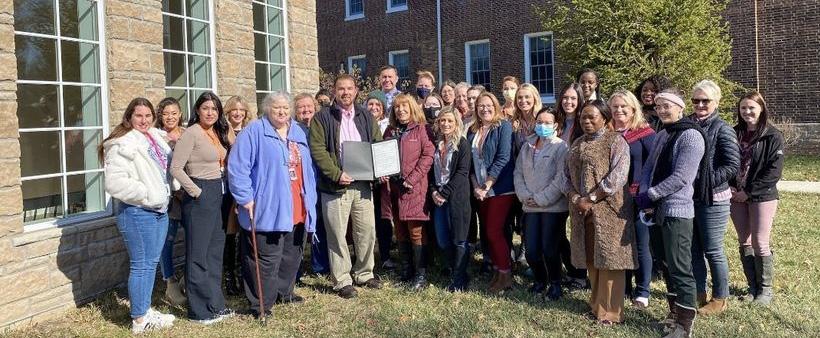

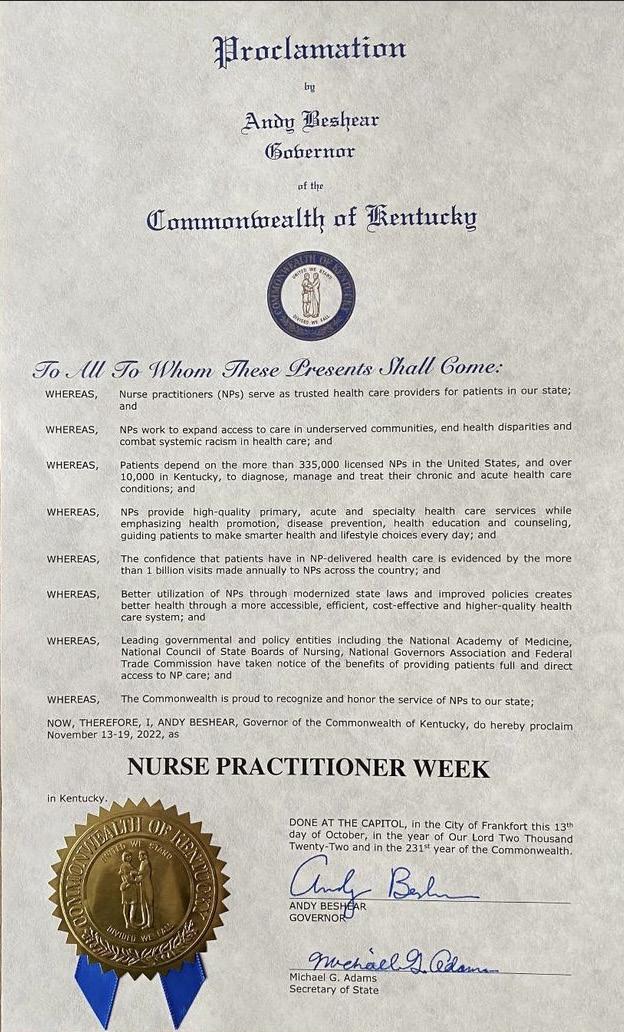
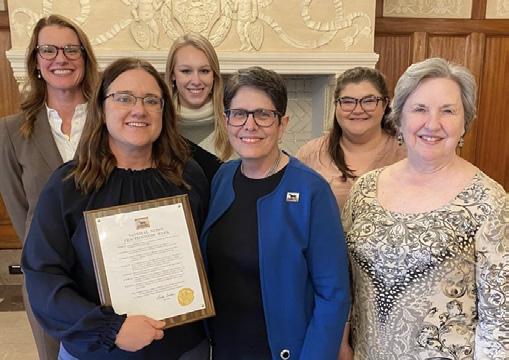
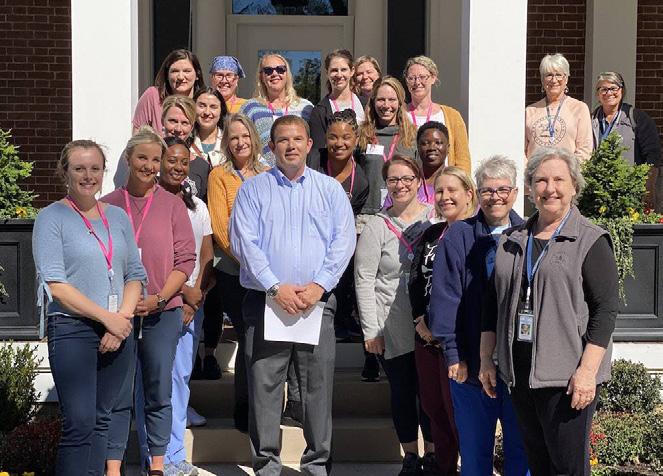
For the eighth consecutive year, Frontier Nursing University celebrated National Nurse-Midwifery Week (October 2-8) and National Nurse Practitioner Week (November 1319) with two virtual events. The 2022 Empower Virtual Events, which were sponsored by Southern Cross Insurance, were free and included several presentations from leaders in the nurse-midwifery and nurse practitioner professions. In conjunction with these events, Kentucky Governor Andy Beshear issued proclamations declaring Nurse-Midwifery Week and Nurse Practitioner Week in the state. Similarly, Lexington, Kentucky, Mayor Linda Gorton, and Versailles, Kentucky Mayor Brian Traugott issued proclamations in honor of both Nurse Practitioner Week and NurseMidwifery Week.
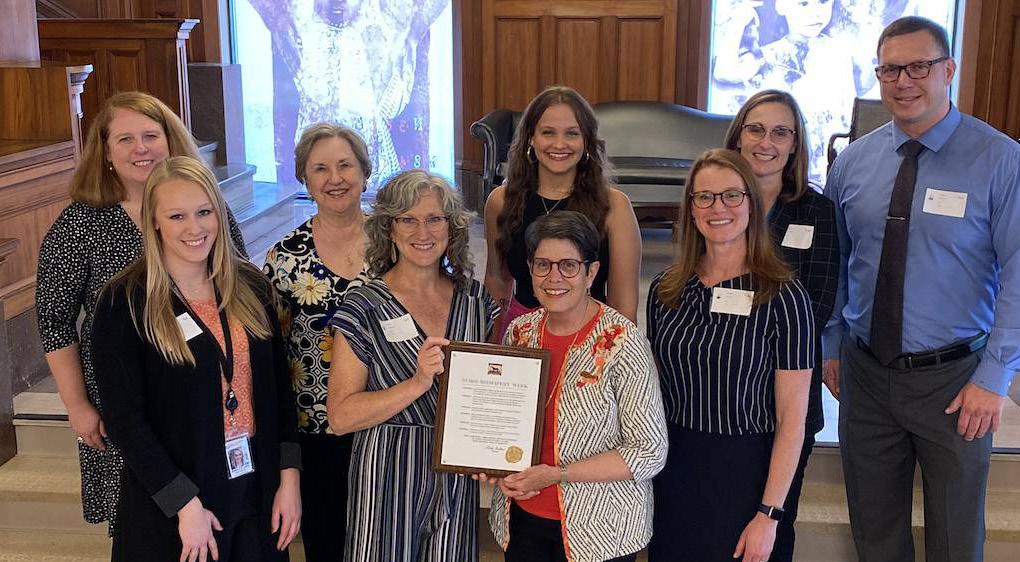
50 | 2022 PRESIDENT’S REPORT News,
Versailles Mayor Brian Traugott (center, holding plaque) issued proclamations in honor of both Nurse Practitioner and NurseMidwifery Week.
Kentucky Governor Andy Beshear issued proclamations declaring Nurse-Midwifery Week and Nurse Practitioner Week in the state.
Lexington Mayor Linda Gorton issued proclamations in honor of both Nurse Practitioner and NurseMidwifery Week.
Frontier Nursing University Selected to Participate in National Initiative to Foster Inclusive Learning Environment
The American Association of Colleges of Nursing (AACN) announced that Frontier Nursing University (FNU) is one of 50 schools of nursing in the U.S. to have been selected to participate in a national initiative designed to foster inclusive learning environments and build a more diverse nursing workforce. Nearly 250 schools applied to participate in the initiative. In January 2022, AACN commenced a project titled Building a Culture of Belonging in Academic Nursing with funding from Johnson & Johnson.

AACN launched this initiative to help schools of nursing create environments where students, faculty, and staff possess a strong sense of belonging and are encouraged to thrive.
“Creating a learning culture where all individuals are able to develop and do their best work is critical to achieving academic nursing’s goals related to diversity, equity, and inclusion,” said Dr. Deborah Trautman, AACN President and Chief Executive Officer. “AACN is pleased to join with 50 member schools to pilot test a new tool that will help to evolve how nurse educators approach teaching, learning, and professional engagement.”
To support this project, AACN developed a digital platform to administer its Leading Across Multidimensional Perspectives (LAMP®) Culture and Climate Survey. This instrument collects data on student, faculty, and staff perceptions of their college classrooms as communities in five thematic areas: fair treatment and observations of discrimination, belongingness, value
AACN will also use aggregate data collected from participating schools to identify best practices and success strategies that can be deployed at institutions nationwide.
of diversity and inclusion, campus services, and clinical training.
Using data collected via LAMP, AACN will provide institution-level assessments and action reports to participating schools related to developing inclusive academic environments. This tool provides administrators with a better understanding of how their campus climate influences student experiences and achievement. With assessment data from internal stakeholders, educators are equipped with valuable information needed to initiate change, target areas of growth, and, most importantly, improve student outcomes.
“We are honored to have been selected to participate in this important initiative,” said FNU Chief Diversity and Inclusion Officer Paula Alexander-Delpech, Ph.D., PMHNPBC, APRN. “We hope that the assessment data collected from students, faculty, and staff will give us valuable information that will guide us to initiate changes, identify target areas for growth, and most importantly, help us to improve student outcomes.”
Schools selected to participate in this pilot study are geographically diverse and represent a range of institutional types (public and private institutions; small and large schools; rural and urban-serving programs, etc.) Having a broad range of participating schools is important to securing results that can be generalizable across all types of nursing schools.
Pilot testing of the LAMP survey will be completed in spring 2023. AACN will disseminate aggregate findings to all schools of nursing next year.
2022 PRESIDENT’S REPORT | 51
Dr. Rachel Risner Selected for National League for Nursing & Walden University College of Nursing Institute for Social Determinants of Health & Social Change
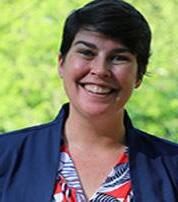
Dr. Rachel Risner,
Ph.D.,
DNP, APRN, C-FNP, CNE, Associate Dean of Academic Affairs, was selected to participate in the National
League for Nursing & Walden University College of Nursing Institute for Social Determinants of Health & Social Change. Dr. Risner attended an orientation to the Social Determinants of Health & Social Change Leadership Academy, held in Washington, D.C., August 8-9. The orientation was the start of the yearlong program, which is a key element of a groundbreaking collaboration between the League and Walden University College of Nursing Institute for Social Determinants of Health and Social Change, launched last year to bring about positive social change through focused professional development.
Dr. Risner was chosen through a competitive application process for her dedicated work in social determinants of health and social change, which address the impact of structural racism, socioeconomic status, environment, education, adequate housing, and food insecurity on health and wellbeing.
“We are so proud and fortunate to have Dr. Risner at Frontier Nursing University,” said FNU Dean of Nursing Dr. Joan Slager, CNM, DNP, FACNM, FAAN. “She is a dedicated leader with a strong commitment to FNU’s vision for educating our students about the social determinants of health and the delivery of equitable health care.”
In addition to her work with FNU, Dr. Risner has traveled as a consultant for government hospitals in the Middle East with American Gulf International Consulting and has taught the Certified Professional in Infection Control course in the Middle East with the American Institute of Healthcare Quality. She earned an Associate of Applied Science in Nursing (RN) from Oklahoma City Community College, a Bachelor of Science in Nursing from Oklahoma City University, a Master of Science in Nursing as a Family Nurse Practitioner from Frontier Nursing University, and a Doctor of Nursing Practice and a Ph.D. in Nursing Education from Oklahoma City University.
“My job, my goal is to teach, motivate, and inspire faculty, as well as oversee the curriculum at Frontier Nursing University,” Dr. Risner said. “I strive to be the person faculty look to for knowledge and guidance. My wish is to end each working day with a sense of accomplishment, knowing that I made a positive impact on at least one person I encountered that day. I am looking forward to participating in the NLN
Leadership Academy and engaging with other link-minded colleagues over the next year.”
“The National League for Nursing is delighted to join with the Walden University College of Nursing in this exciting new endeavor,” said NLN President and CEO Beverly Malone, Ph.D., RN, FAAN. “The year of planned activities focuses on scholarly writing, research, curriculum development, and building leadership competencies, all designed to facilitate their leading role in preparing future caregivers to provide outstanding culturally sensitive care while focusing on systems and structures that advance the health of our nation and the global community.”
“The caliber of this inaugural Leadership Academy cohort is a demonstration of how important the collaboration is between the National League for Nursing and Walden University’s College of Nursing for addressing the social determinants of health and social change,” said Dr. Andrea Lindell, RN, ANEF, vice provost at Walden University. “I am excited and proud that the selection of this distinguished group is another vital step toward making a profound change in health education and outcomes for vulnerable populations.”
The Leadership Academy is overseen by the NLN Center for Transformational Leadership. For more information, visit NLNWaldenSDOH.org.
52 | 2022 PRESIDENT’S REPORT News, Events and Awards
Associate Dean of Academic Affairs Dr. Rachel Risner, Ph.D., DNP, APRN, C-FNP, CNE
Dr. Catherine Collins-Fulea Selected as American Academy of Nursing Fellow
The American Academy of Nursing (Academy) announced that Frontier Nursing University (FNU) Assistant Professor Catherine Collins-Fulea, DNP, CNM, FACNM, was selected to be inducted into the 2022 Class of Fellows. Dr. Collins-Fulea is one of 250 distinguished nursing leaders selected by the Academy who will be formally inducted into the 2022 Class of Fellows during the Academy’s annual Health Policy Conference, October 27-29 in Washington, D.C.
After completing her basic nursing and midwifery education in England, Collins-Fulea opened an in-hospital birthing center at Grace Hospital in Detroit in 1981 when only five other certified nurse-midwives (CNMs) were practicing in the entire state. She joined the Henry Ford Health System in Detroit in 1991, where she started a new practice with six other CNMs. Over the years, she grew this practice into one of the most respected in the state, leading 22 midwives at two hospitals and practicing in eight outpatient centers.
Collins-Fulea, who received her Doctor of Nursing Practice degree from FNU, joined the FNU faculty in January 2019. She has also been active professionally on both the state and national levels with the American College of Nurse-Midwives (ACNM), having recently completed a two-year term as the president of ACNM. She has also chaired many ACNM committees, including the national quality management section, the division of standards and practice, the service directors network, and the volunteer structure re-alignment task force. In addition, she has served as a regional representative on the ACNM board of directors and for two terms as vice president.
“We are very proud to have Dr. Collins- Fulea at Frontier,” said FNU Dean of Nursing Dr. Joan Slager, CNM, DNP, FACNM, FAAN, who was selected as an American Academy of Nursing fellow in 2020. “As a national leader and advocate for nursing and nurse-midwifery, she continues to set a great example for her students and fellow faculty. “
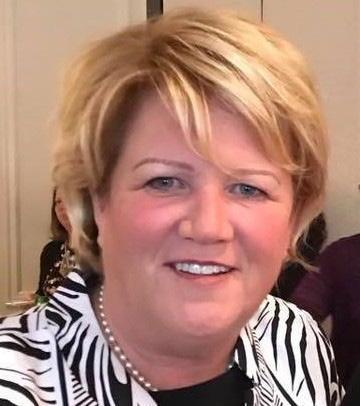
“I am truly honored to be selected for induction as a Fellow in the American Academy of Nursing,” Dr. Collins-Fulea said. “The Academy is highly regarded for its longstanding commitment to promote and
advocate for the nursing profession. I look forward to doing my part to help forward the Academy’s mission.”
The Academy serves the public by advancing health policy and practices through the generation, synthesis, and dissemination of nursing knowledge. Academy Fellows are inducted into the organization for their extraordinary contributions to improving health locally and globally. With more than 2,900 Fellows, the Academy represents nursing’s most accomplished leaders in policy, research, administration, practice, and academia.
“As the American Academy of Nursing’s President, it gives me great pride to announce the largest class of Fellows since the organization began nearly 50 years ago,” said Kenneth R. White, Ph.D., RN, AGACNP, ACHPN, FACHE, FAAN. “At a time when investments in, and policy to address, health equity, innovation, and access are paramount, the Academy is thrilled to welcome these dynamic and courageous nurse leaders who will support our collective vision of healthy lives for all people. Induction into the Academy is a powerful moment in a nurse’s career. When we gather this fall to award the Fellowship credential, I look forward to celebrating each Fellow’s incredible accomplishments that have improved the well-being of communities across the globe.”
2022 PRESIDENT’S REPORT | 53
Assistant Professor Catherine CollinsFulea, DNP, CNM, FACNM
Through a competitive and rigorous application process, the Academy’s Fellow Selection Committee, which is comprised of elected and appointed Fellows, reviewed a record number of applications, representing a 30% increase from the previous year, ultimately selecting the 2022 Fellows based on their contributions to advance the public’s health. Induction into the Academy is a significant milestone in which past and current accomplishments are honored by colleagues within and outside the profession.
FNU Faculty Honored With DAISY Awards
Jean Johnson CoAuthors Advancing Healthcare Quality and Safety: Protecting Patients, Improving Care
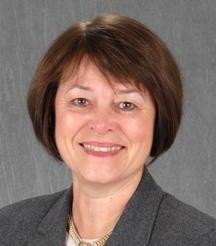
FNU Board of Directors member Dr. Jean Johnson, Ph.D., RN, FAAN, has coauthored a book with L. Gregory Pawlson entitled Advancing Healthcare Quality and Safety: Protecting Patients, Improving Care.
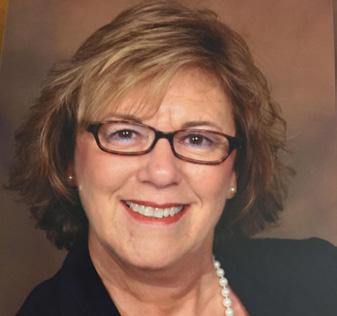
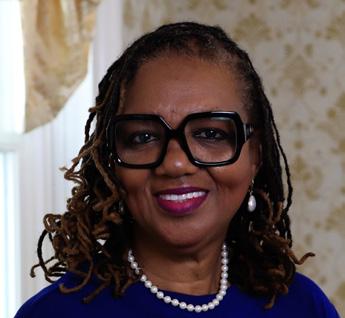
as a textbook in courses for nurses, medical students, residents and fellows, physician assistants, physical therapists, public health and other graduate health science students as well as for practicing clinicians in the health professions.”
A member of the FNU Board of Directors since 2015, Dr. Johnson’s career focus has aligned with the FNU mission. “Preparing excellent advanced practice nurses to advocate and care for populations that are traditionally underserved, whether rural or urban is critical to the health of all populations,” she said. “I also like being part of an organization that is willing to take risks to keep moving the mission and vision forward.”
FNU Chief Diversity and Inclusion Officer Dr. Paula Alexander-Delpech, Ph.D., PMHNP-BC, APRN, and Associate Professor Dr. Vicky Stone-Gale, DNP, APRN, FNP-BC, FAANP, FNAP, were both honored as winners of the 2022 DAISY Award for Extraordinary Faculty. This award is presented by the DAISY Foundation, with “the intent to honor nursing faculty who inspire their students always to remember that nursing is much more than tasks and technology. These faculty help ensure that the art, as well as the science of nursing, are brought to every patient experience.”
Available for purchase on numerous sites, the book is described as “an up-to-date course-linked textbook that addresses the core concepts of quality and safety in healthcare. Co-authored by two experts from different disciplines, the text is written in one voice, providing continuity and a progression of understanding among chapters. Quality and safety are presented using scientific principles as well as practice tools and established evidence-based methodologic approaches to quality and safety issues. Examples and cases are provided throughout to illustrate key concepts and to stimulate classroom or online discussion. Ideal
Dr. Johnson is dean emerita and professor of nursing at George Washington University (GW). As founding dean of the GW School of Nursing, she developed multiple programs, including one of the university’s first online programs. She also served as the interim executive director of the Center for Health Policy and Media Engagement. A longtime geriatric nurse practitioner, Dr. Johnson focused her research and policy work on patient safety, quality improvement, and online education. She was a Fulbright scholar teaching in the graduate clinical pediatric program at the University of Cape Town South Africa and Red Cross Children’s Hospital.
54 | 2022 PRESIDENT’S REPORT News, Events and
Awards
Dr. Paula AlexanderDelpech
Dr. Vicky Stone-Gale
Peter Schwartz Elected Chair of Council on Ethical and Judicial Affairs
FNU Board of Directors member Peter A. Schwartz, MD, was elected as Chair of the American Medical Association’s (AMA) Council on Ethical and Judicial Affairs for a one-year term. The Council is responsible for creating medical ethical guidelines for physicians and for disciplining physicians who practice outside of those guidelines. The AMA is the
nation’s largest medical organization, with over 240,000 members.
Dr. Schwartz has been a member of the Council on Ethical and Judicial Affairs since 2016. As part of FNU’s Board of Directors, Dr. Schwartz serves on the Finance Committee and the Frontier Nursing Service Foundation Board of Directors.
Dr. Schwartz is Chair Emeritus of Obstetrics and Gynecology (OB/GYN) at Reading Hospital – Tower Health. During his tenure at Reading Hospital,
Dr. Schwartz served as Chair, OB/ GYN from 1987 to 2005 and again from 2012 to 2014. He also served as Chair of Reading Hospital’s Ethics Committee and the American College of Obstetricians and Gynecologists Ethics Committee.
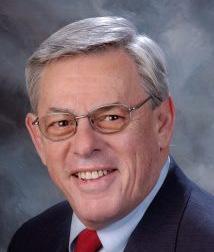
Dr. Schwartz is also a member of the Ethiopian Society of Obstetricians and Gynecologists, having helped them create their first code of medical ethics and returning twice annually to teach medical ethics.
FNU Contributes to Tornado and Flood Relief Funds
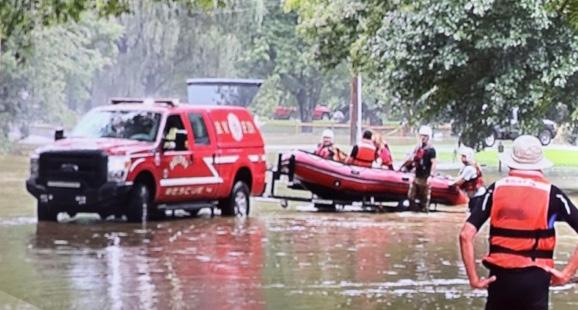
At the end of 2021, and again in the middle of 2022, FNU’s home state of Kentucky was hit by two devastating events. First, on December 10, 2021, an F-4 tornado struck western Kentucky and was on the ground for 165 miles. The tornado created catastrophic damage in numerous towns in the western part of Kentucky.
A total of 78 Kentuckians were killed by the tornado, which also destroyed more than 1,000 homes and buildings. Then, in late July 2022, eastern Kentucky suffered massive flooding that resulted in over 30 deaths and the loss of homes, places of work, places of worship, and more.
In response to both of these disasters, FNU set up fundraisers and solicited the support of all members of the FNU community. Every dollar was donated to the respective relief funds established by Kentucky Governor Andy Beshear. In total, FNU collected and donated over $4,000 to the Team Kentucky Tornado Relief Fund and $6,500 to the Team Kentucky Flood Relief Fund. In conjunction with Hyden, Kentucky, Mayor Carol Joseph, FNU also publicized an Amazon Wish List for the victims of the floods, with all donations sent directly to the government offices in Hyden for distribution to those in need.
2022 PRESIDENT’S REPORT | 55
2023 Strategic Plan
Goal 1: Continue to develop, evaluate, and improve programs and services that further our mission.
Objective 1: Begin recruiting eligible alumni into the cDNP program.
Objective 2: Prepare for successful reaccreditation of the nurse-midwifery program with ACME.
Objective 3: Evaluate the feasibility of expanding current programs.
Objective 4: Develop a Continuing Education model
Objective 5: Explore the development of a primary care clinic/faculty practice.
Goal 2: Create an environment that promotes diversity, equity and inclusion, and promotes the success of all community members.
Objective 1: Increase the percentage of students, faculty, staff, (preceptors), Board of Directors, and administrators from racially and other underrepresented groups and rural communities.
Objective 2: Advance a culture of inclusivity that is respectful and engaging for all.
Objective 3: Ensure a curriculum that includes concepts related to diversity, equity and inclusion.
Objective 4: Implement a universitywide retention strategy focusing on student achievement and timely completion.
Objective 5: Increase retention of all employees, including faculty and staff.
Goal 3: Build strategic relationships and partnerships with clinical sites and preceptors, focusing on rural areas.
Objective 1: Implement data-driven incentives to increase the number of Alumni who become preceptors.
Objective 2: Investigate opportunities to partner with health systems to expand FNU’s clinical site network.
Objective 3: Use resources more effectively to connect students with preceptors and clinical sites.
56 | 2022 PRESIDENT’S REPORT
Goal 4: Continuously improve and maintain facilities to meet the needs of students, faculty, and staff.
Objective 1: Expand campus resources and enhance operational excellence by providing resources to maximize and facilitate efficient use of Campus space.
Objective 2: Develop an environmental sustainability plan for the Versailles Campus.
Objective 3: Create a physical environment on campus that supports a diverse and inclusive climate.
Goal 5: Use technology to ensure improvement and attainment of service excellence to the community.
Objective 1: Implement Student Information System.
Objective 2: Assess, evaluate, and align current software portfolio across FNU Community.
Objective 3: Assess IT Organization to meet current and future demands.
Objective 4: Conduct Comprehensive Cybersecurity review.
Goal 6: Ensure the financial strength and growth is sufficient to meet the needs of the university.
Advancement
Objective 1: Grow financial support to supplement tuition revenue.
Objective 2: Relaunch the Courier Program to serve the Versailles and local community.
Objective 3: Brand FNU as a leader in nurse-midwifery and advanced practice nursing education nationally.
Finance
Objective 4: Pursue alternative revenue streams that align with the FNU mission
Objective 5: Refine formal policies and procedures for accounts payable.
Objective 6: Establish Key Performance Indicators (KPIs) and reporting to assess the financial health of the university.
2022 PRESIDENT’S REPORT | 57
2050 Lexington Road
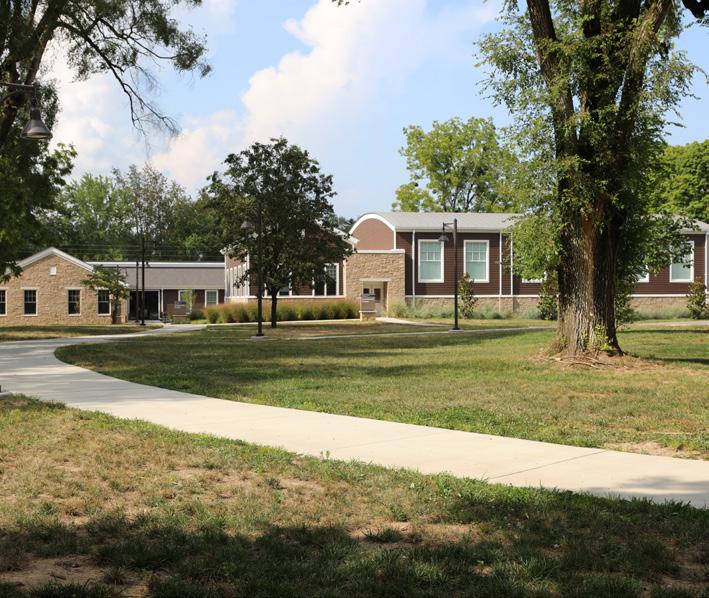

Versailles, KY 40383
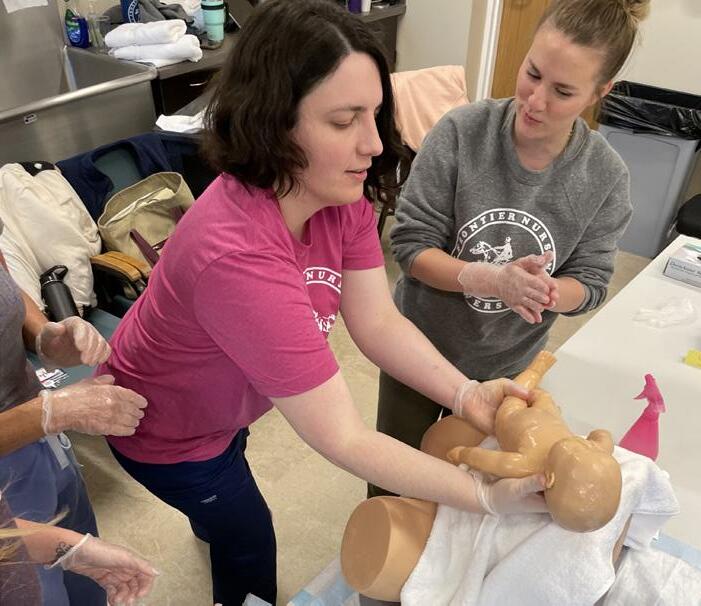

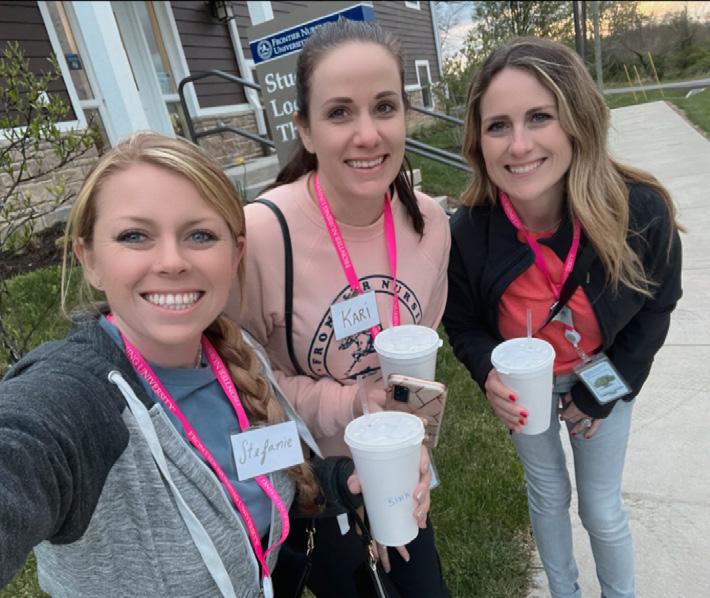
2050 Road KY 40383
Frontier.edu
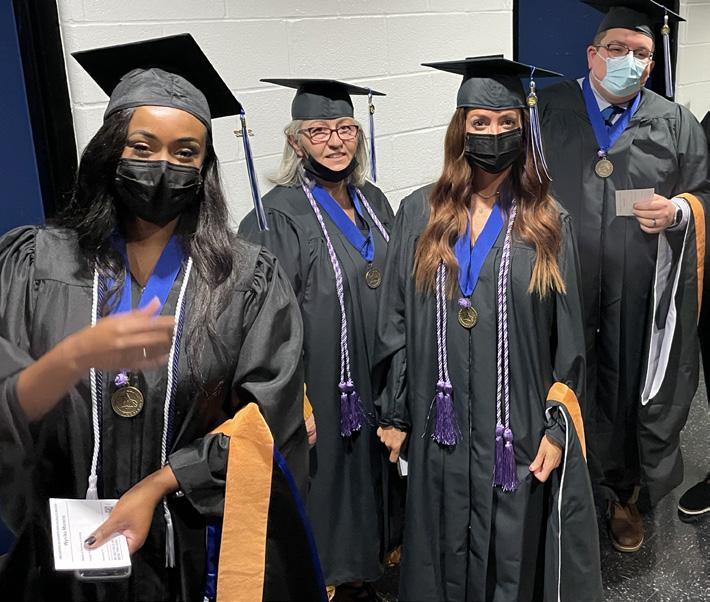
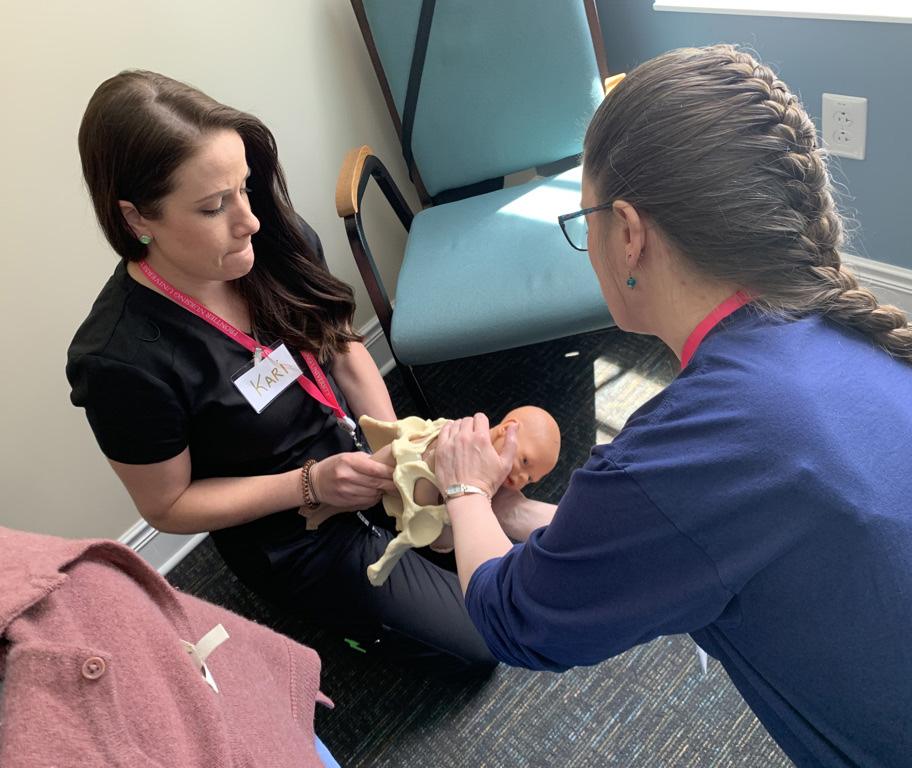
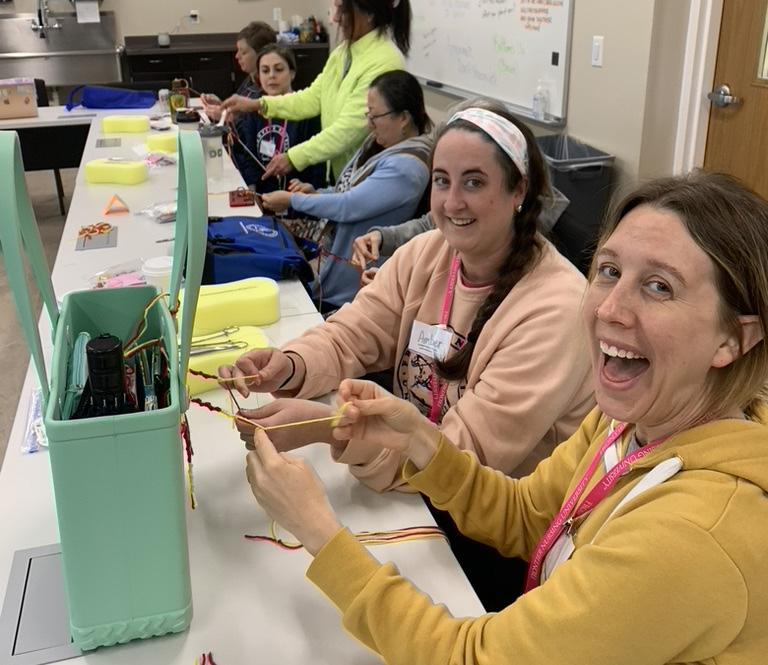

















































 – Robin Argyle, FNP
– Robin Argyle, FNP


 FNU student Michelle Hoang (left) with preceptor and FNU alumnus Robin Argyle, FNP
FNU student Michelle Hoang (left) with preceptor and FNU alumnus Robin Argyle, FNP


























































































